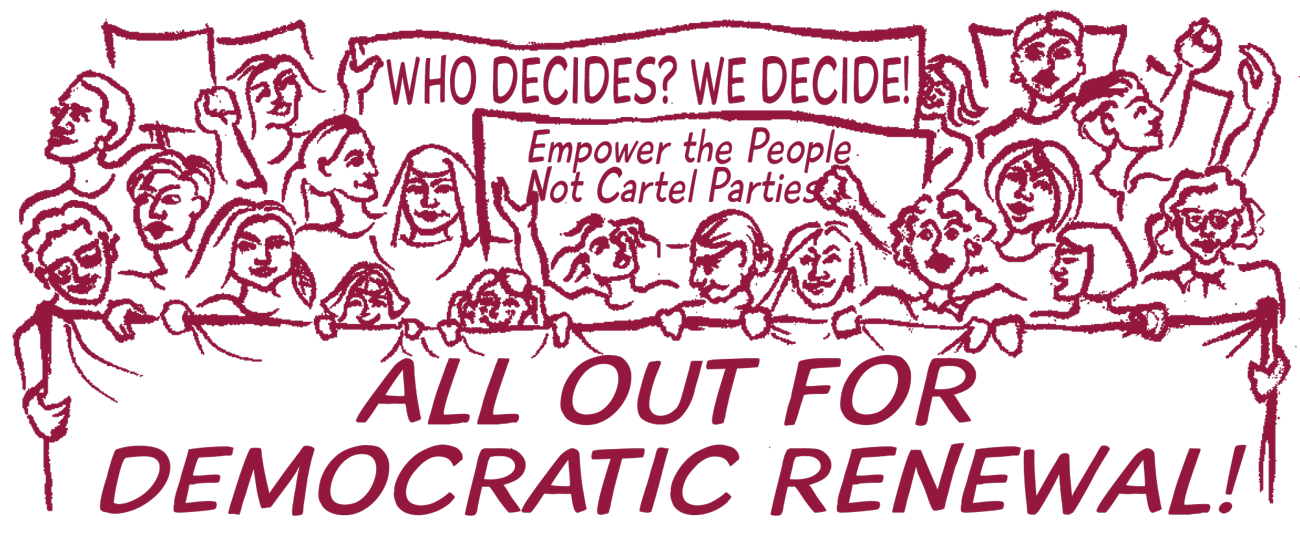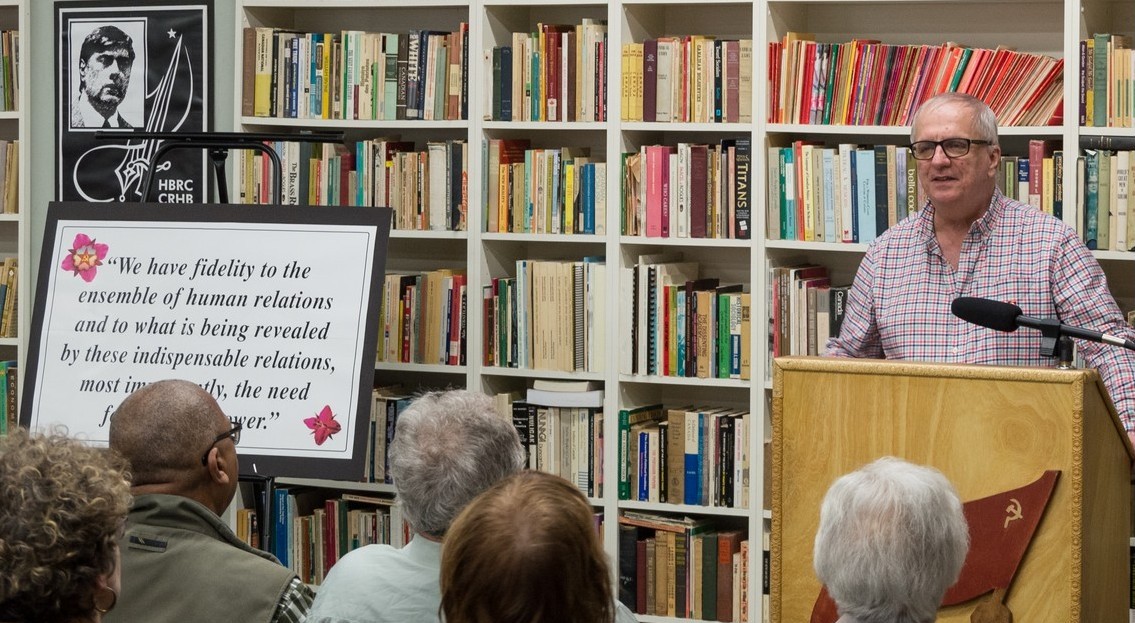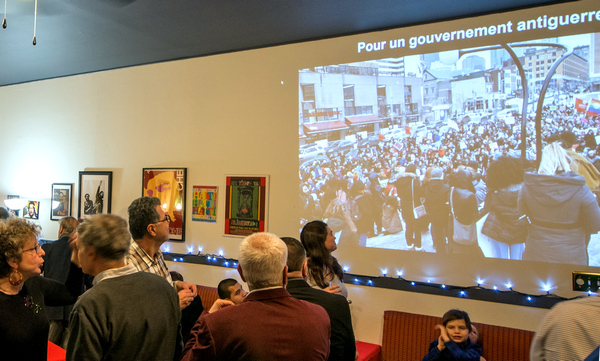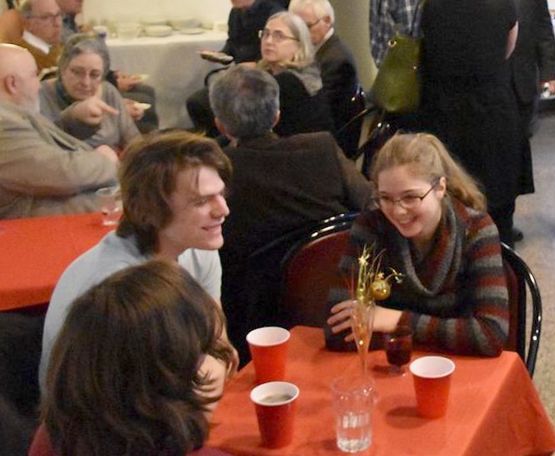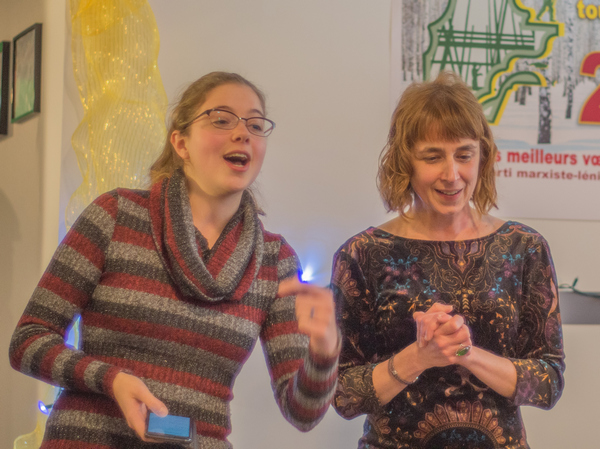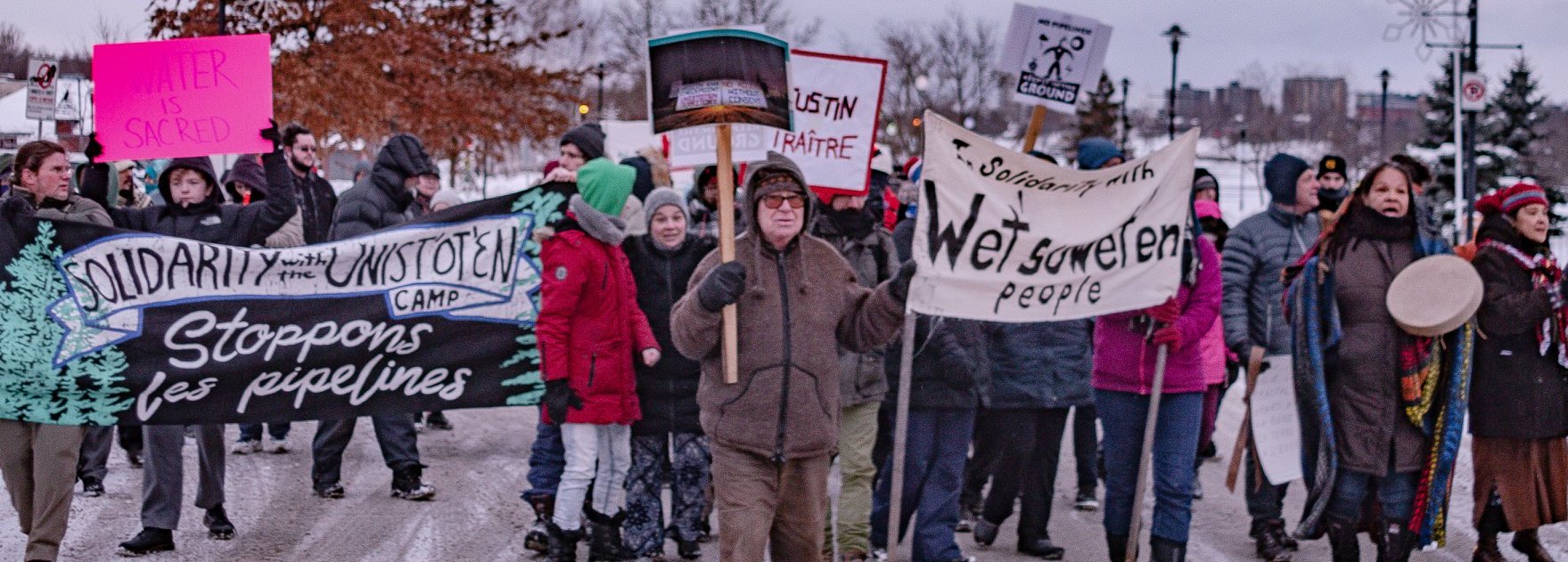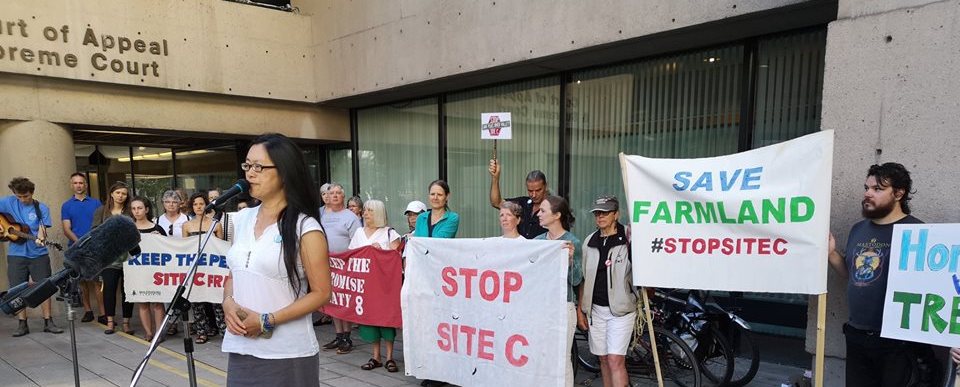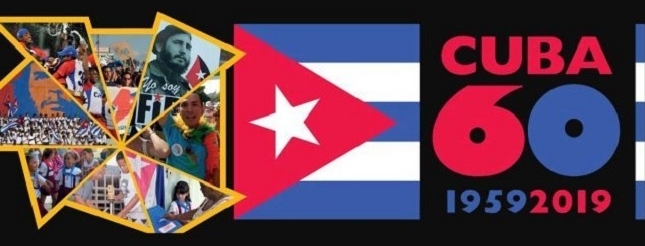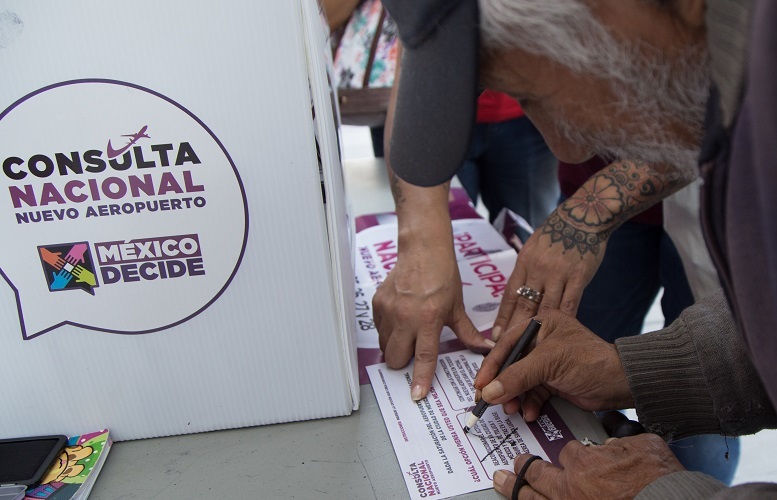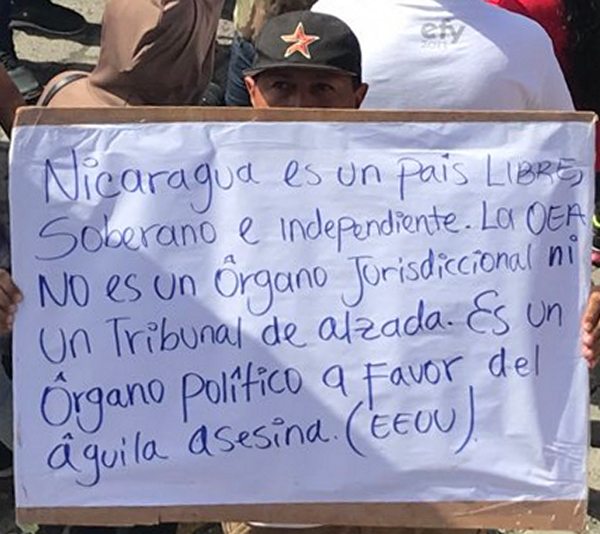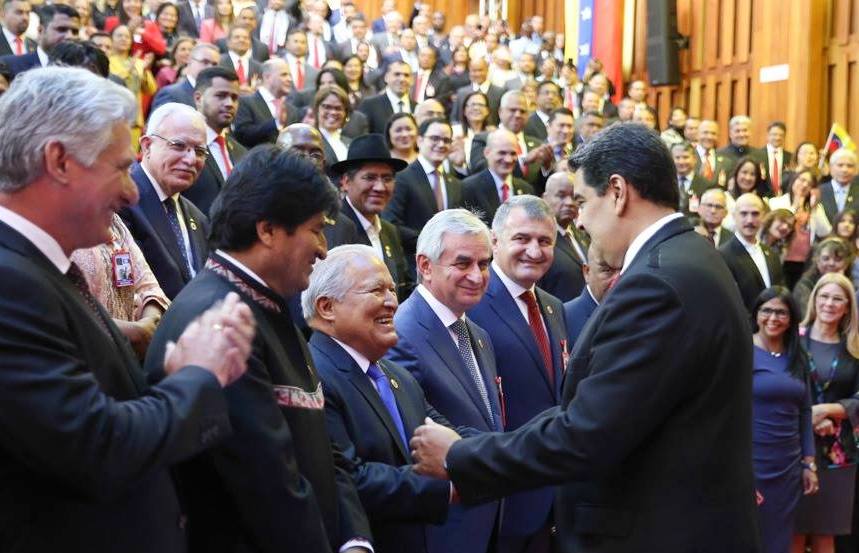
|
January 19, 2019 - No. 1 Marxist-Leninists Prepare for the New Year In 2019, Let
Everyone Take Up Politics of Social Responsibility and Speak
Marxist-Leninists Prepare for the
New Year In 2019, Let Everyone Take Up Politics of Social Responsibility and Speak in Their Own Name CPC(M-L) will continue to oppose diversions such as the claim that working people are responsible for electing reactionary governments which claim mandates to pay the rich and attack the rights of the people. All of this is to hide what the ruling elites are up to and the crimes they are committing at home and abroad. It is disinformation which seeks to deprive the people of their own outlook. It can be countered by implementing programs which favour the interests of the working class and people and resolve the crisis in their favour. In 2019, the work to support the just causes of the peoples of the world and to make Canada a Zone for Peace continues to stand second to none. 2019 is also an election year. CPC(M-L) has decided to participate in the 2019 federal election by fielding at least as many candidates as it did in the 2015 election. It calls on Canadians to bring forward a modern democratic personality and defy the totalitarian democracy which has been introduced in the name of national security and defending our democratic institutions. The laws which are either already passed or are before Parliament violate our collective right to conscience. With these laws a dangerous precedent is being set. What conscience the collective is "allowed" to have is being determined by laws -- both those that strengthen the powers of the national security police and the electoral law itself which introduces concepts of Canadian citizens being targeted as potential "agents or mandatories" of foreign powers.
The Collective Right to ConscienceThe collective right to conscience is a fundamental right without which all other rights have no meaning. The hallmark of a modern democratic state is that it must enshrine the right to conscience of the collective in its fundamental law so that every citizen and resident can enjoy this right without fear of punishment or reprisals. In the name of opposing fake news, and foreign influence in the political and electoral process, the entire polity is the target of disinformation which inhibits organizing to change the direction of the economy and to humanize the natural and social environment. In this election year we need to fiercely affirm the right to speak freely and express opinions, participate in acts of solidarity and support all those who exercise their right to make the claims on society that affirm their right to be and permit them to carry out their duties. The parties which form a cartel party system to keep the people disempowered, and the media, polling agencies, think-tanks and the government itself have embarked on a merciless ideological offensive which violates the right to conscience. It is aimed at browbeating the people into voting in a particular way for a particular aim -- the aim of maintaining the status quo and entrenching the anti-social offensive to pay the rich with impunity. At the same time, because of Canada's integration into the U.S. economy, war machine and Homeland Security, these forces are caught up in the civil war which is raging within the United States itself. Besides tons of money, much of it from the public purse, the tools of the electoral machines which the ruling class has put in place include the ideological offensive. Ideas about "strategic voting," "the lesser of evils," "winnability," "left vs. right" and similar arguments are put forward to coerce a vote for one of the parties that form the cartel party system. These parties are desperate to claim a "mandate"which has the consent of the governed. Far from elections conferring a "mandate," the campaigning which has already begun and the self-serving changes to the electoral law contribute to the perception that the ruling elite are cynical and self-serving. Character assassination, the "rumour mill" and false claims constitute a straightforward attack on the people's right to conscience. The aim is to influence the vote on the basis of campaigns that amount to no more than an exercise in deceit and gangster-like activity. What is called "campaigning" is illusion-making and diversion from the key issue of how to end the anti-social offensive. It is to mobilize the workers and collectives of the people as vote banks to get the so-called major parties into power and keep the workers out of power. This in no way restores confidence in the electoral system or a system called representative democracy. In this system, the vote does not count because the people do not decide any aspect of the process, from how candidates are selected to the agendas which are declared to represent what they want. It is not the people who confer mandates on governments which do whatever the international financial oligarchs and the U.S. imperialists and their NATO aggressive military alliance demand of them. They appease the warmongers by claiming to act in our name to defend peace, freedom, national security, the rule of law and human rights. Their propaganda is to dismiss the people who are striving to occupy the space for change which has presented itself in Canada and around the world at this time. This is why everything is geared to making sure no discussion takes place on the crucial issues of concern on the front of the economy, the social and the natural environment, the claims people are entitled to make on society by right and all matters of war and peace. The fact that the people constitute a polity within which each is equal has long been forgotten. Instead, pressure is directed at the conscience of each person to accept a category called voters who are presented with the duty to vote even though they know their vote does not count. The disenchantment of the people with the current electoral set-up is very profound. As the crisis of confidence in government continues to deepen, the legitimacy of government continues to be questioned. Instead of renewing the democracy, governments are passing laws which violate the right to conscience. Crimes against the people at home and abroad are made "legal" thereby creating an increasingly dangerous situation. Only the striving of the peoples the world over for empowerment can set things right.
There Is an Alternative! |
|
The Communist Party of Canada (Marxist-Leninist) condemns
the governments of both Canada and BC for treating the need to
respect the hereditary rights of the original peoples of this
country as a law and order matter. The precedent set by these
governments at Gustafsen Lake in 1995 is a crime yet to be
redressed and now another is to be committed.
In the current case of the dispossession of the
territories
of the Wet'suwet'en in northern BC, the elected chiefs and
councils of the five Wet'suwet'en bands have approved the
pipeline. They were established under the racist and colonial
Indian Act to
achieve the assimilation and dispossession of the
original peoples of this land. The hereditary chiefs, who are the
ones whose approval must be sought, have not given it. It is a
political matter which must be resolved politically. Instead, the
governments of Canada and BC are self-serving to the extreme.
They are serving private interests and claiming that the law is
neutral and must be permitted to take its course.
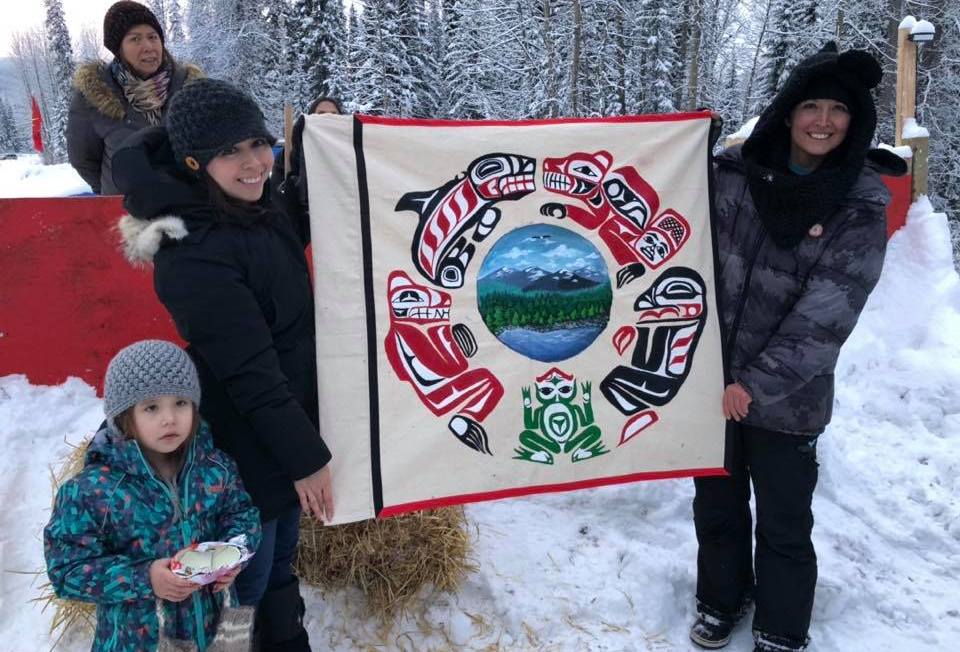
Five Wet’suwet’en clans represented at
Gidumt’en Access Point, January
6, 2018, before the
RCMP raid.
We join the call of the Union of BC Indian Chiefs, whose President, Grand Chief Stewart Phillip, stated without equivocation:
"We strongly condemn the RCMP's use of
intimidation,
harassment, and ongoing threats of forceful intervention and
removal of the Wet'suwet'en land defenders from Wet'suwet'en
unceded territory. In continuing to aggressively threaten the
Wet'suwet'en with eviction from their own Title land, the
governments of Canada and British Columbia are blatantly ignoring
the Supreme Court of Canada's precedent-setting Delgamuukw case
which confirmed that the Wet'suwet'en's Title and Rights have
never been extinguished. The RCMP's actions are in direct
contradiction to both governments' stated commitments to true
reconciliation, and to full implementation of the United Nations
Declaration on the Rights of Indigenous Peoples which is a global
human rights standard. We demand that Canada and BC call on the
RCMP and Coastal GasLink to respect the Unist'ot'en/Giltseyu-Dark
House on unceded lands. The provincial and federal governments
must revoke the permits for this project until the standards of
free, prior and informed consent are met."
We call on Canadians to demand that the governments of Canada and BC revoke the permits for the GasLink pipeline project until the standards of free, prior and informed consent are met. Join in the solidarity actions across Turtle Island and around the world.
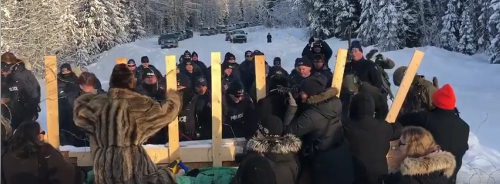
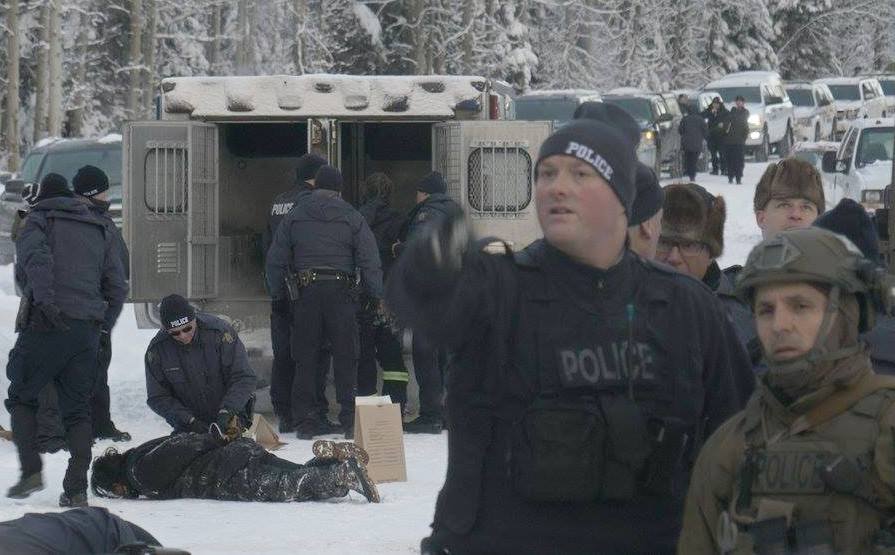
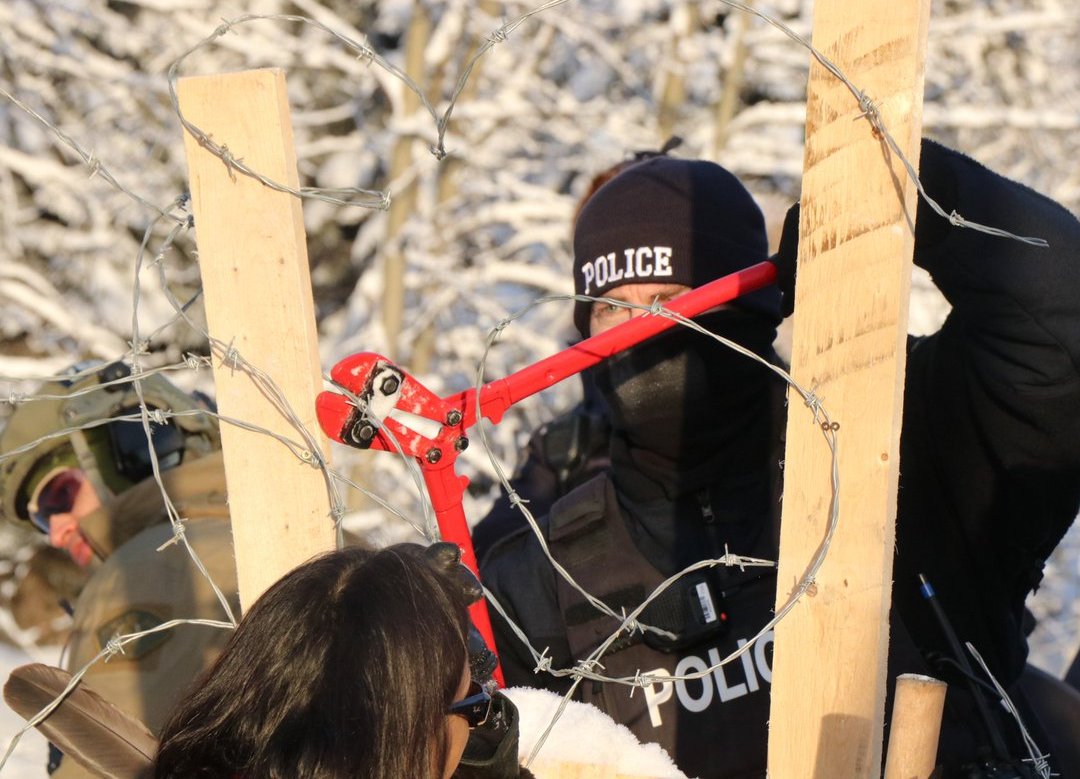
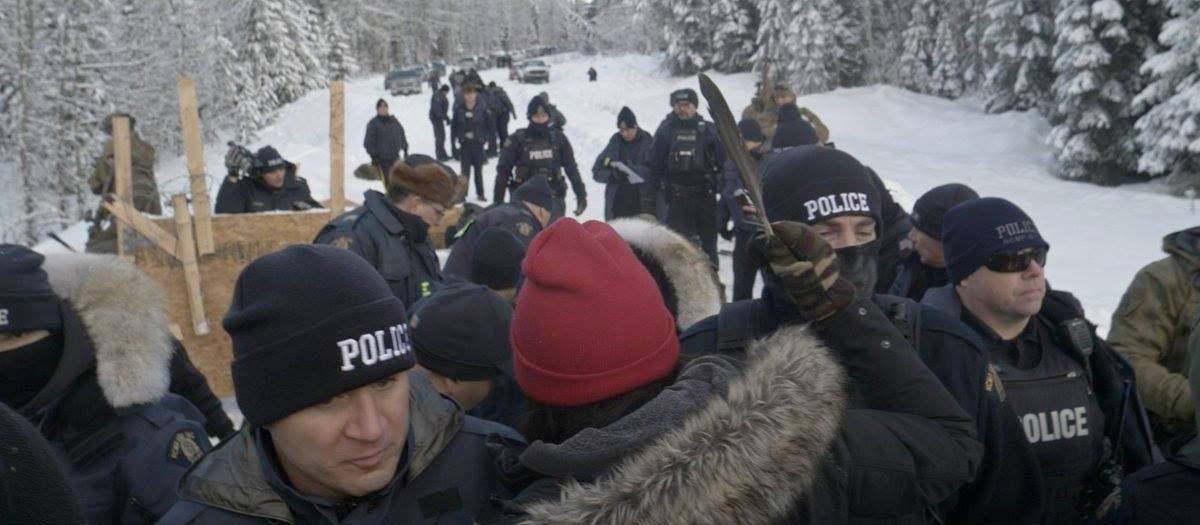
RCMP raid on Gidumt’en Access Point, January 7, 2018.
Actions
Across the
Country Say No! to
Attack on Land Defenders

The five Wet’suwet’en clans all oppose
the construction
of oil and gas pipelines in Wet’suwet’en territory.
In December, the
Gidimt’en, one of the five clans, set up a gate to strongly
support a
peaceful resolution at the Unist’ot’en camp 20 km
away, where Coastal
Gaslink wants to put the pipeline. On January 7 the RCMP
assaulted
those manning the checkpoint, claiming to enforce an injunction
acquired by Coastal Gas Link.
In cities, small towns and remote communities across the country,
Canadians, Quebeckers and Indigenous peoples immediately answered
the
call to hold a day of action January 8 to oppose the RCMP's
brutal
assault on the Wet'sewet'en land defenders and to stand with them
in
defence of their hereditary rights to their lands. A number of
actions
internationally condemned the Canadian state's treatment of
Indigenous peoples and demanding it uphold its responsibilities
under
the UN Declaration on the Rights of Indigenous Peoples.
Since the day of action, almost daily events have been organized
in one
place or another across the country and more are planned.
Whitehorse, YT
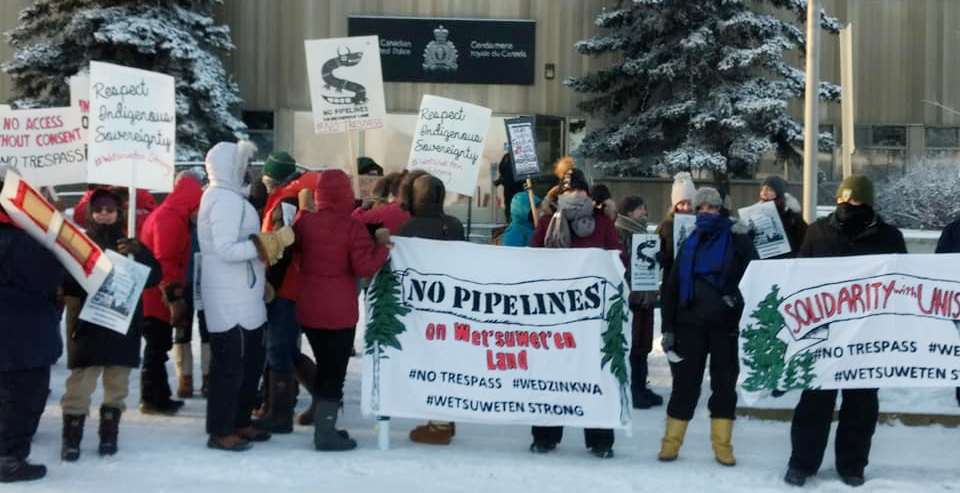
Haida Gwaii, BC
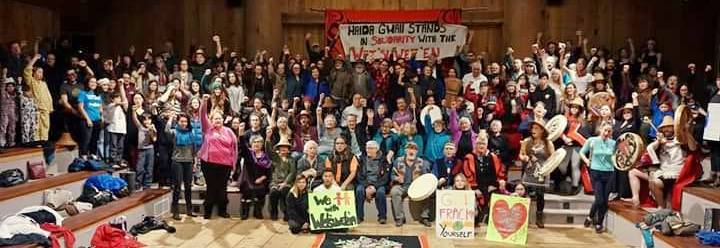

Hazelton, BC
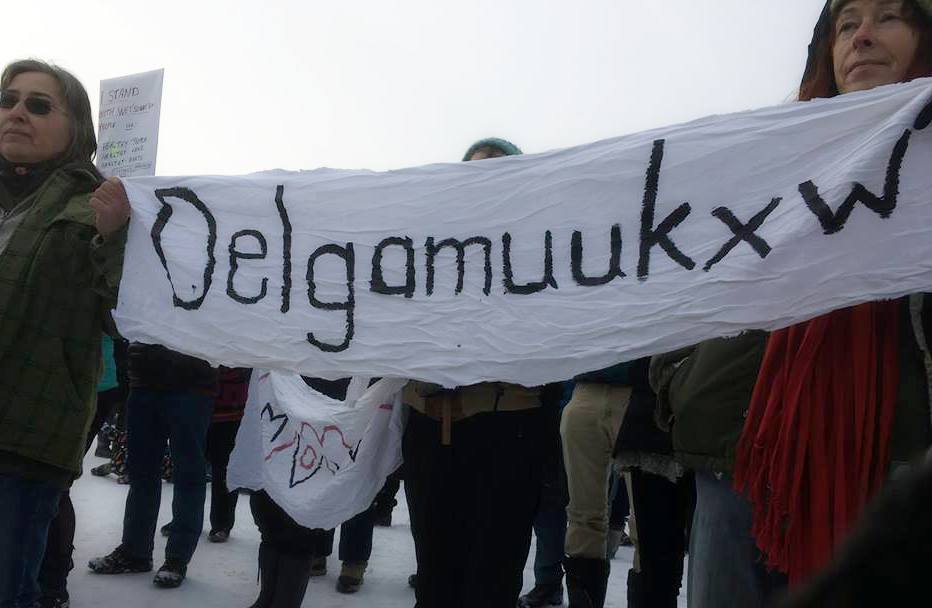
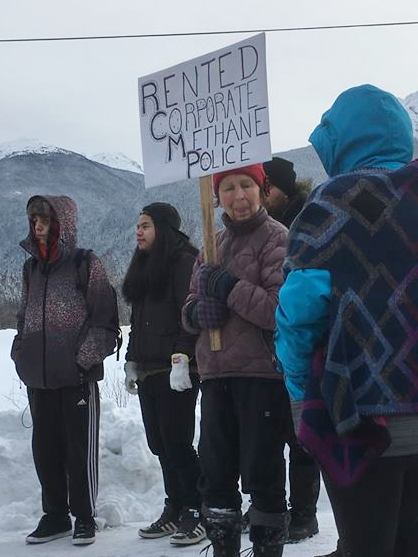
Smithers, BC
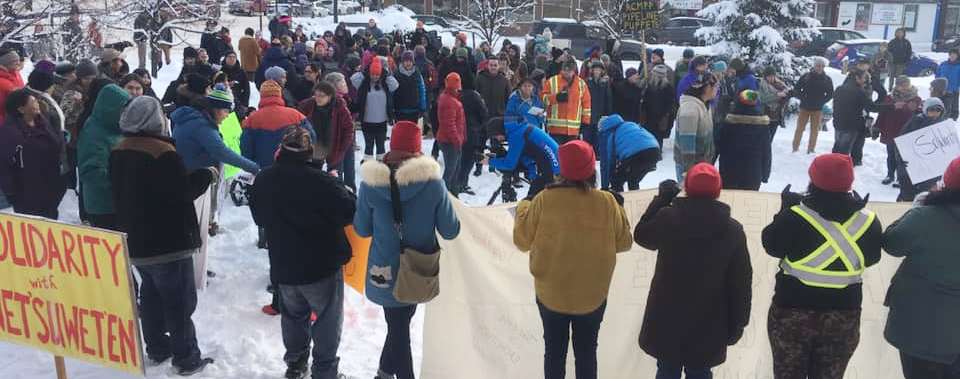
Prince George, BC
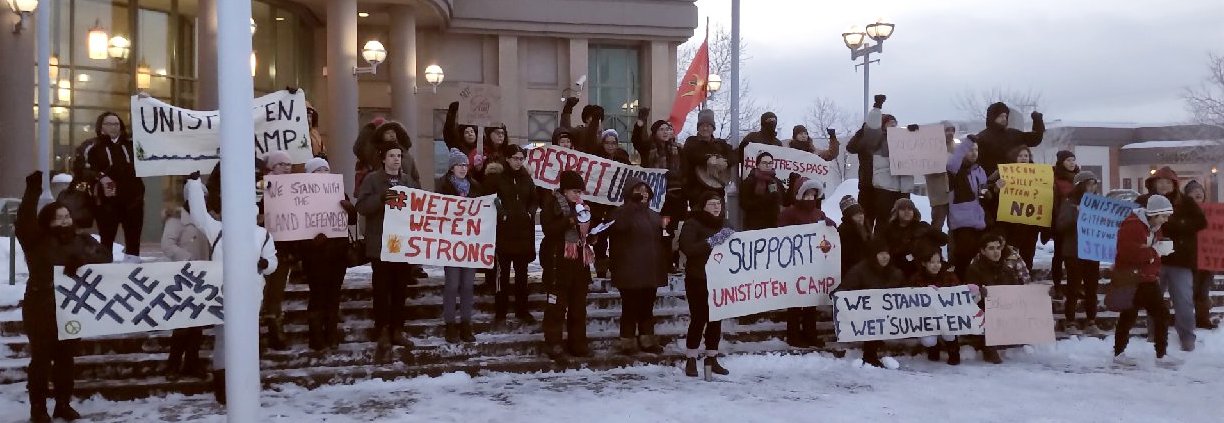

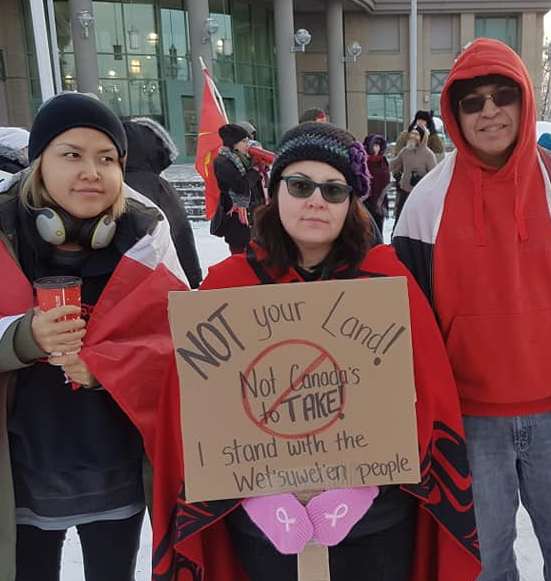
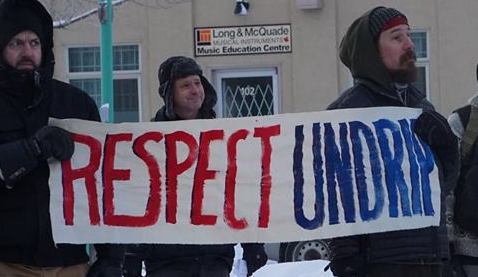
Terrace, BC

Bella Coola, BC

Cawston, BC

Chilliwack, BC
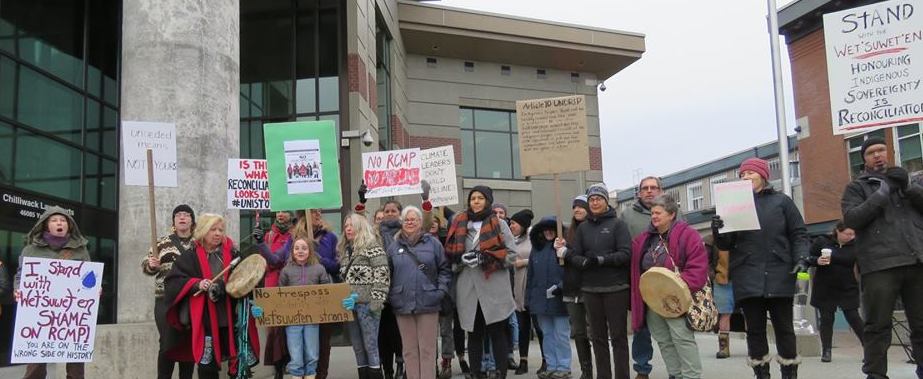
Powell River, BC
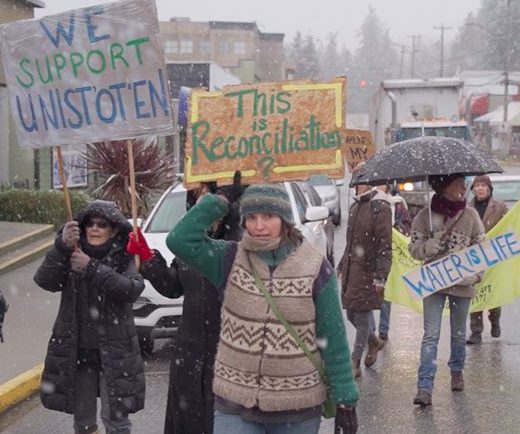
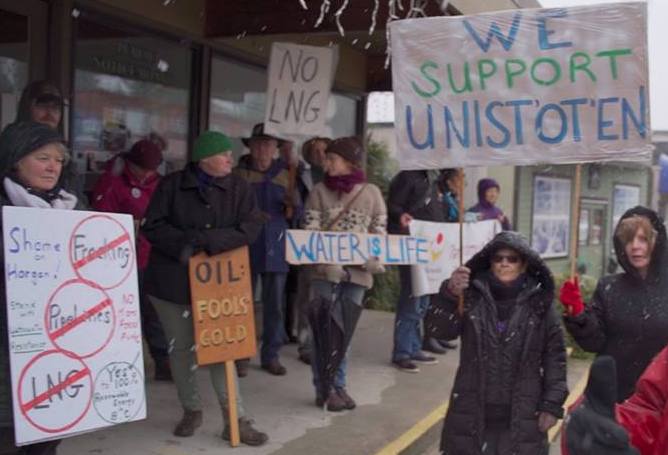
Sunshine Coast, BC
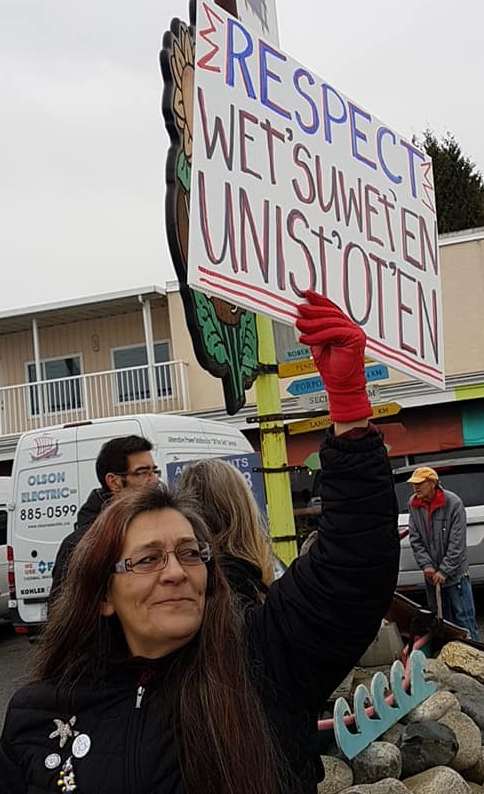
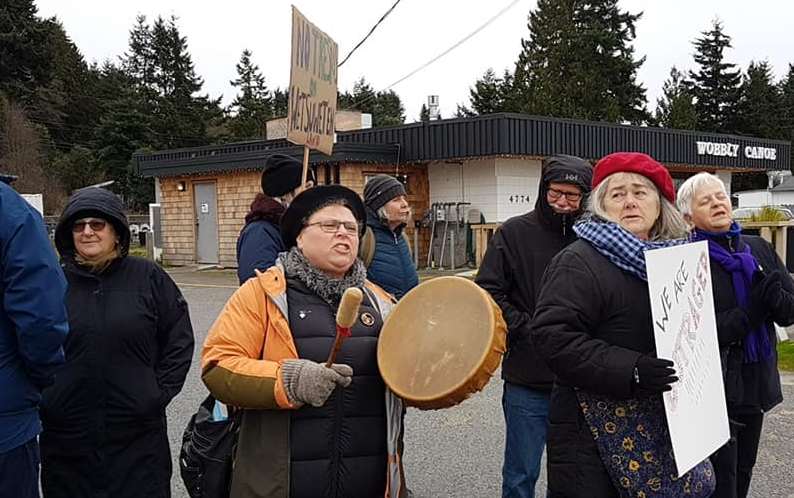
Gabriola Island, BC

Campbell River, BC
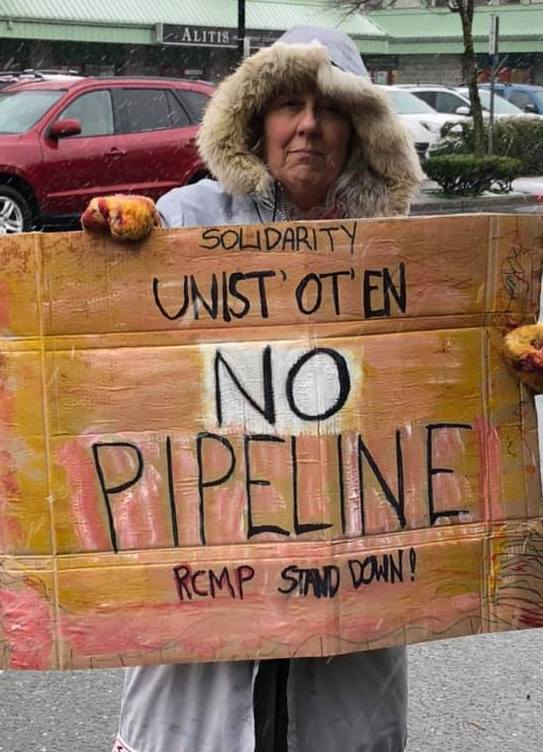
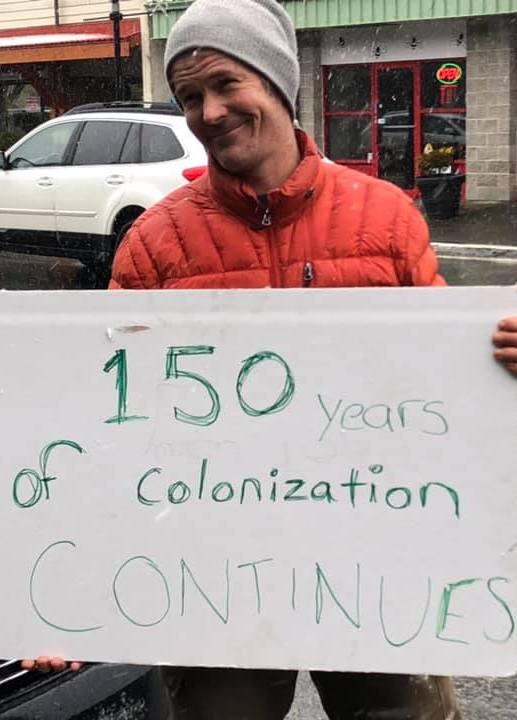
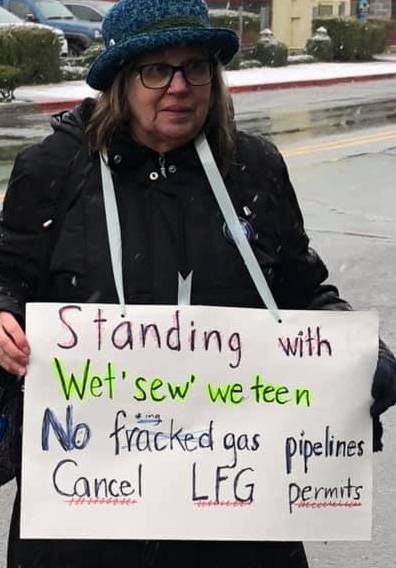
Courtenay, BC
Nanaimo, BC

Tofino, BC
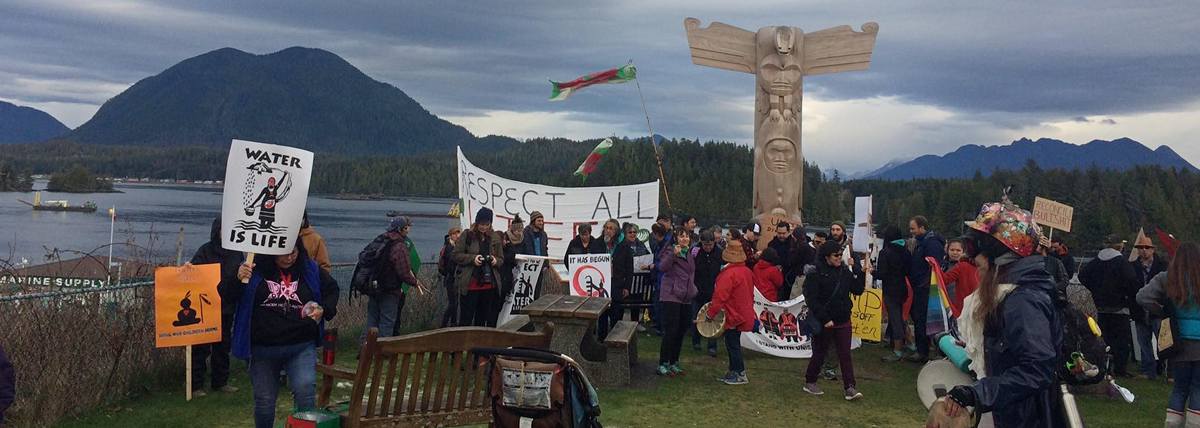
Victoria, BC, January 8

Victoria, BC, January 16
Vancouver, BC, January 8

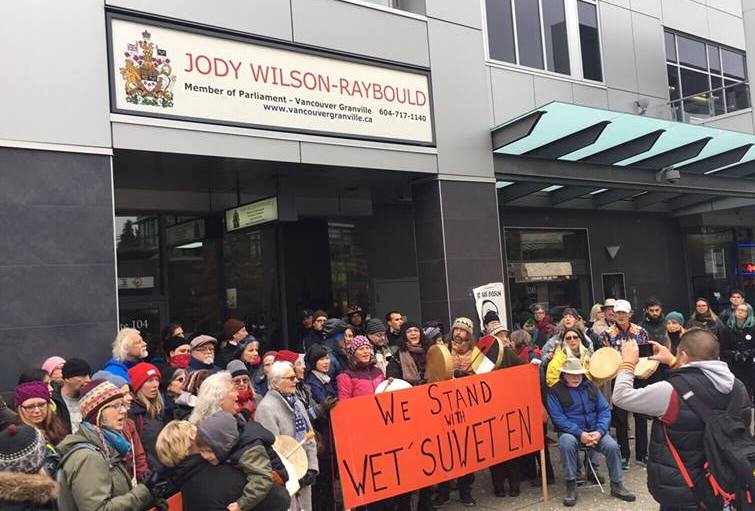
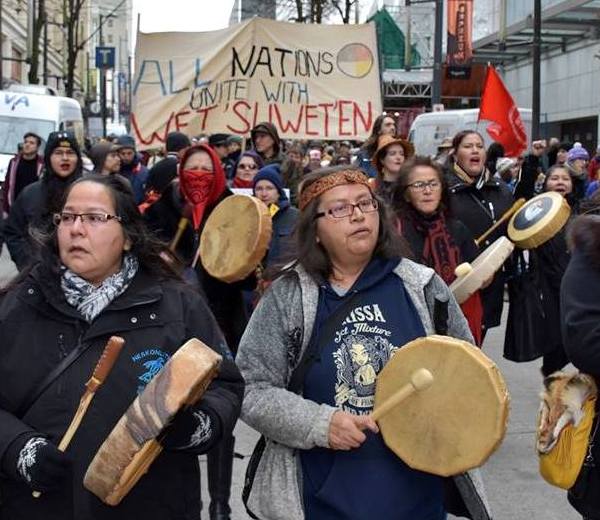
Vancouver, BC,
student
action, January 11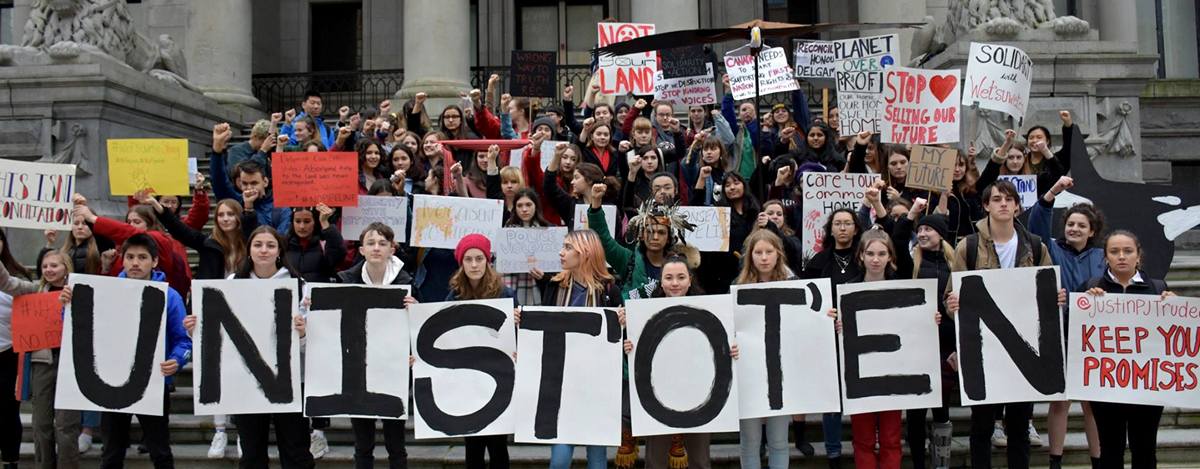
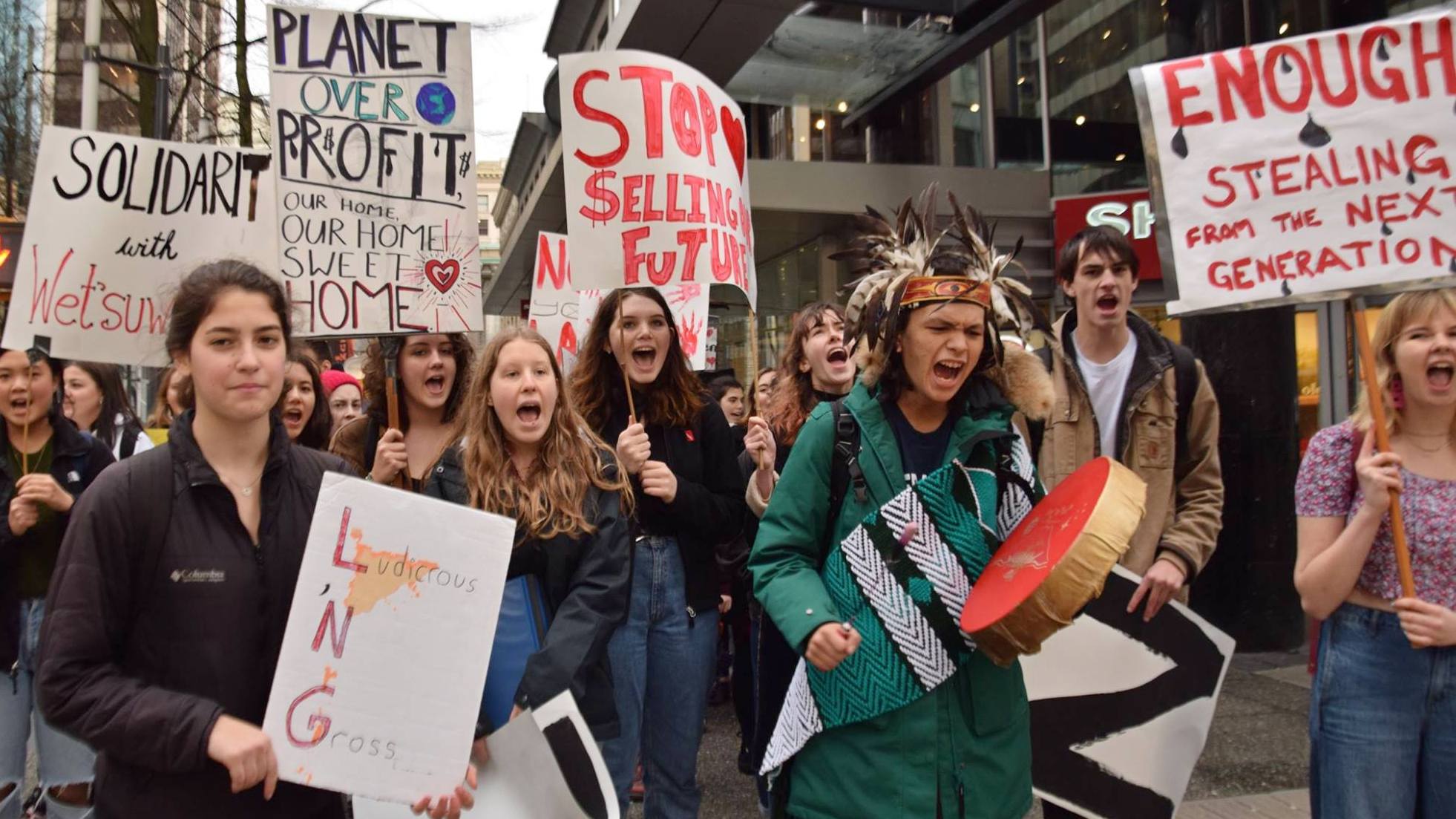
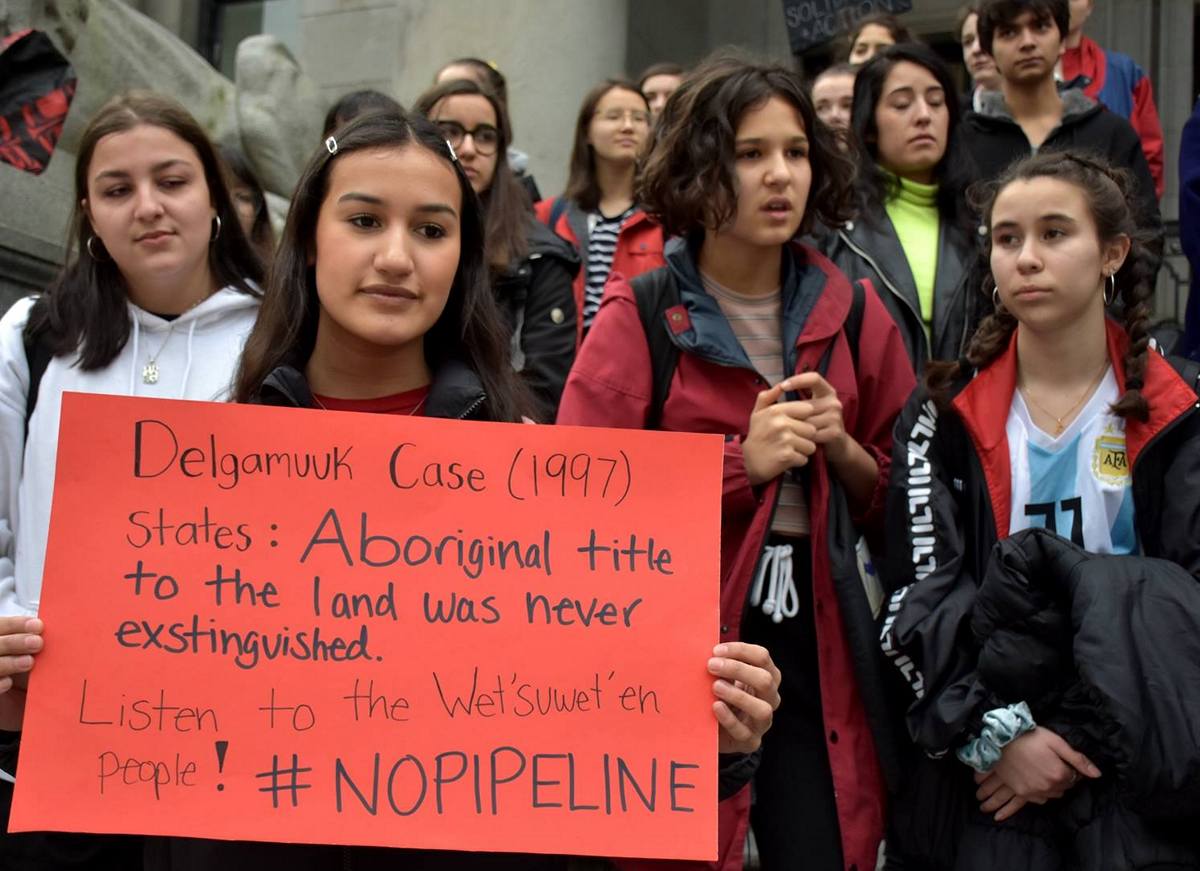
Vancouver, BC, January 12

Vancouver, BC, January 16

Calgary, AB
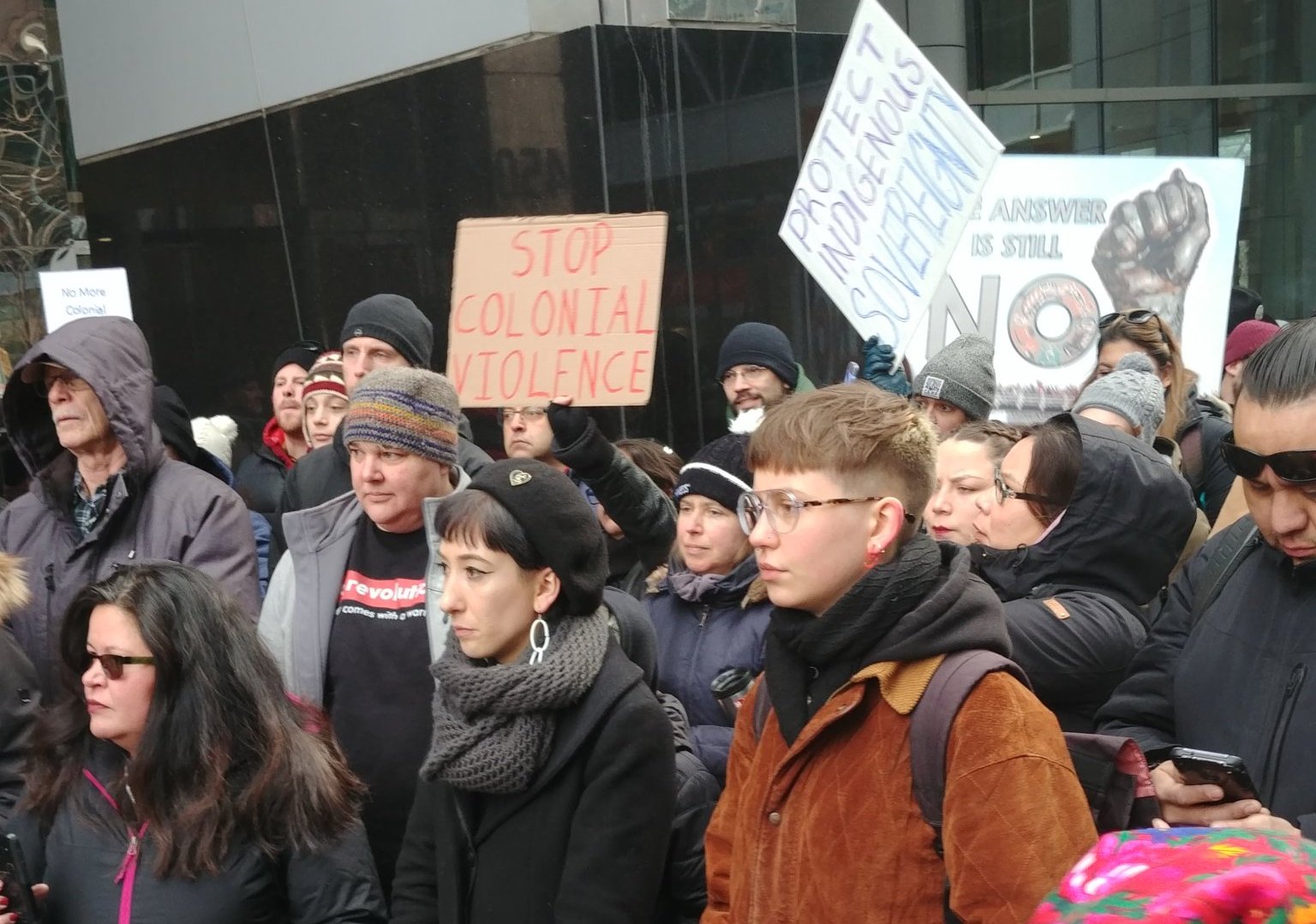
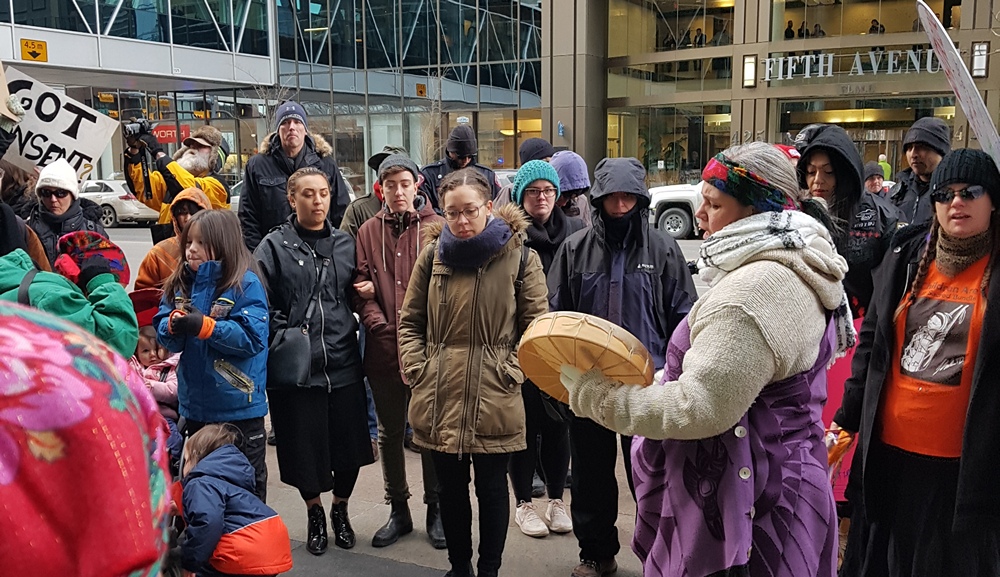
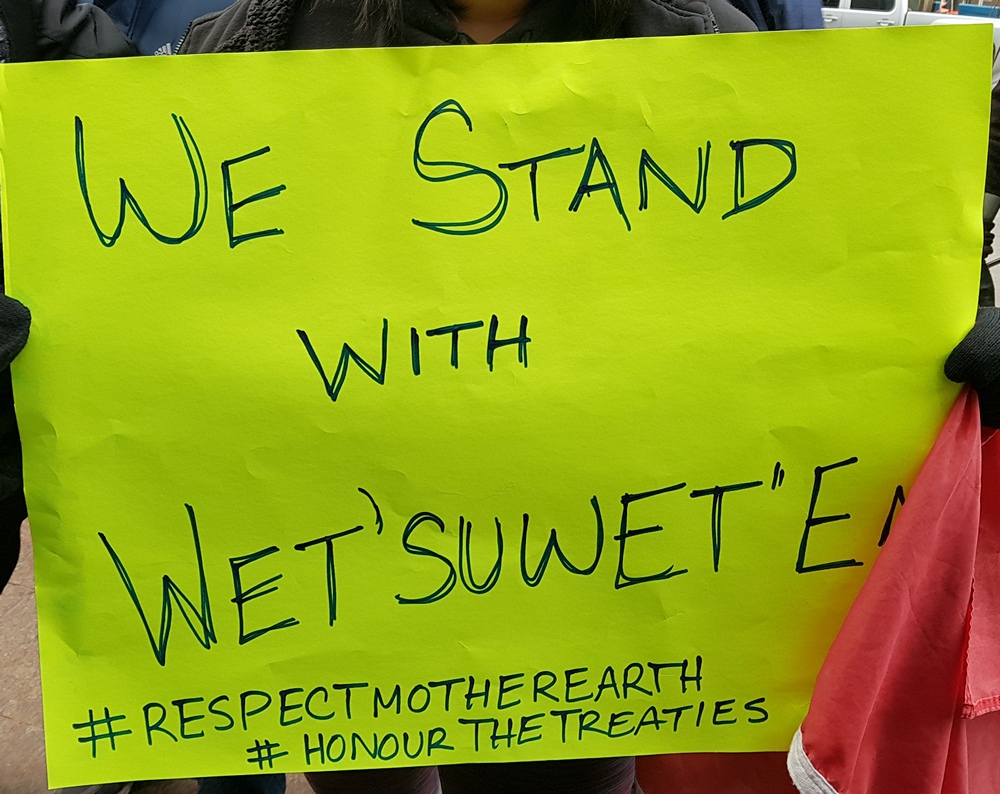
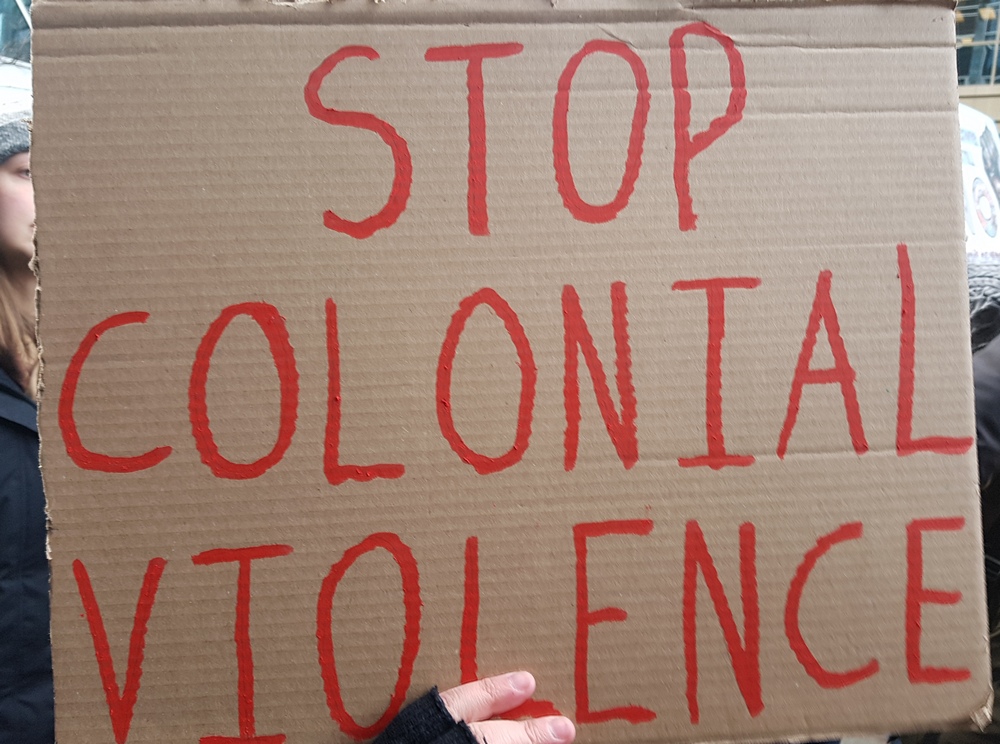
Edmonton, AB
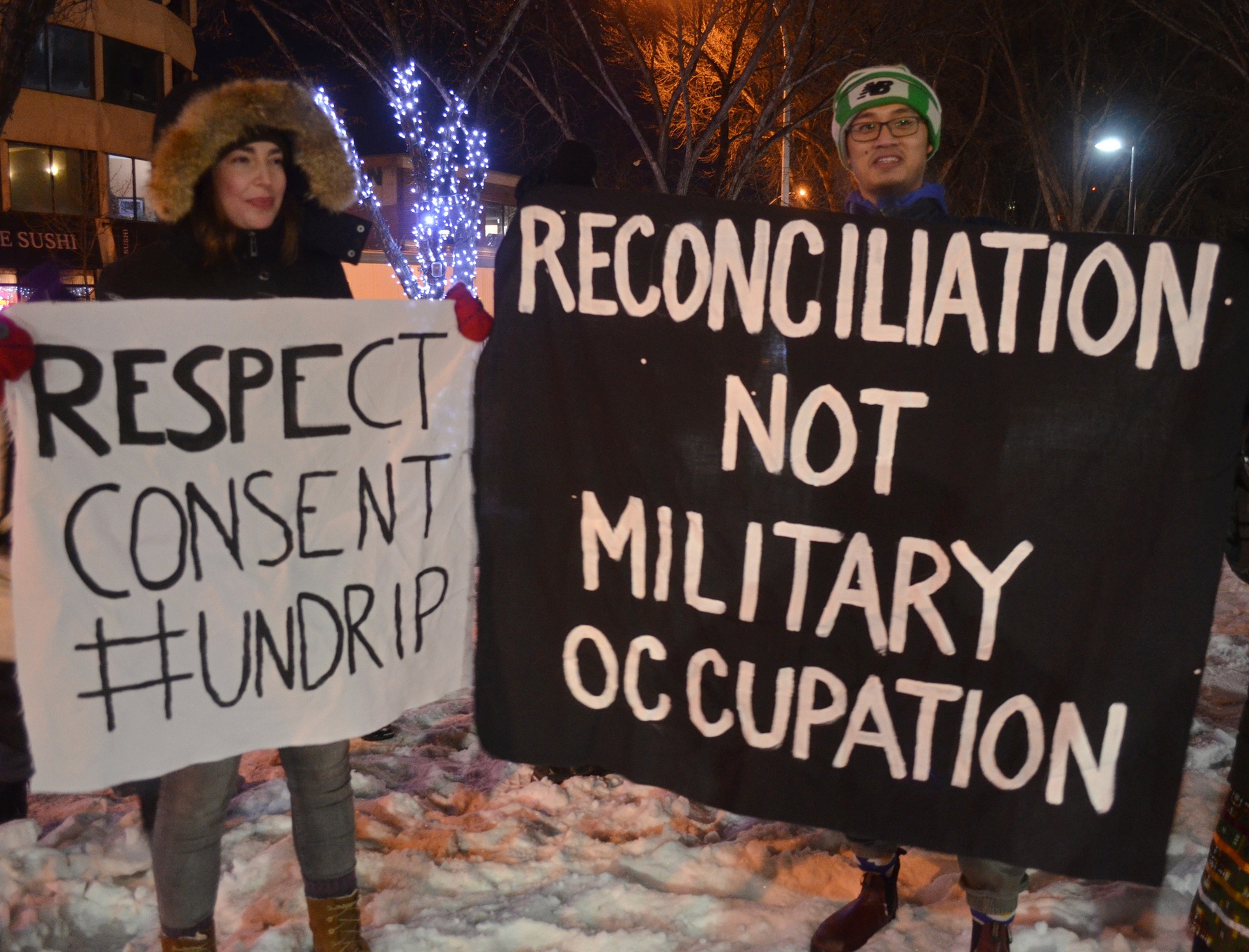


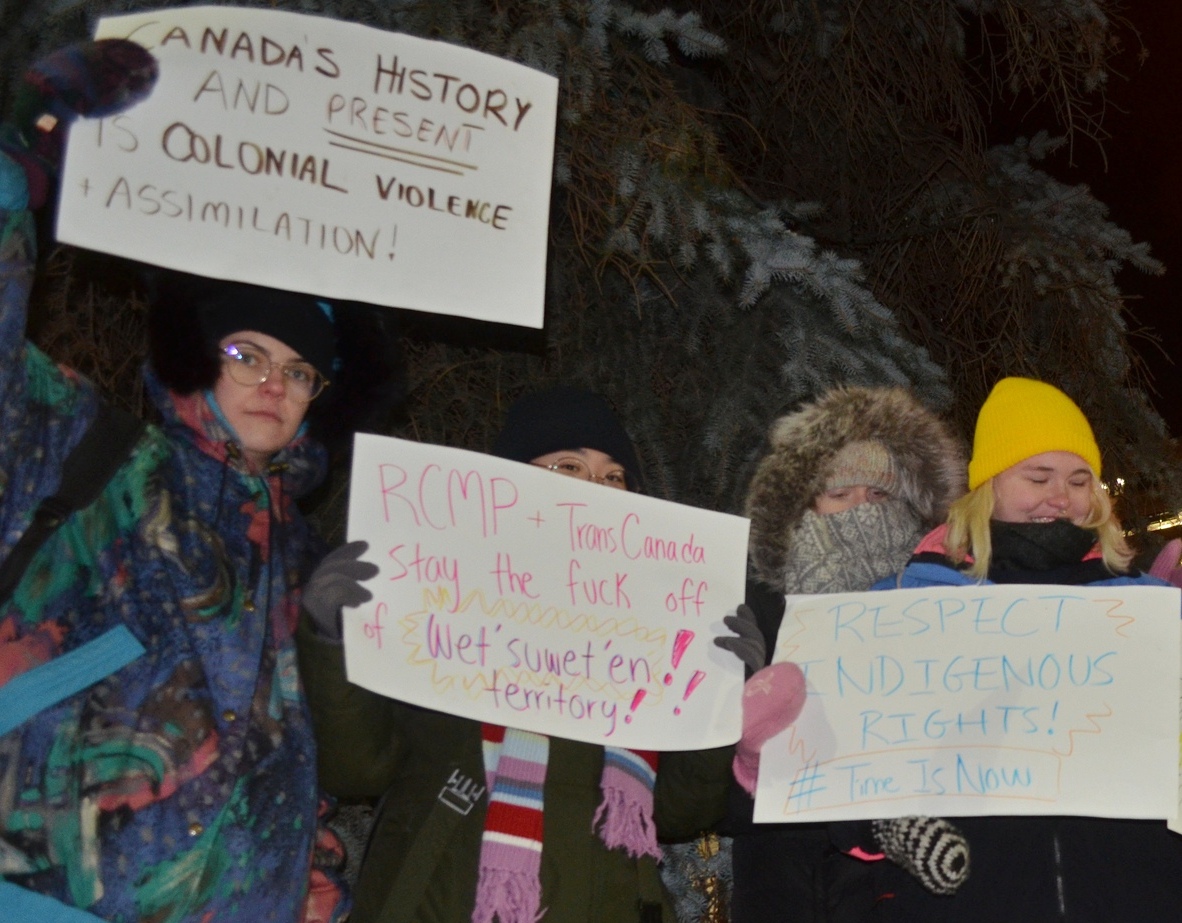
RCMP National Headquarters, Regina, SK
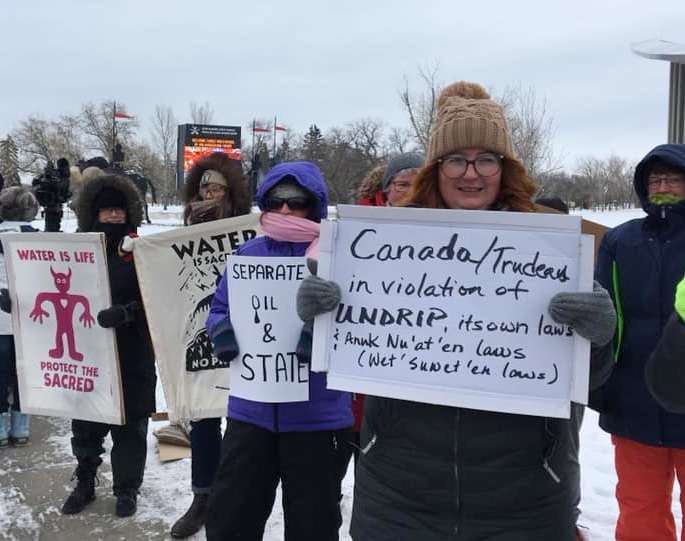
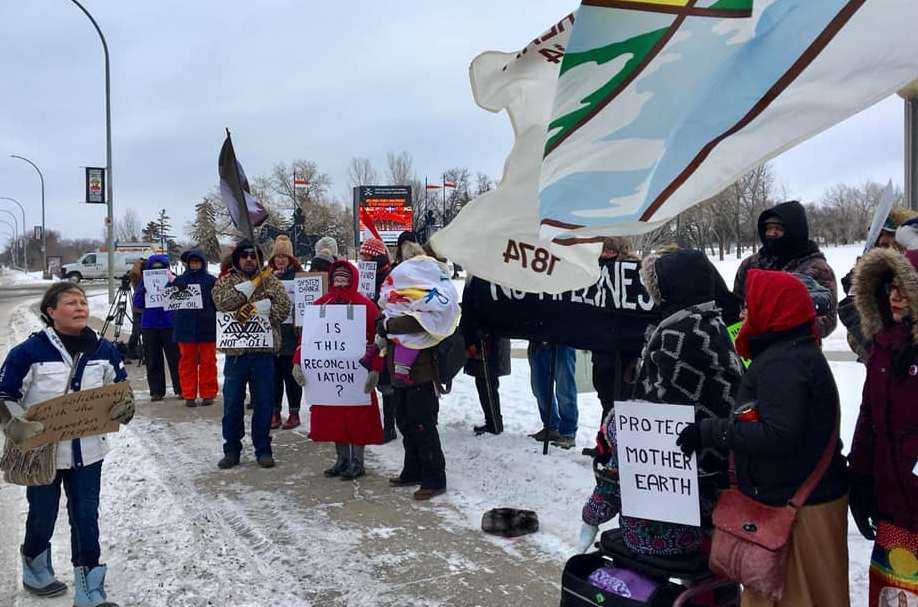
Saskatoon, SK
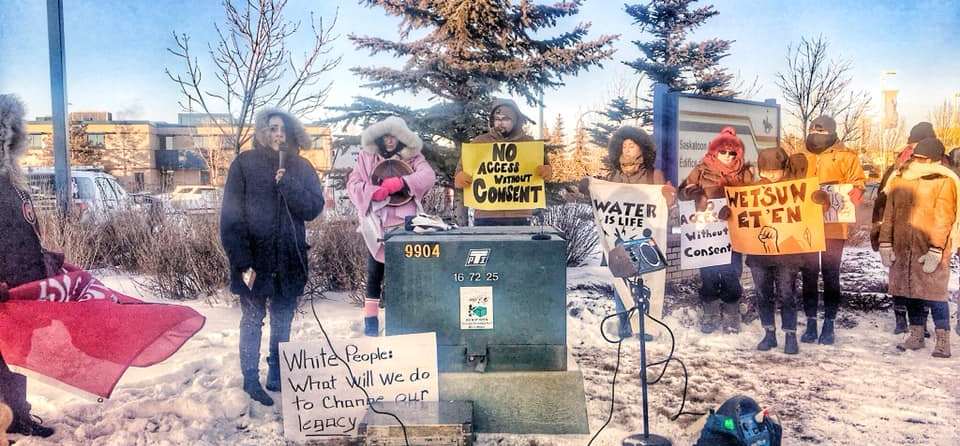
Winnipeg, MB
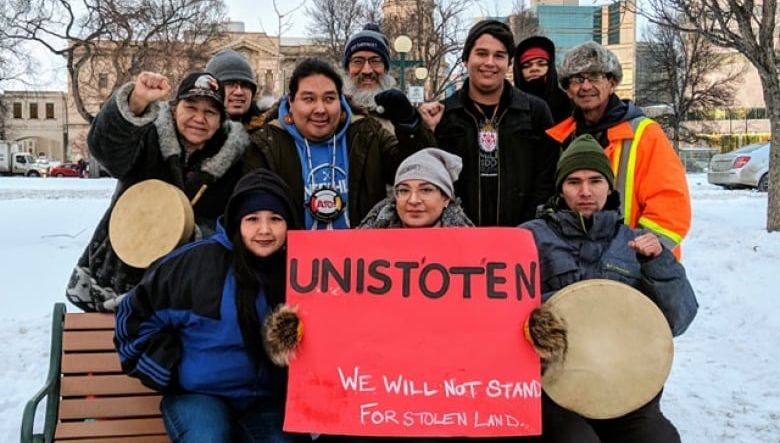
Thunder Bay, ON

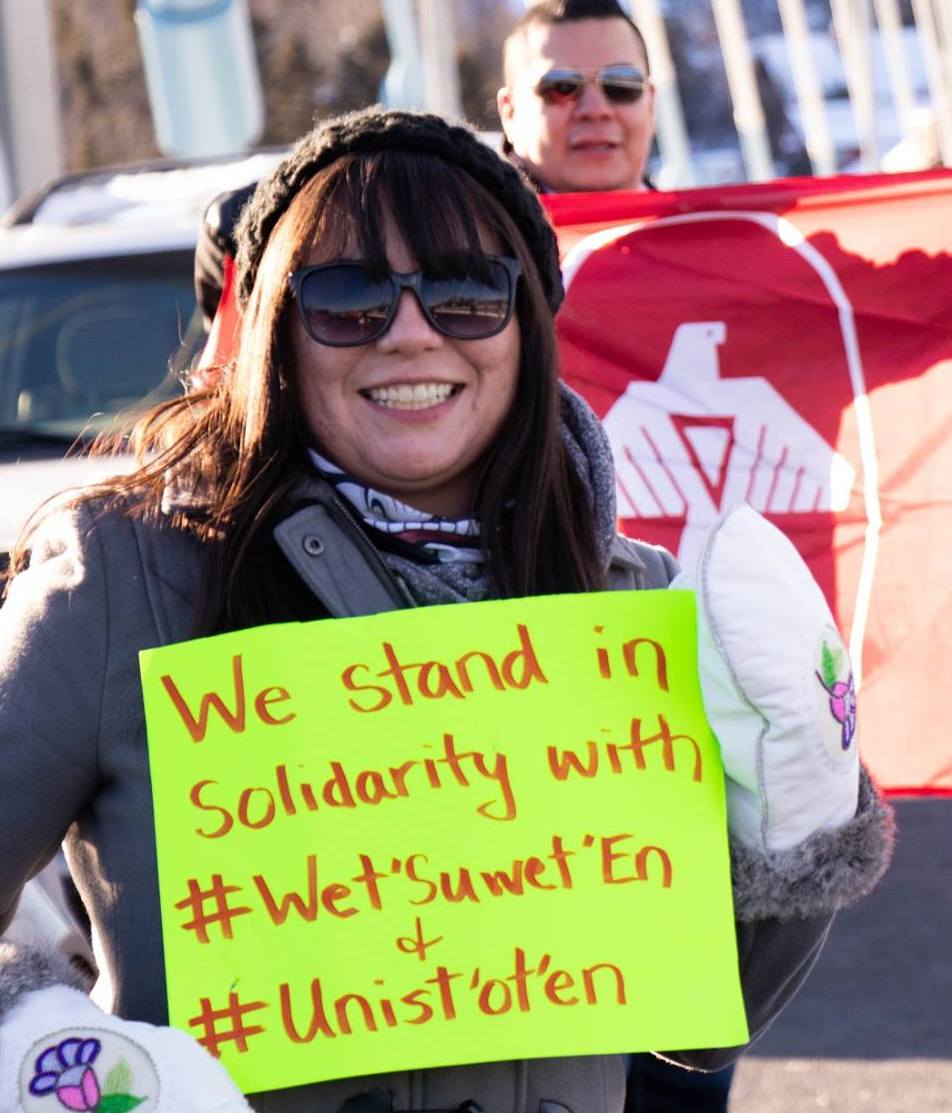
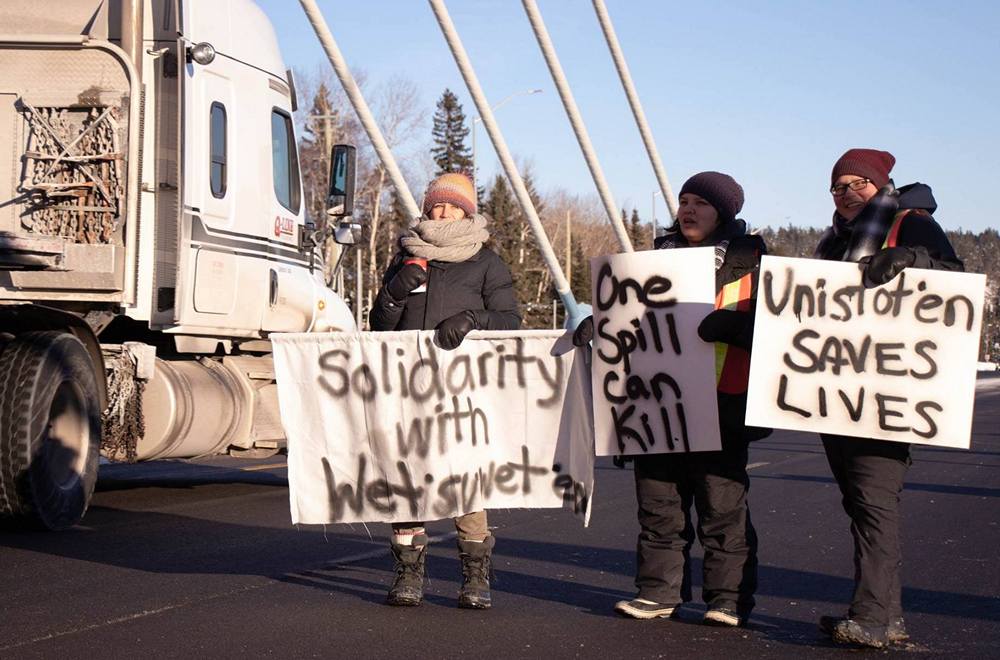
Sault Ste. Marie, ON
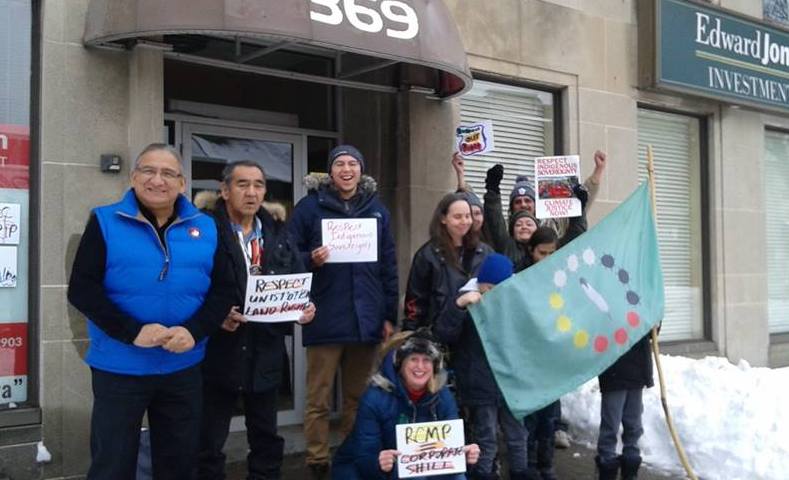
North Bay, ON
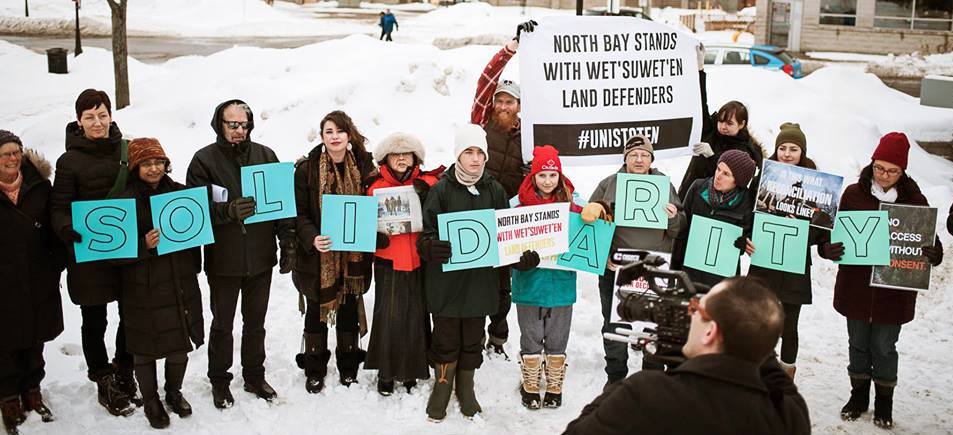
Sudbury, ON

Barrie, ON
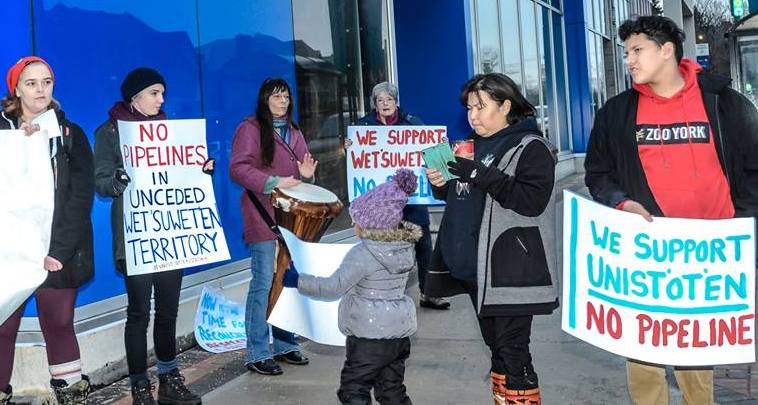
Windsor, ON
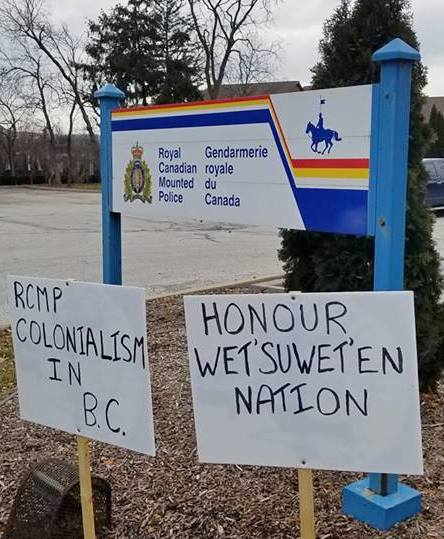
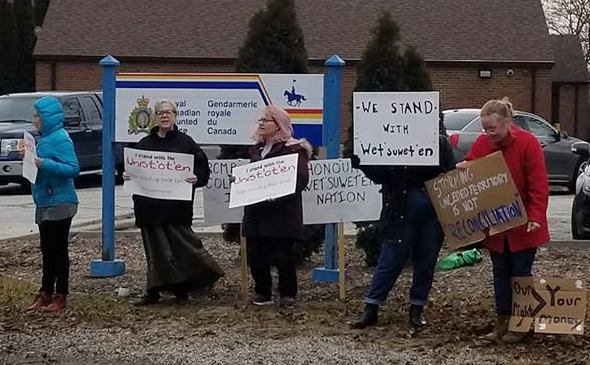

St Catharines, ON

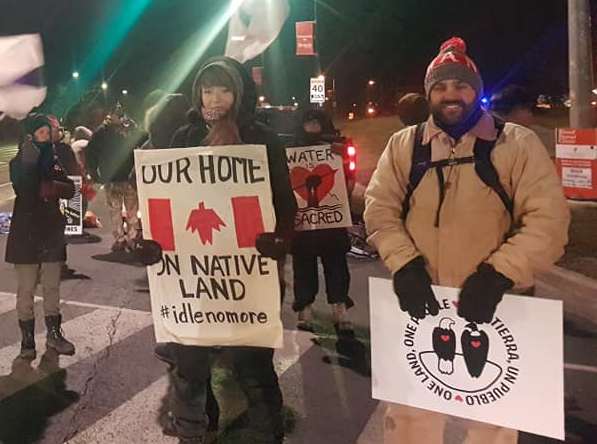

Waterloo, ON
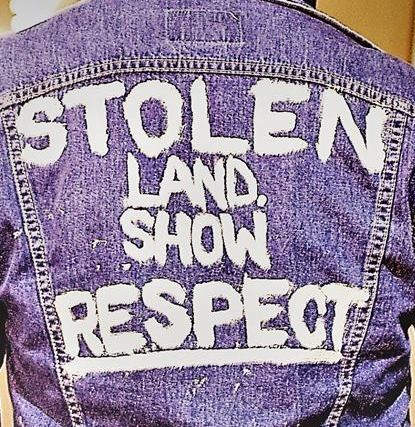
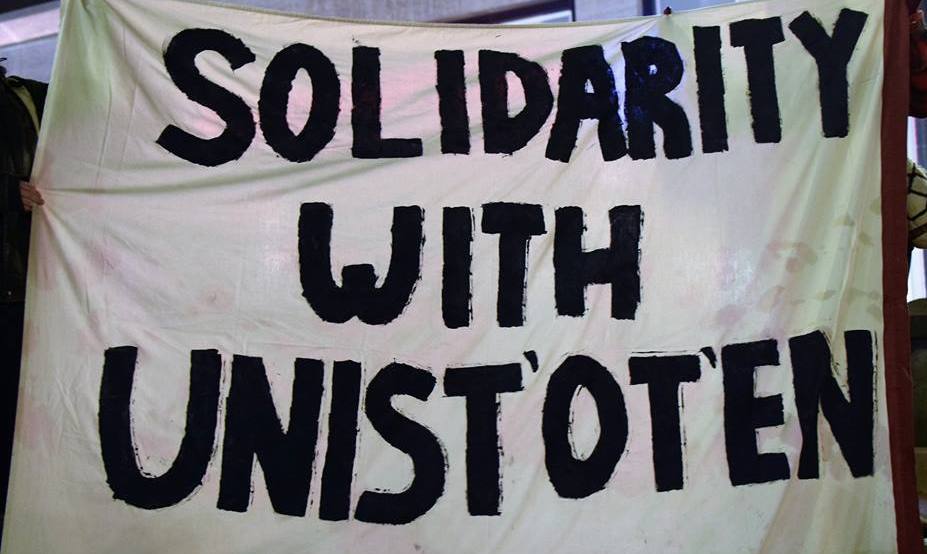
Hamilton, ON
Toronto, ON, January 8
Toronto, ON, January 9

Kingston, ON
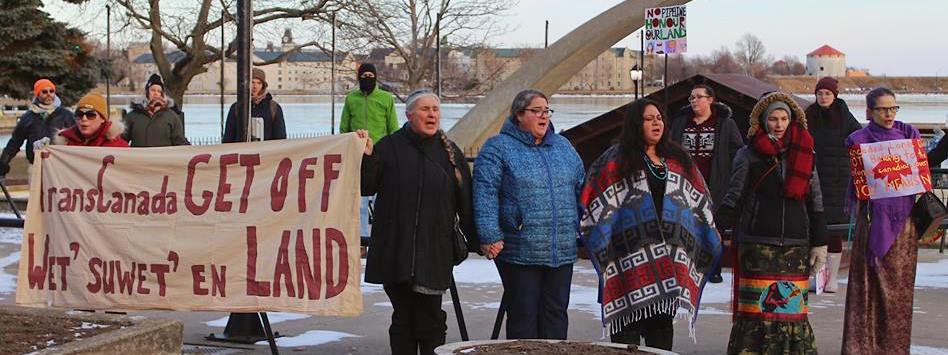
Ottawa, ON
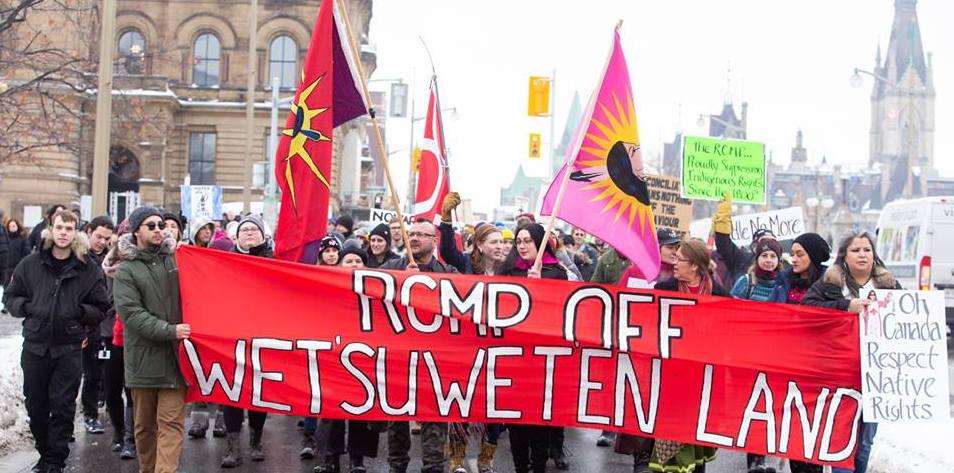
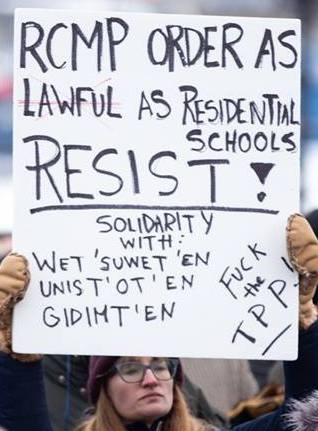
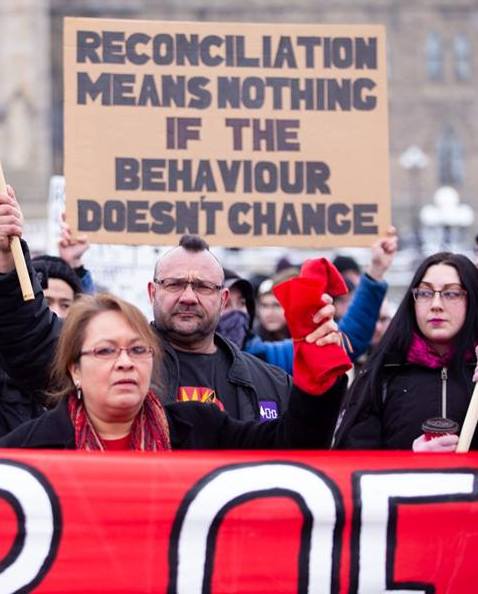
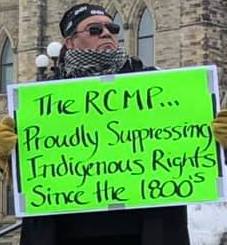

Kahnesatake, QC
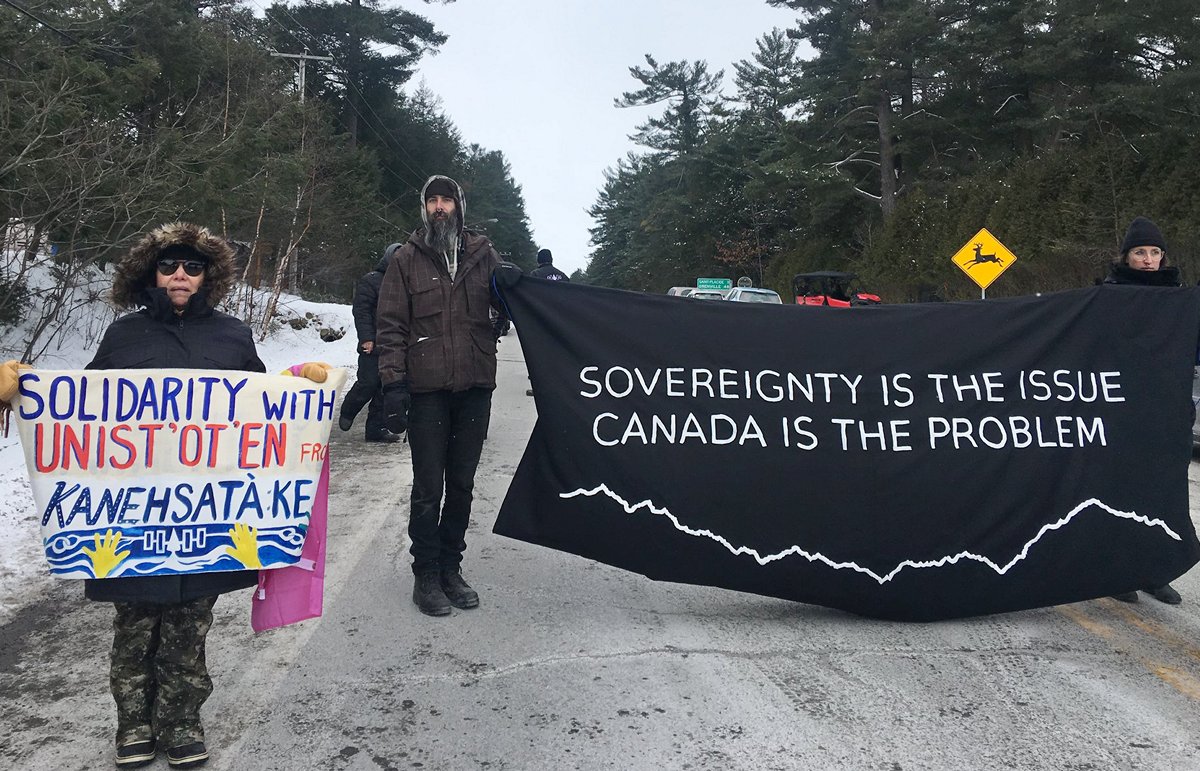

Montreal, QC
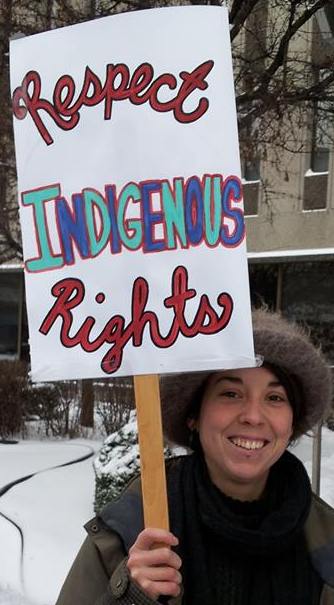
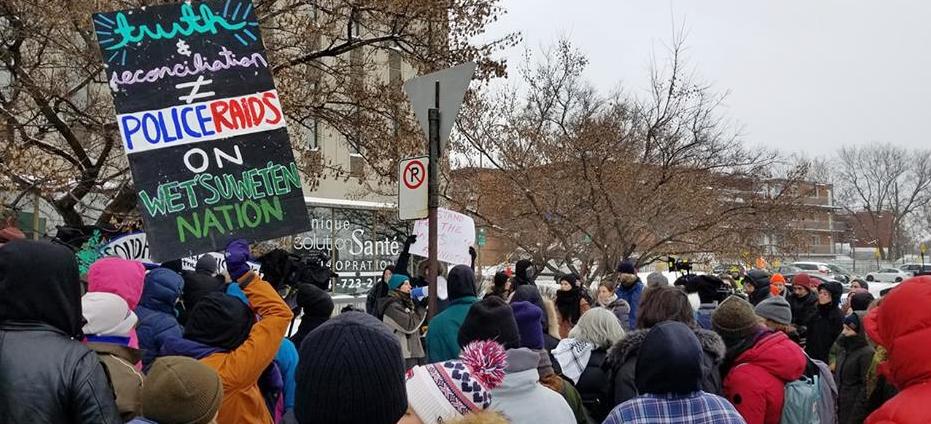
Sherbrooke, QC, January 8
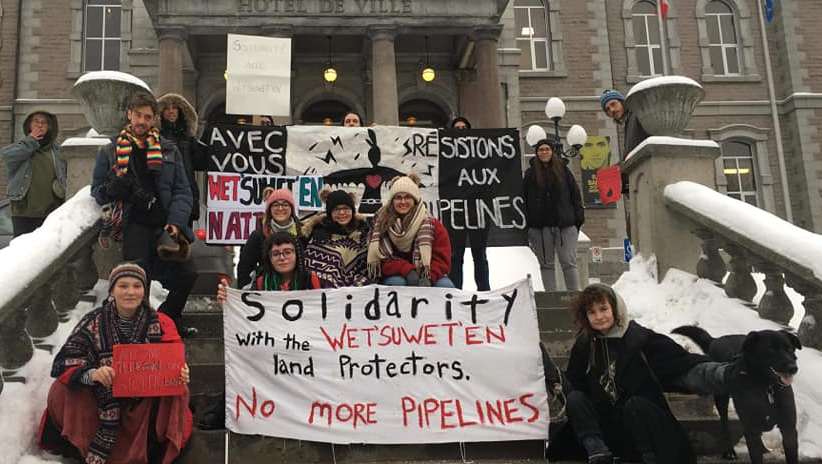
Sherbrooke, QC, January 16
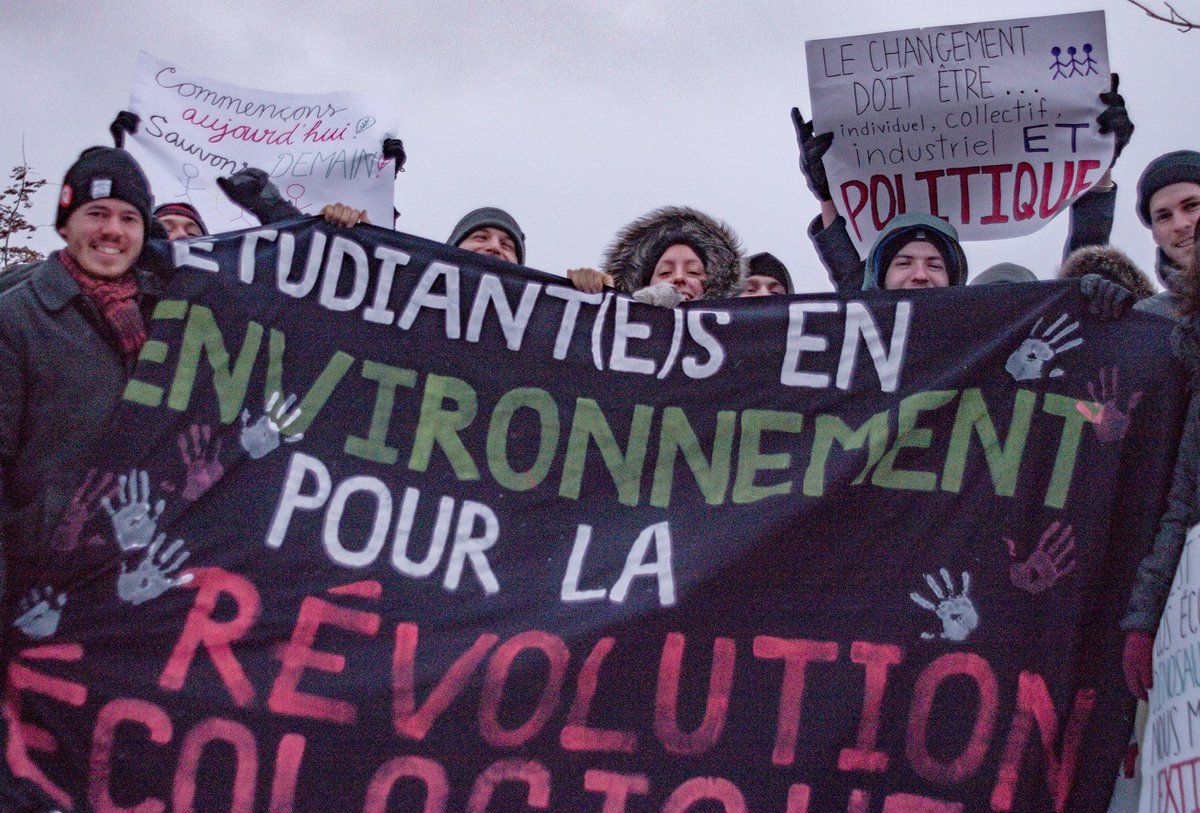
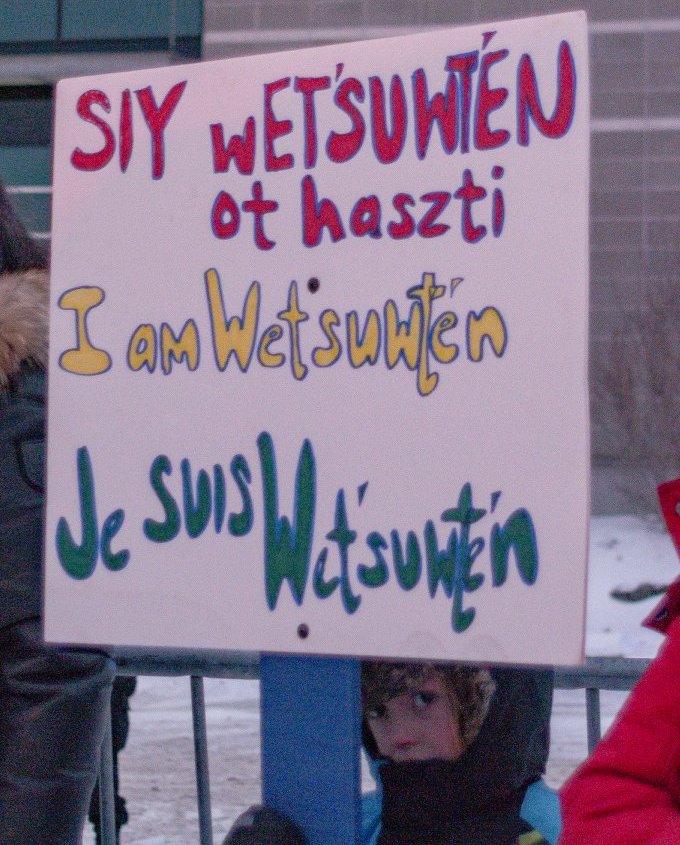
Richibucto, NB
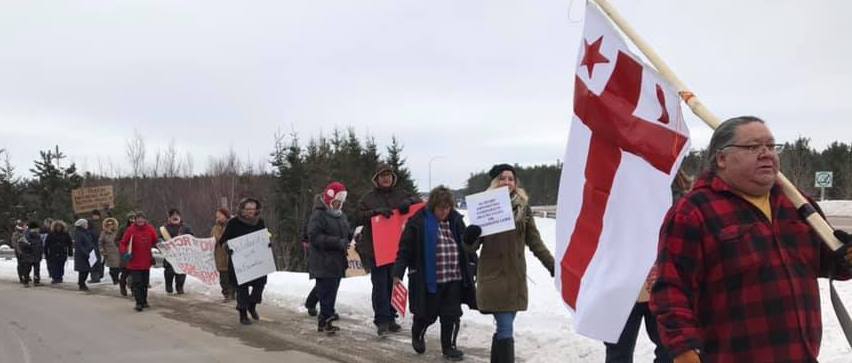
Halifax, NS, January 8

Halifax, NS, January 12
Halifax, NS, January 14
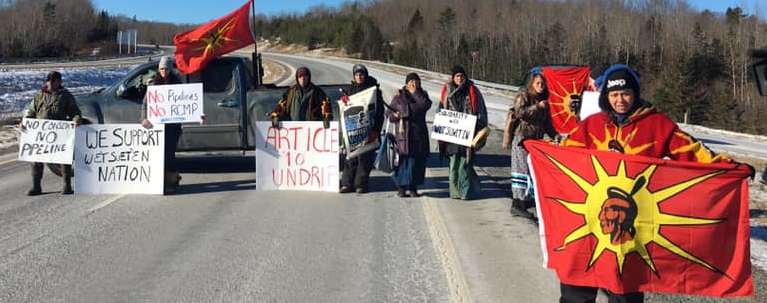
Cornerbrook, NL
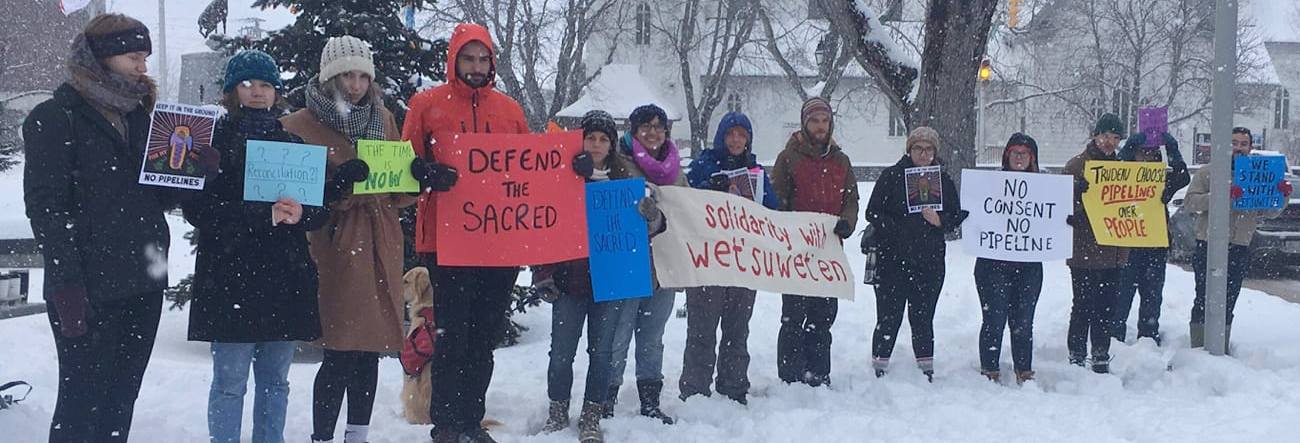
International Actions
Seattle, WA
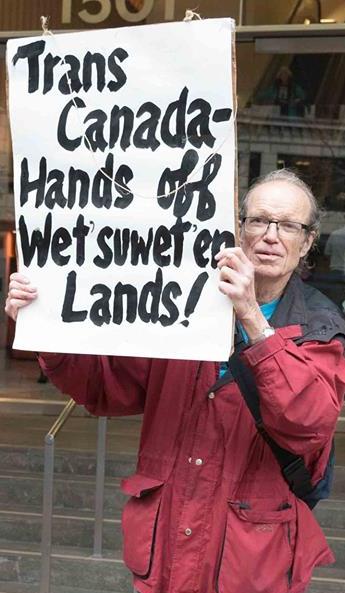
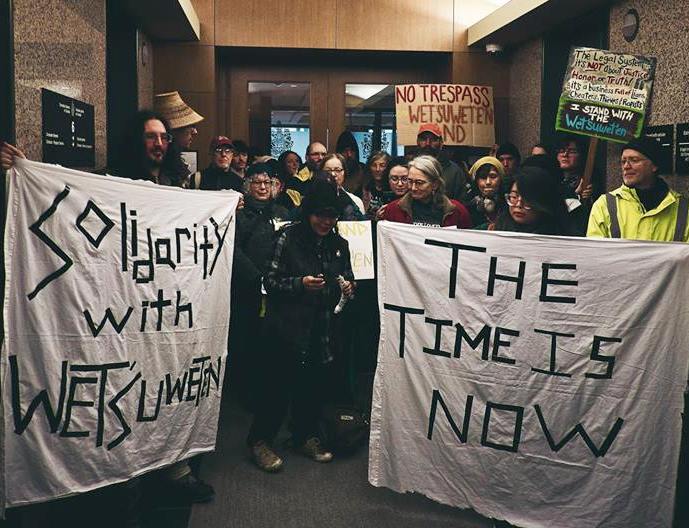
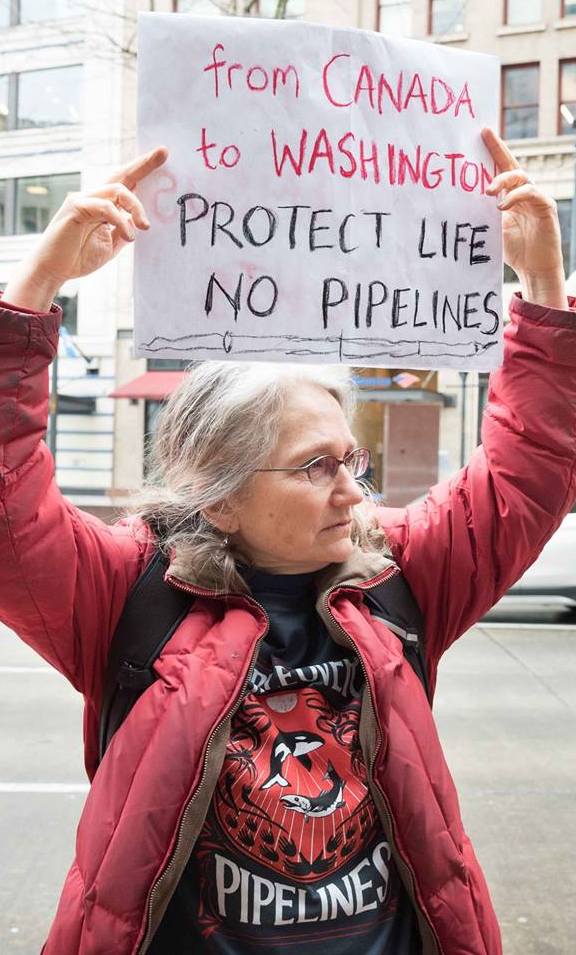
Bellingham, WA
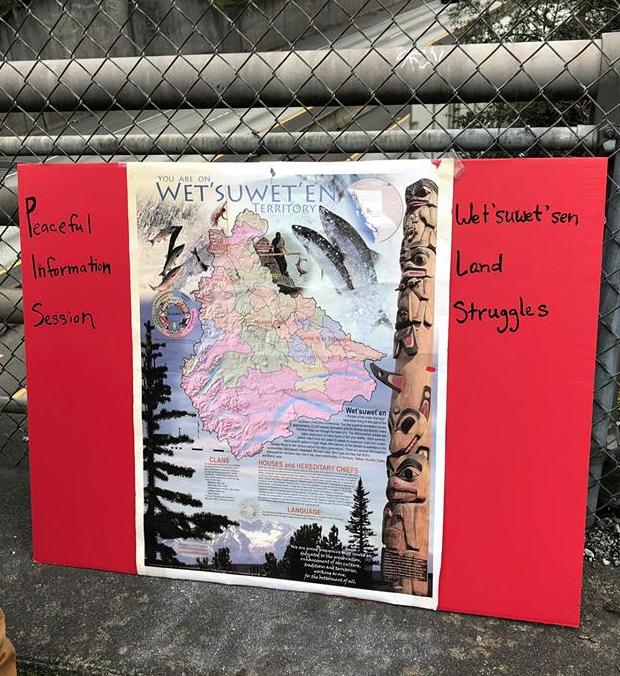
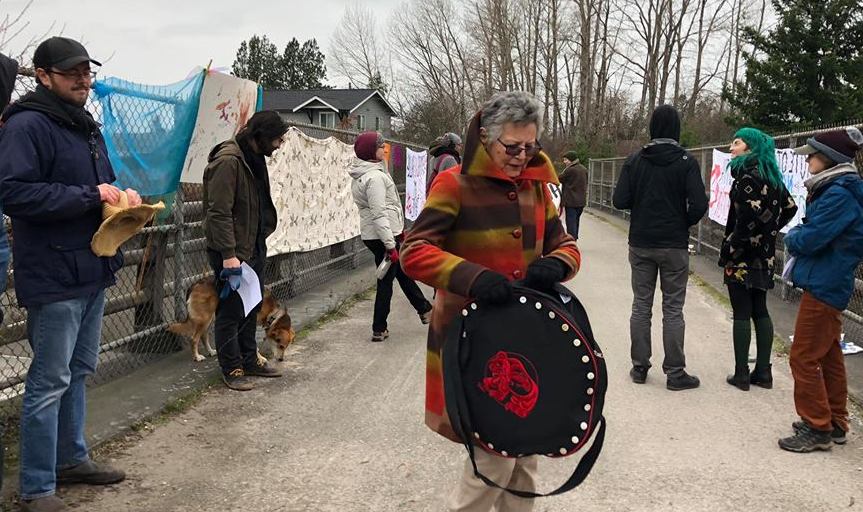
San Francisco, CA
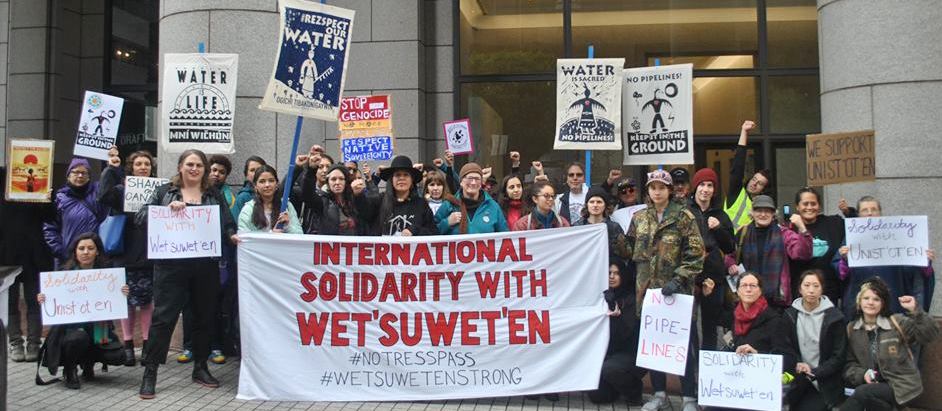
Flagstaff, AZ
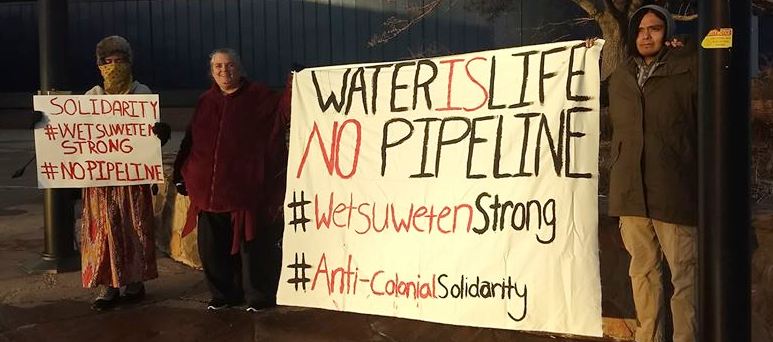
Washington, DC
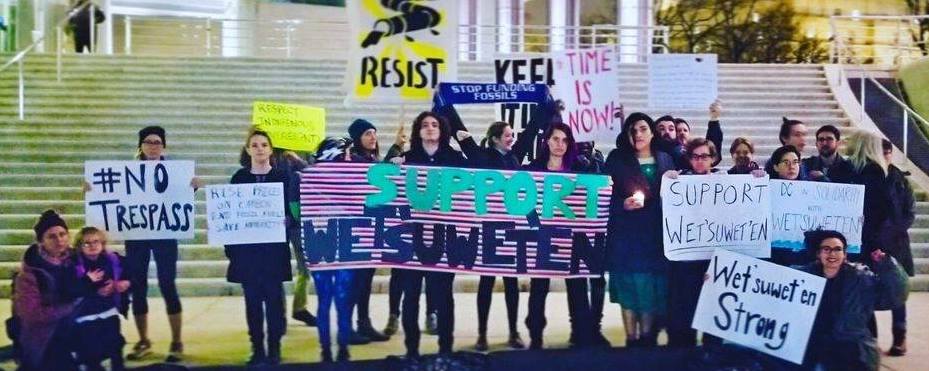
New York City, NY
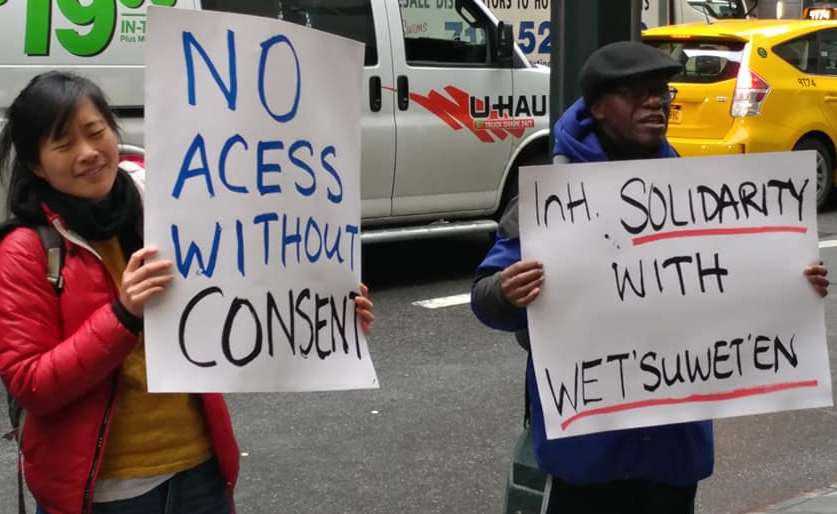
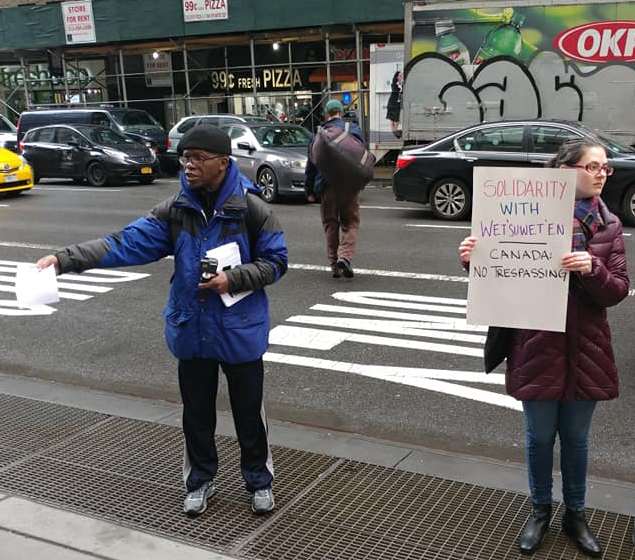
Boston, MA
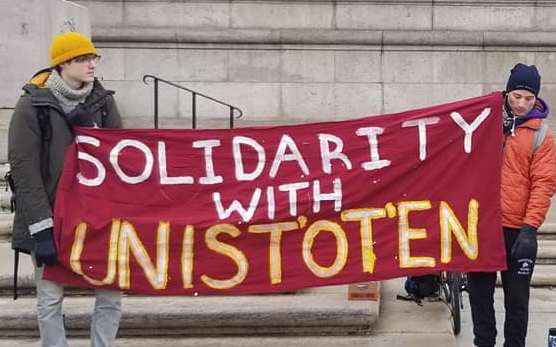
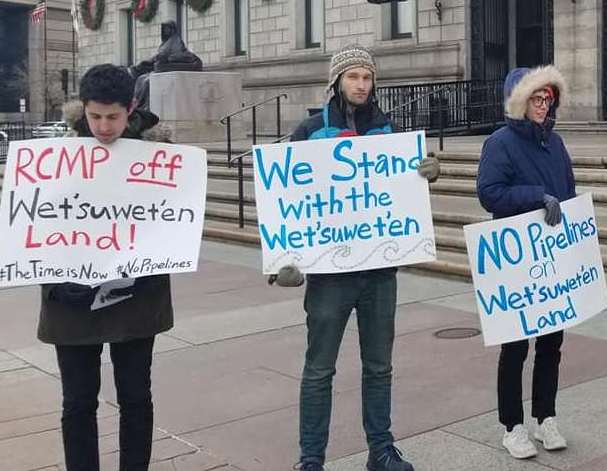
London, UK
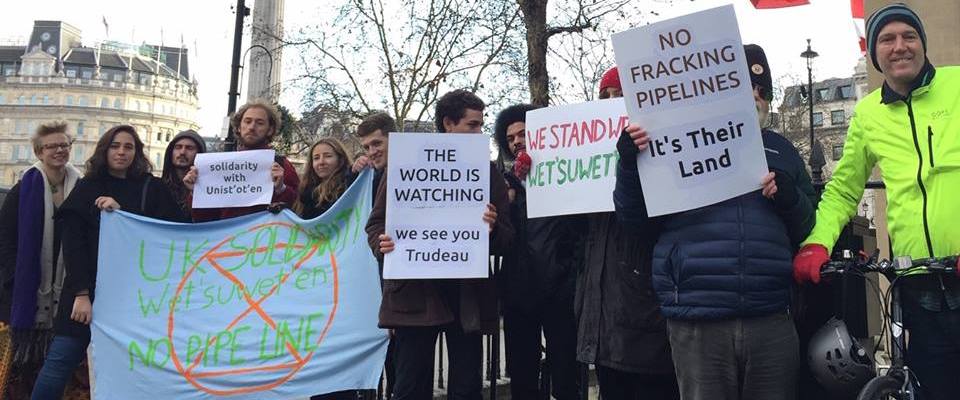
Tentative Agreement Reached to Ensure Safety of Wet’suwet’en Members on Their Territory
A tentative agreement was reached on January 9
between
hereditary leaders of the Wet’suwet’en and the RCMP
as a measure to
ensure the safety of Wet’suwet’en members on their
unceded territory.
Coastal GasLink, which seeks to build a pipeline on their
territory,
was invited by the chiefs to sit in on the discussion to ensure
the
company is on the same page.
The agreement came two days after the raid by RCMP officers to
enforce
a court injunction to dismantle the Gidimt’en checkpoint
and give the
company access. Chief Na’moks, speaking on behalf of the
hereditary
chiefs, was unequivocal that they will continue to fight the
project
and that the agreement is in no way a “consultation or
accommodation of
any sense.”
“We are still here and we’re upholding our rights,
our title our law,
our way,” he said at the press conference following the
agreement. “We
are the people here. We are not invading them. We are here to
protect
our land, our people, our culture.”
Under the agreement, Wet’suwet’en people are no
longer constrained by
an RCMP blockade. Coastal GasLink is given access to the
territory
through the Unist’ot’en checkpoint to conduct
surveying.
No further charges are being sought against
Wet’suwet’en people, and
those who were charged for standing their ground during the
January 7
RCMP raid are returning home. Their court dates are pending. They
have
the full support of the hereditary chiefs, Chief Na’moks
said. “They
are our people,” he said. “They did what they did on
our behalf. We
will stand with them.”
Each Wet’suwet’en clan is made up of a number of
houses, also headed by
hereditary chiefs. The house chiefs unanimously supported a
decision to
block Coastal GasLink from entering their territory, citing
Article 10
of the United Nations Declaration on the Rights of Indigenous
Peoples.
That article says Indigenous peoples must not be “forcibly
removed”
from their territories.
Grand Chief Stewart Phillip, President of the Union of British
Columbia
Indian Chiefs, warned that the matter is far from settled. It is
neither “adequate nor substantial” for companies and
governments to
deal with the elected band councils and then turn around and say
they
have done their consultation work, he said.
Rick Gateman, President of Coastal GasLink, thanked the
hereditary
chiefs for their hospitality and the invitation to discuss ways
to move
forward. “I can say that our discussions were extremely
respectful and
extremely productive,” he told reporters. The company seeks
to build a
675-kilometre pipeline to transport natural gas from Dawson Creek
to
Kitimat. The National Energy Board will shortly begin hearings
that
will go until at least March to determine if the pipeline falls
under
federal jurisdiction. If so, the board would have to hold
environmental
hearings.
Despite this, on January 15, the Gitdumt'en Clan of the Wet'suwet'en people reported that the RCMP "are working to establish a police detatchment on Gitdumt'en territory without the consent of our people," in violation of their January 9 agreement with the Wet'suwet'en hereditary chiefs. The Gitdumt'en point out that the agreement "dictates that all police exclusion zones will be lifted immediately and that our members will have free access to our territories."
In
the
video
below,
Wet'suwet'en
members
question
the
RCMP
about
their
presence.
The
video
also
features
an
interview
with
Elder
Rita
David
of
the
Gitdumt'en
Clan.
Solidarity
actions
continue.
See
Calendar
of
Events.
(APTN, agencies)
End Colonial Injustice
Ontario Government Shows
Disdain for Rights
and Interests of
Indigenous Peoples
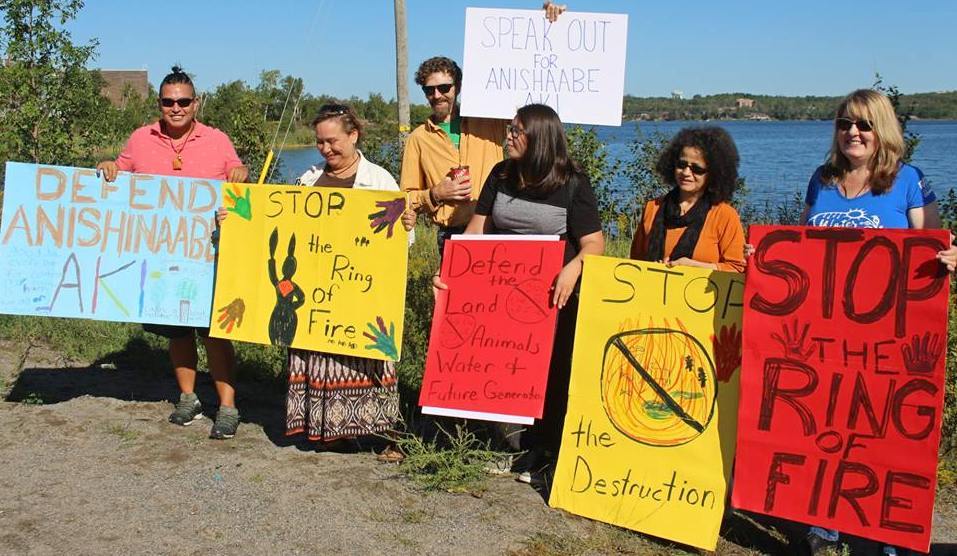
Protest September 6, 2018 in Sudbury against Ford government's
plan to
develop Ring of Fire.
During the Ontario election, Doug Ford's campaign promise was that he would hop on a bulldozer to build a road to the Ring of Fire chrome-nickel deposits. Since elected, the PC Government continues to show disdain for the rights and interests of Ontario's Indigenous peoples in favour of those of the monopolies.
Changes to Cabinet and Ministries
On June 28, 2018, the Ford Government announced its new Cabinet. The new government combined the former Ministry of Indigenous Relations and Reconciliation and the former Ministry of Northern Development and Mines with the Ministry of Energy. It appointed Greg Rickford, MPP for Kenora-Rainy River and former Minister of Natural Resources in the Harper Conservative Government, as a "superminister"of the new Ministry of Energy, Northern Development and Mines and the Ministry of Indigenous Affairs.
The Ministry of Energy had a budget of $2.05 billion in 2017-18, the last year of the Liberal Government; the Ministry of Northern Development and Mines, a budget of $767 million, while Indigenous Relations and Reconciliation had a budget of $91 million. Of the $2.95 billion in total, the budget of the Ministry of Indigenous Relations and Reconcilation constitutes three per cent of the three ministries. These figures indicate the amount of attention that Minister Rickford and the Ontario PC Government can be expected to spend on Indigenous Affairs.
One indication of the neglect of Indigenous Affairs by the Ontario PC Government is the fact that the Ministry only generated three press releases on its activities in the last half of 2018. The last one announced the appointment of a former chief as special advisor on Indigenous issues to Rickford; one dealt with Aboriginal veterans and one -- the only one addressing in any way the living conditions and concerns of Indigenous peoples -- concerning mercury poisoning in Grassy Narrows. In the same period of time, the Ministry of Energy, Northern Development and Mines released nearly one hundred items dealing with the economic interests of the monopolies.
The appointment of Rickford was warmly welcomed by the forest industry monopolies. The Ontario Forest Industries Association (OFIA) issued a statement expressing hope the Ford Government will "make Ontario open for business." OFIA chair Erik Holmstrom, the timberlands manager for Weyerhaeuser in Kenora, Rickford's home riding, said "We are eager to begin work with Premier Ford's government and deliver on a commitment to attract investment and create good jobs in Northern and rural Ontario." Rickford's appointment got a similar endorsement from the Thunder Bay Chronicle-Journal, northwestern Ontario's largest newspaper. "Rickford can speak for the North," the paper crowed in an editorial.
Indigenous leaders expressed deep concerns about the appointment of Rickford and the merger of the ministries. According to Anishinabek Nation Grand Council Chief Glen Hare, by including Indigenous Affairs with two other ministries, Ford is ignoring recommendations from the Ipperwash Inquiry for a stand-alone ministry dedicated to Indigenous issues. Hare says he wonders if Rickford will have enough time to devote to Indigenous issues. "Energy is a big thing right now and what kind of time is he going to put into that, what kind of his time into Northern Development and Mines, and then us. That's the big question," he said.
The removal of the word "Reconciliation" from the name of the Ministry also indicates disdain for the rights and interests of Indigenous peoples. Reconciliation is not important for the Ontario PC Government while "opening Ontario up for business" is paramount. In a statement, Nishnawbe Aski Nation (NAN) Grand Chief Alvin Fiddler said it "sends a clear signal that improving relations with Indigenous peoples is not a priority for the Ford government. It is difficult to see how progress can continue to be made when our interests are reduced to only be of importance insofar as they relate to the government's ability to access the resources within our lands. This government is advised that any effort to undermine the Treaty, ancestral or territorial rights of NAN First Nations will be decisively fought at both the political and legal levels. Our leaders are united in their resolve to protect and assert our rightful authority and jurisdiction over our homelands."
Cancellation of Curriculum-Writing Session on Indigenous Relations
In July, the Ontario PC Government suddenly cancelled a curriculum-writing session on Indigenous Relations for the truth and reconciliation component of the Ontario curriculum. This new curriculum was to be taught to all Ontario students and was one of the recommendations of the Truth and Reconciliation Commission (TRC). Rickford said the curriculum-writing was being put on hold because the government was being "cost-conscious," even though some of the participants had already begun their travel to Toronto and that substitute teachers would have to replace those engaged in the curriculum review at additional cost and disruption.
Cuts to Ontario Arts Council
In December, the Ontario government slashed the Ontario Arts Council's (OAC) Indigenous Culture Fund (ICF) by 45 per cent -- from $5 million to $2.75 million. Four Indigenous women who administer the ICF have also been laid off. A ministry spokesperson equivocated that the fund was cut for the 2018-2019 year in order "to ensure taxpayer dollars are being used responsibly and efficiently to maximize the impact of Indigenous culture support." Base funding for the OAC, which provides grants to Ontario-based artists and organizations, is also being reduced from $69.9 million in 2018-2019 to the 2017-2018 level of $64.9 million. The reduction of spending for Indigenous Culture far outweighs the cut in funding for the arts as a whole, constituting $2.25 million or 45 per cent of the cuts to the OAC budget.
Like the new curriculum, the ICF was a response to the TRC. "Combined, this represents a rather gross attack on reconciliation," says Indigenous Screen Office director Jesse Wente, "and on Indigenous communities and their ability to preserve and continue their traditional practices." The ICF was established by the former Liberal government in 2017 and supports First Nations, Inuit and Métis cultural programs, activities and events intended to preserve heritage, such as bead making and language learning.
Reports on Police Mistreatreatment of Indigenous People
On December 12, the Office of the Independent Police Review Director (OIPRD) released a report, Broken Trust: Indigenous People and the Thunder Bay Police Service, condemning the racist ideology and actions of the Thunder Bay Police Service (TBPS) and its relationship with Indigenous communities. In particular, OIPRD was investigating the deaths in recent years of seven (now ten) Indigenous youth whose bodies were found in rivers that flow through Thunder Bay. The report found significant deficiencies in sudden death investigations involving Indigenous people that are due, in part, to racial stereotyping. The report also addresses systemic racism within the service more generally, and finds systemic racism exists at an institutional level.
"The serious inadequacies and premature conclusions in TBPS investigations of Indigenous missing persons and sudden deaths have strained what was already a deeply troubled relationship. My recommendations provide tools to help TBPS ensure that its investigations are thorough, effective and non-discriminatory. My recommendations also provide TBPS with a path forward to improve its relationship with Indigenous people," said Gerry McNeilly, the Independent Police Review Director.
Two days later, on December 14, Senator Murray Sinclair released another report exposing systemic racism and discrimination in the Thunder Bay Police. Sinclair recommended that the local civilian oversight body be dismantled for one year and an administrator put in its place. The former chair of the Truth and Reconciliation Commission was appointed by the Ontario Civilian Police Commission in July 2017 to look into concerns raised by the Indigenous community over the ability of the police board to address issues raised by Indigenous leaders. His report concludes that failures by the board to heal distrust between the Indigenous community and police constitute an "emergency."
Neither Doug Ford nor Greg Rickford had any comments on these two reports.
December 2018 Ruling in Robinson Treaties
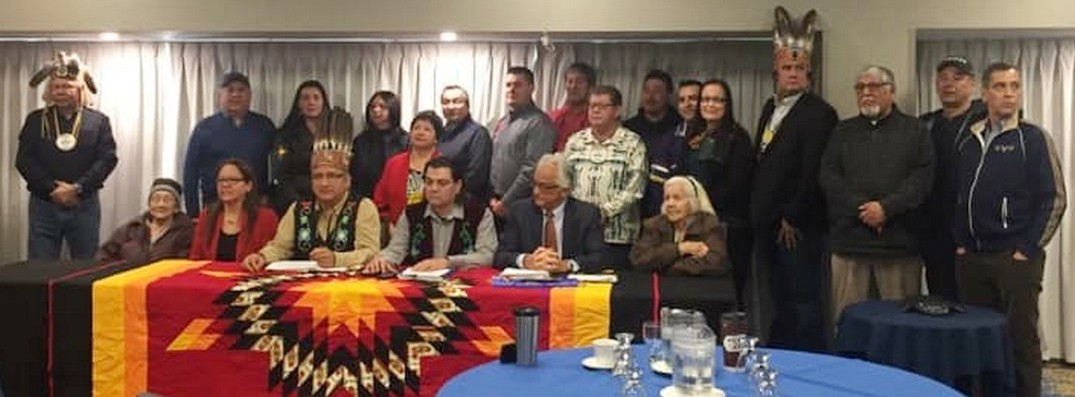
Press conference, December 27, 2018, following conclusion of
court case
brought by 21 First Nations signatories to the Robinson-Huron and
Robinson-Superior Treaties.
On December 24, Justice Patricia Hennessey of the Ontario Superior Court rendered her verdict in the Robinson Treaties annuity case in which the annuity paid to the Anishinabek people of the shores of Lake Huron and Lake Superior has not been increased from the $4 per person per year set in 1874. A law suit against Canada and Ontario was brought in 2014 to remedy this injustice by 21 First Nations signatory to the Robinson-Huron and Robinson-Superior Treaties. Huge wealth has been torn from the Robinson Treaties lands. The value of resources in the traditional territories of one First Nation alone, Atikameksheng Anishnawbek (AAFN), which includes the City of Greater Sudbury, was estimated a few years ago by AAFN elders at $550 billion. Hearings were held in Thunder Bay beginning in September 2017 and continued in Garden River and Little Current and concluded in June 2018 in Sudbury.
Superior Court Justice Patricia Hennessy found in her decision that the treaty was not meant to be a one-time transaction, but instead established a mutually beneficial and respectful ongoing relationship for the sharing of land and resources in the Territory. "I find that the Crown has a mandatory and reviewable obligation to increase the treaties' annuities when the economic circumstances warrant," Hennessy said in her ruling. The First Nations involved consider the ruling a victory.
Justice Hennessy did not rule on how much the
payments
should
be or what arrears are payable and how. She left it to the two
parties to negotiate the details of the settlement now that she
had ruled on the principle. If the two parties do not reach a
negotiated settlement, Justice Hennessey remains seized of the
case and will hold hearings and make a determination.
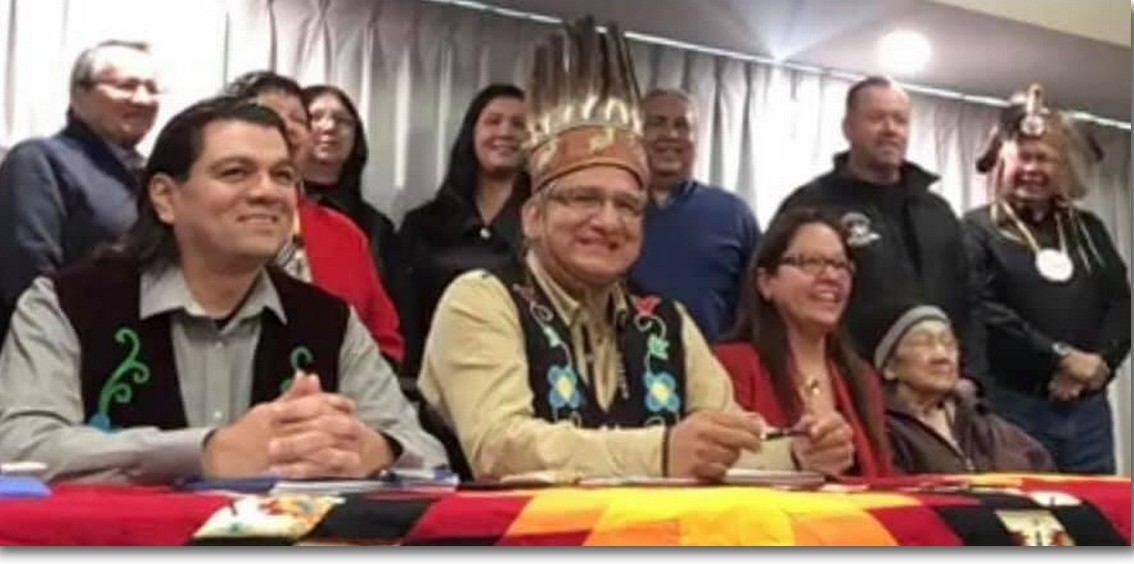
Press conference, December 27, 2018.
"For the Anishinaabe, these treaties are not a
mere
real
estate transaction," said Dean Sayers, Chief of the Batchewana
First Nation. "They were, and are, a means by which the
Anishinabek will live in harmony with the newcomers and maintain
relationships in unforeseeable and evolving circumstances. It
took 168 years for our voices to be heard regarding our
discontent with the lack of full implementation of the treaty. We
believe that with a clear determination from the court on the
nature and content of the treaty obligation to augment the treaty
annuities, the Crown should initiate meaningful negotiations to
implement the decision in accordance with the principle of
reconciliation."
To date, neither Ontario nor Canada have accepted the First Nations' proposal to negotiate a principled settlement based on Justice Hennessey's ruling. An Ontario government official stated that the government was "studying" the question. There has been no statement by Minister of Aboriginal Affairs, Greg Rickford, on this matter. One of the Canadian state's preferred ways to obfuscate and delay settlement of Treaty issues is to keep matters before the courts.
These developments and their speed indicate that Canadians need to be very active in staying abreast of events, both what is said and done and what is not said and done. The response of Indigenous peoples to protect their rights and interests must be fully supported. The Canadian and foreign monopolies and the Canadian state, never friends of Indigenous peoples, are intensifying their attack on the hereditary and treaty rights. The Canadian working class, whose ranks include many Indigenous people, can only emancipate itself by also emancipating all of humanity, including all Indigenous peoples.
UN Committee Expresses
Concern About Lack
of Consent in Site
C Dam Construction
The United Nations Committee on the Elimination of Racial Discrimination has sent a letter to Canada expressing concern about the lack of consent from Indigenous peoples about the construction of the Site C Dam on the Peace River in Northern BC.
The UN body has instructed Canada to suspend construction on the 1,100 megawatt hydro dam, which would flood 128 kilometres of the Peace River in Treaty 8 territory. The Union of BC Indian Chiefs has filed a civil suit against construction.
"The committee is concerned about the alleged lack of measures taken to ensure the right to consultation and free, prior and informed consent with regard to the Site C dam, considering its impact on Indigenous peoples' control and use of their lands and natural resources," said the December 14, 2018 letter that was sent to Rosemary McCarney, Canada's ambassador to the UN.
The committee has given Canada until April 8 to respond. A previous request by the committee for Canada to provide an update on the situation by an August 2018 deadline, was not met.
(The Narwhal)
Ongoing Fight for
Equitable Care for
All Indigenous Children
In an Ottawa hearing room on January 10, the Government of Canada once again found itself arguing against Cindy Blackstock, Executive Director of the First Nations Family and Caring Society. "At issue was which children are Indigenous enough, according to the Indian Act (a paternalistic law created in 1876 that governs the lives of all Status Indians in this country), and therefore who should qualify for services under Jordan's Principle, which aims to ensure all Indigenous kids receive equitable care no matter where they live," writes Tanya Talaga for the Toronto Star.
At the end of the hearing, Blackstock said "nobody had an answer as to what will happen to children" in need of urgent care for life-threatening conditions while a Canadian Human Rights Tribunal process on the matter continues -- or who will pay for their care. In other words, until the tribunal meets again to discuss this issue in March, children will remain at risk.
She added the society has offered to sit down and mediate directly with the government.
Blackstock rejected using Canada's Indian Act blood quantum method to determine who is, or is not, First Nations. Belonging should be decided by the Indigenous communities themselves, not by the federal government.
"Our ancestors were distinct First Nations
citizens
before
the Indian Act and so are we," Blackstock tweeted.
(Toronto Star)
UN Rules that Canada's Indian Act Discriminates Against First Nations Women
 In a decision
released
January 14, the United Nations
Human Rights Committee ruled that Canada continues to
discriminate against First Nations women and their descendants by
denying them the same entitlement to full s. 6(1)(a) status under
the Indian Act as First Nations men and their descendants.
This long-standing discrimination affects First Nations women's
entitlement to status, their right to transmit status, and their
equality with First Nations men.
In a decision
released
January 14, the United Nations
Human Rights Committee ruled that Canada continues to
discriminate against First Nations women and their descendants by
denying them the same entitlement to full s. 6(1)(a) status under
the Indian Act as First Nations men and their descendants.
This long-standing discrimination affects First Nations women's
entitlement to status, their right to transmit status, and their
equality with First Nations men.
The Committee ruled that Canada is obligated to remove the discrimination and to ensure that all First Nations women and their descendants are granted status on the same footing as First Nations men and their descendants.
Sharon McIvor, who filed the petition with the UN Human Rights Committee that resulted in this ruling, said, "This decision is a game-changer for First Nations women, and for Canada. If the Government of Canada fulfills its obligations and finally treats First Nations women as equals, it will be a new day for us, for our communities and for Canada. First Nations women have been fighting against this discrimination in the courts and at the UN since 1970. I hope that Canada will now bring this devastating discrimination to an end."
In December 2017, the Parliamentary Budget Officer estimated that there are more than 270,000 women and their descendants who would be newly entitled to Indian status if 6(1)(a) status were granted to them on the same footing as Indian men and their descendants. "This is evidence of how profound and damaging the discrimination is," said Dr. Pamela Palmater, Chair in Indigenous Governance at Ryerson University. "Sex discrimination in the Indian Act has been a very effective tool of assimilation, defining First Nations women and their descendants out of the pool of status Indians to whom the Government of Canada owes recognition and benefits."
Grand Chief Stewart Phillip, President of the Union of BC Indian Chiefs stated, "Canada has clung to the sex discrimination in the Indian Act despite years of struggle against it by Indigenous women and their allies, in courts, at the UN, and in Parliament when amendments were being debated. Canada admitted in 2017 that the discrimination continues, and it put provisions into Bill S-3 that would eliminate the discrimination, but it never brought those provisions into force. Canada knows how to fix the discrimination. It just needs to do it. And do it now. On September 21, 2017, Prime Minister Trudeau told the United Nations General Assembly that 'the world expects Canada to adhere strictly to international human rights standards ...and that's what we expect of ourselves too.' That is what we all expect: that Canada will live up to its human rights obligations, now. We look forward to the Government of Canada's response."
Quotes:
Gwen Brodsky: "The UN Human Rights Committee says that Canada is obligated to provide an effective and enforceable remedy. This requires Canada to make full reparations, including: 1) ensuring that Sharon McIvor, Jacob Grismer, and all others excluded by, or granted only a lesser category of status, because of the sex-based distinctions in s. 6 of the Indian Act are granted full 6(1)(a) status; 2) addressing any residual discrimination in First Nations communities that arises from Canada's sex-based discrimination in the Indian Act ; 3) communicating the decision broadly in Canada; and 4) reporting back to the United Nations in 180 days to provide information about the measures it has taken to comply with this decision. This is a very significant remedy and one that requires immediate action."
Kukpi7 Judy Wilson, Secretary-Treasurer of the UBCIC: "This decision brings the Government of Canada's current consultation process into question once again. Some of the questions that Canada is consulting about, the United Nations has answered straightforwardly and clearly. All the women and their descendants who have been excluded by sex discrimination must be granted full status, including those born prior to 1951. There should be no delay in moving registration forward quickly and efficiently. The Government of Canada should address any residual discrimination in communities that could be caused because of the addition of new members to communities or Bands, and any need for additional resources, rather than continuing to focus all their energy on trying to force pipelines through and causing further human rights violations. We need this discrimination to end, and end now."
Shelagh Day,
Chair,
Human Rights Committee, Canadian Feminist
Alliance for International Action: "This sex
discrimination has
been in the law in Canada for more than one hundred years. It has
had a profoundly damaging effect. The fact that First Nations
women have been treated overtly, in law, as though they are the
property of men, second class, and not equal, has had the effect
of marginalizing First Nations women in their own communities and
in the broader society. It is not surprising that in their
reports on the crisis of murders and disappearances of Indigenous
women and girls, both the UN Committee on the Elimination of
Discrimination against Women (CEDAW) and the Inter-American
Commission on Human Rights (IACHR) found that historical
Indian Act
sex discrimination is a root cause of the
shocking levels of violence against Indigenous women. Canada
cannot improve the lives of First Nations women and girls, and
reduce their risk of violence, until Canada gets rid of Indian
Act
sex discrimination, completely and for all
time."
To contact the
BC
Union of Indian Chiefs: 604-684-0231 (Toll Free 1-800-793-9701);
ubcic@ubcic.bc.ca; www.ubcic.bc.ca.
Unfolding Events in Latin America
and the
Caribbean
Cuba
|
Cuba Strongly Rejects
Threat to Activate
Title III of Helms-Burton
Act
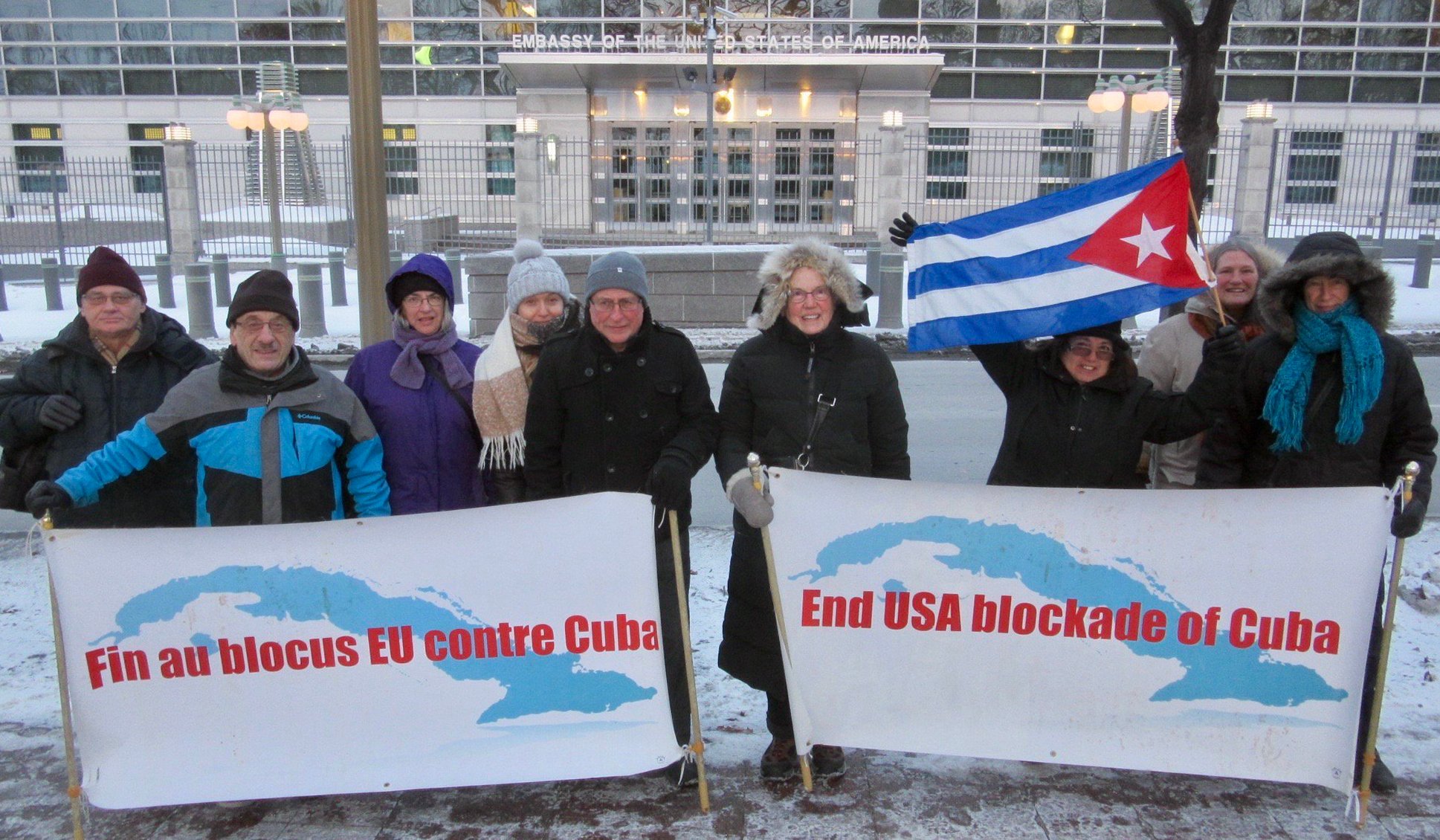
Monthly picket against the blockade, Ottawa, January 17, 2019
On January 16, 2019, the U.S. State Department announced its decision to suspend, for just 45 days, the implementation of Title III of the Helms-Burton Act, "in order to conduct a careful review... in light of the national interests of the United States and the efforts to expedite a transition to democracy in Cuba, and include factors such as the Cuban regime's brutal oppression of human rights and fundamental freedoms and its indefensible support for increasingly authoritarian and corrupt regimes in Venezuela and Nicaragua."
The threatened new step of President Donald Trump's administration, that would dangerously tighten even further the blockade against Cuba, would be a flagrant violation of International Law and a direct attack on the sovereignty and interests of third countries.
Cuba strongly, firmly and categorically rejects such a threat, which it construes as an extremely arrogant and irresponsible hostile action, and repudiates the disrespectful and slanderous language used in the public announcement made by the State Department.
The Helms Burton Act entered into force in 1996. It was conceived to codify and tighten the economic, commercial and financial blockade policy officially imposed in 1962 for the purpose of subverting and overthrowing the Cuban government and imposing a regime to the liking of the U.S. government.
U.S. President Bill Clinton signs the
|
The Act consists of four titles and has been implemented since its enactment. It is characterized as having an extreme extraterritorial scope, violating the rules and principles of International Law, contravening the rules of trade and international economic relations and being harmful to the sovereignty of other States, particularly because of the implementation of its provisions against companies and individuals established in its territories.
This Act has been rejected almost unanimously by the international community at the United Nations, specialized international bodies and regional organizations, such as the Community of Latin American and Caribbean States and the African Union. Several countries have passed their own national laws to cope with the extraterritorial effects of this Act.
One of the main objectives pursued by the Helms-Burton Act has been to hamper Cuba's economic, commercial and financial relations with third countries as well as its capacity to attract direct foreign investments to support its development. Titles III and IV of this Act are expressly devoted to pursuing that.
Title III authorizes U.S. nationals to bring action before U.S. courts against any foreign citizen that is "trafficking" in U.S. properties that were nationalized in Cuba in the 1960s by means of a legitimate process, recognized by the U.S. Supreme Court, that was carried out by the Cuban government, in full adherence to its national legislation and International Law.
Among its most notorious aberrations, the aforementioned Title extends that authorization to owners that were not U.S. citizens at the time nationalizations were carried out and whose alleged properties no one has certified.
By virtue of the Helms-Burton Act, all U.S. presidents since 1996, including Trump in 2017 and 2018, have consistently used the executive power to suspend the implementation of Title III every six months, for they have recognized that it is the most gross and unacceptable aspect of the Act, contrary to International Law and the sovereignty of other States. And they have realized that its implementation will create insurmountable obstacles to any prospective solution to claims and compensation for legitimate U.S. owners.
On November 2, 1999, Havana's People's Provincial Court, for its part, upheld the Demand against the U.S. Government for Human Damages and sanctioned it to provide the Cuban people with reparation and compensation worth $181,100 billion; and on May 5, 2000, that same court sentenced the U.S. government also to pay $121 billion for Economic Damages Caused to Cuba.
The Ministry of Foreign Affairs has reiterated Cuba's willingness to find a solution to mutual claims and compensations.
This decision that the U.S. government is threatening to implement would mean that, contrary to what is established by International Law and the praxis of international relations, foreign individuals and entities with legitimate businesses in Cuba could find themselves facing threats of unfounded claims, lacking legitimacy, before the U.S. courts. The politically motivated and corrupt behaviour of some courts in Florida, very often used as a weapon against Cuba, is all too well known.
For our people it means standing up, once again, in a firm, conscientious and categorical way, to U.S. imperialism's efforts to submit the destiny of the Cuban nation to its domination and tutelage.
If Title III were to be applied as established by this law and as threatened by the U.S. State Department, each and every Cuban and community in the country will bear witness to the way in which the lawsuits, filed before U.S. courts, claim ownership of the house they live in, the place where they work, the school their children attend, the clinic where they are provided with medical care, and the land where their neighbourhoods have been built. And they will corroborate this attempt to deprive Cubans of the country's wealth, infrastructure, arable lands, industries, mining resources, and energy potential as well as the foundation on which to develop science and technology and provide services to the population.
We should all remember the aberrant contents of the Bush Plan, which thoroughly describes and organizes the way in which Cuban families and the whole country would be stripped of almost everything.
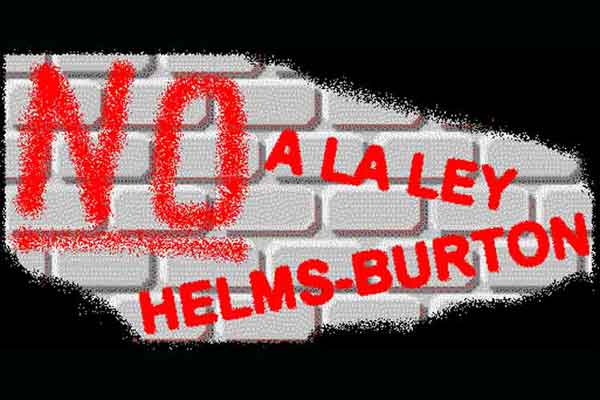 For more than twenty years,
the Helms-Burton
Act has
guided the interventionist efforts of anti-Cuban sectors in the
U.S. to attack the Cuban nation and undermine its sovereignty. By
virtue of its implementation, hundreds of millions of dollars
have been allocated to subvert Cuba's internal order, and
countless measures have been proposed to bring about regime
change. Its economic impact has seriously affected the country's
development efforts as well as the population's well-being. Its
humanitarian impact has not been greater thanks to the social
justice system that prevails in Cuba.
For more than twenty years,
the Helms-Burton
Act has
guided the interventionist efforts of anti-Cuban sectors in the
U.S. to attack the Cuban nation and undermine its sovereignty. By
virtue of its implementation, hundreds of millions of dollars
have been allocated to subvert Cuba's internal order, and
countless measures have been proposed to bring about regime
change. Its economic impact has seriously affected the country's
development efforts as well as the population's well-being. Its
humanitarian impact has not been greater thanks to the social
justice system that prevails in Cuba.
The attempt to fully implement Title III has been promoted despite the opinion of important U.S. government agencies and as a consequence of the power and influence achieved within the government by persons whose political careers have been marked by an impotent resentment of Cuba and relied on the use of lies and blackmail.
Most U.S. public opinion has consistently opposed the economic blockade, according to highly qualified polls.
History records with sufficient clarity that neither the economic blockade policy nor the bilateral problems between Cuba and the United States originated from the fair nationalizations that were carried out by the revolutionary government, according to the law and its legitimate right. The U.S. government's military, economic and terrorist aggressions against Cuba started before the fundamental actions of nationalization of U.S. properties started.
It is a well-known fact that the nationalization of all foreign properties, including American properties, had a legal commitment to pay a compensation, which the U.S. government refused even to discuss, but which the governments of claimants from other countries accepted, and all of whom received appropriate compensation.
The Ministry of Foreign Affairs reiterates the postulates contained in the Law to Reaffirm Cuban Dignity and Sovereignty (Law No. 80) and emphasizes that the Helms-Burton Act is illegal, inapplicable and is void of any value or legal effect. Consequently, any claim filed under this law by a natural or juridical person, regardless of their citizenship or nationality, will be rendered null.
The Cuban government reserves the right to respond in due time to this new aggression.
Havana, January 17, 2019
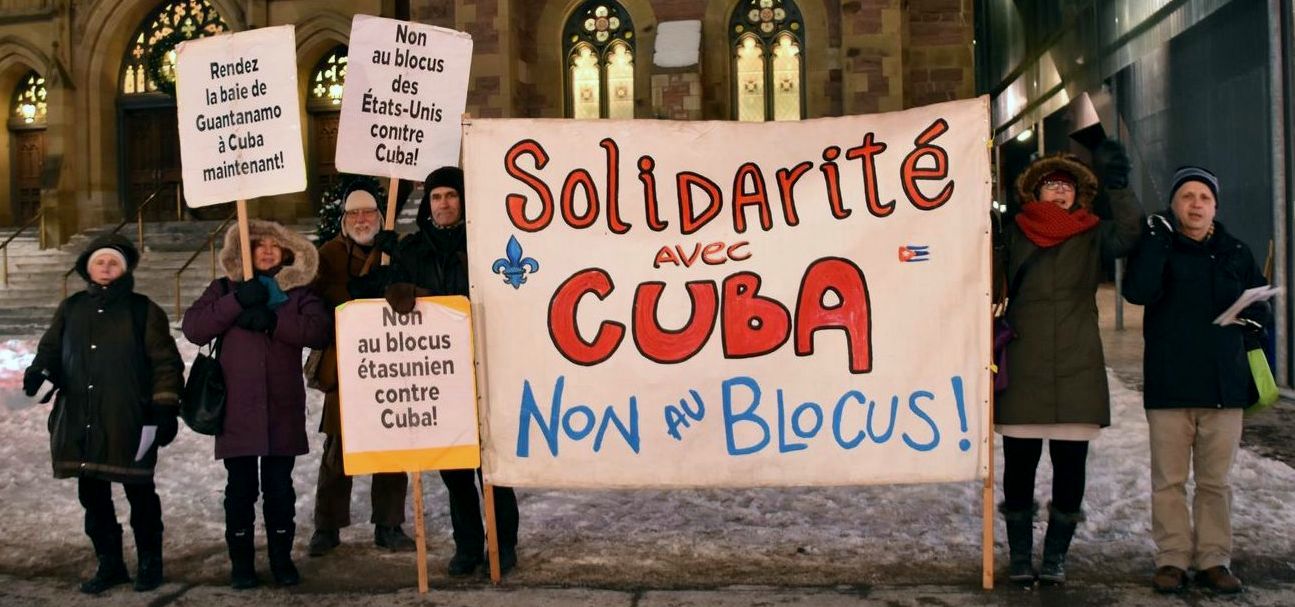
Monthly picket in Montreal, January 17, 2019.
(Cubaminrex. Edited slightly by
TMLW
for
style and clarity.)
Mexico
New Government Takes Office
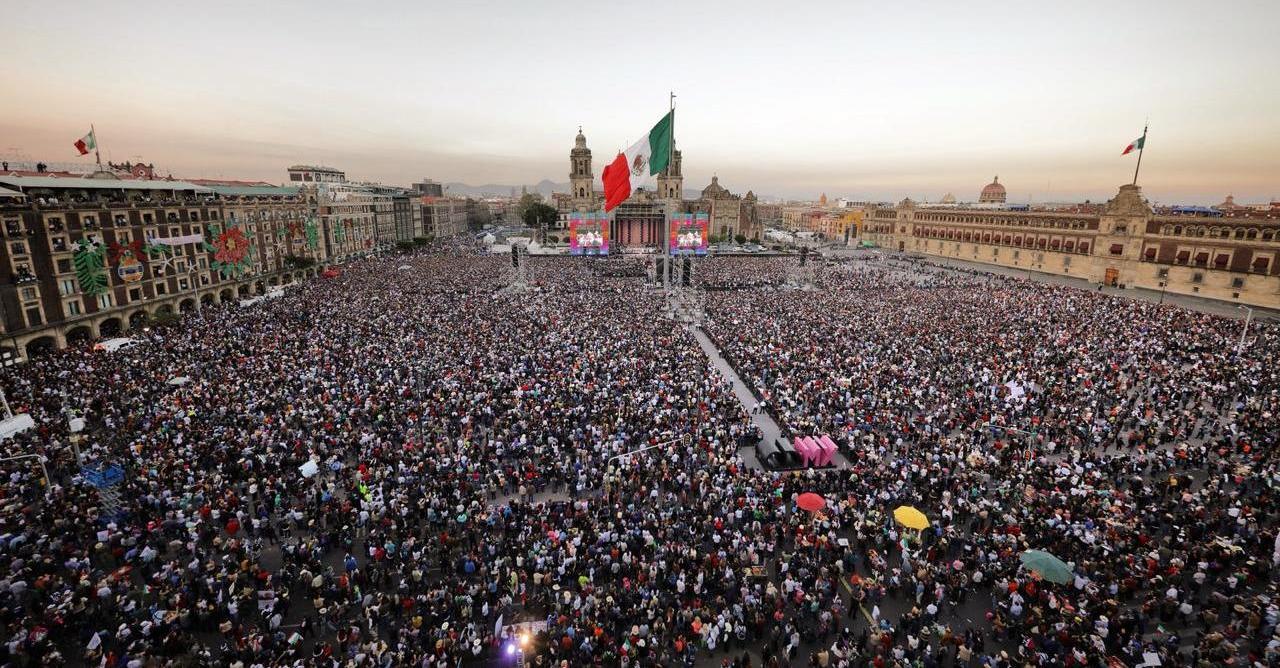
Ceremony in Mexico City’s Zócalo, in which
Andrés Manuel
López Obrador receives the command staff from Mexico's
Indigenous peoples, following his official investiture as the new
President of Mexico, December 1, 2018.
The new President of Mexico Andrés Manuel López Obrador (AMLO) took office on December 1, 2018 on his third attempt and after two huge electoral frauds in 2006 and 2012. His central promise has been to end corruption.
Mexico is going through times of change. The population finally decided to end the regime of the so-called PRIAN (the Institutional Revolutionary Party (PRI) and the National Action Party (PAN)) that dominated national politics in recent decades and promoted neo-liberalism. Since 1976, the IMF and the World Bank have dictated Mexico's economic policy to favour the U.S. In 35 years, foreign investment went from $10 billion to $600 billion and the external debt went from $3.6 billion to $450 billion. The country was mortgaged off.
Oil, electricity and energy in general were privatized: telephones, railways, ports, airports, steel, beaches, banks, television channels, etc., until the state sector almost totally disappeared. The mining plunder by Canadian and other companies is huge. In 300 years of colonialism, the Spanish took 190 tons of gold. Currently, in ten years from 2006 to 2015, corporations took 774 tons of gold and paid only 1.8 per cent in taxes.
|
|
NAFTA was signed, which led to the dismantling of the economy, devastation of the countryside, and the skyrocketing migration that drove 10 million Mexicans to the U.S., leading to the vertiginous increase in drug trafficking, with the crime and insecurity which it entails. The currency was devalued tremendously, going from 12.5 pesos for a dollar in 1976 to the equivalent of 20,000 today (after removing three zeros).
The final six-year mandates of each of the PAN and the PRI, making up a 12-year period that ended in 2018, saw 200,000 deaths and 30,000 disappearances in Mexico. Entire regions of the country, such as Tamaulipas and Veracruz, passed into the hands of criminals.
The population could take no more and, in 2018,
53 per
cent
of voters, with 30 million votes, gave an overwhelming victory to
Andrés Manuel López Obrador and his Morena party
that now
controls the Congress and five state governments. These factors
plus Morena's majority in numerous state congresses gives AMLO a
power no Mexican president has been able to count on in a long
time.
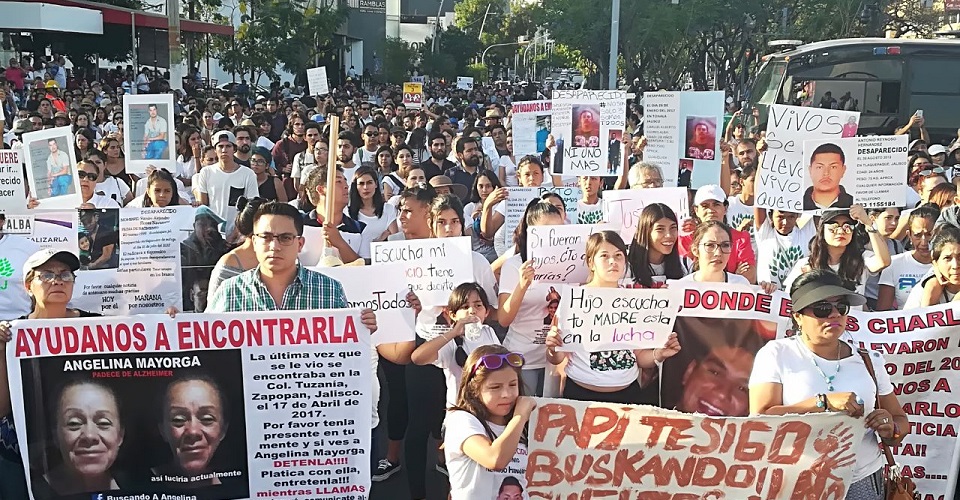
Protest against mass killings in disappearances under the prior
PRI and
PAN governments,
Jalisco state, May 4, 2018.
Foreign policy has taken a new turn with the new government that refused to join the Lima Group in its condemnation of Venezuela, respecting the sovereignty of the Latin American country and upholding the principle of non-intervention.
The new government launched an austerity campaign lowering the salaries of top officials, eliminating superfluous expenses, selling the $7-billion-peso presidential airplane, relinquishing the Los Pinos residence (the president's official residence and office), and cutting government spending. The costly project of the New International Airport was cancelled and the exorbitant pensions received by the former presidents were eliminated.
The theft of gasoline gave officials, union
leaders,
and criminal groups a windfall of 100 billion pesos. An
aggressive
campaign against this theft has caused shortages, but the
population
supports the measures.
With the money saved, pensions for the elderly will be doubled, and scholarships for 10 million young people and one million people with disabilities will be offered. As well 2.6 million young people will receive allocations to be trained in work for large companies, which after a year have the option of hiring them.
For the first time in decades, the minimum wage increased by 16 per cent, lower wages were increased, pensions doubled and there are credit programs for small businesses.
The new President has promised not to modify the macroeconomic model at all, and remains on good terms with the IMF and the World Bank. With the U.S. and Canada, he endorsed the signature of the USMCA (the new NAFTA, despite the prior version causing so much damage to Mexico) and continues to promote foreign investment. For example, he announced a $154-million investment by the transnational Nestlé, provoking protests by Veracruz coffee growers. With regard to the privatization of oil, this has been slowing down and AMLO has talked about reviewing the contracts.
Twenty years ago, the banking fraud that we paid for with the Banking Fund for the Protection of Savings (FOBAPROA) amounted to 600 million pesos. We have now paid more than 2 billion pesos and owe 70 per cent more: 1.8 billion pesos. In 2019, 51 million pesos will be paid to the banks while those who committed fraud will not be punished and the banks will continue to be "rescued."
|
|
The debt already amounts to 10 billion pesos and this year they will pay 750,000 million pesos to service it -- a stratospheric amount. With the PRI regime, the external debt increased from $40 million in 1940 to $3.6 billion in 1970 and then from $85 billion in 1982 to $445 billion today. AMLO has promised not to increase indebtedness, but has assumed all previous commitments.
The situation in Mexico is complex and the new government advances in the midst of contradictory measures. Great resistance is expected from the oligarchy and the corporations and we will see what the new measures of the government and the Morena Congress with its majority will be. A characteristic of the current government is that in order to take the measures it considers necessary, it implements national consultations, and it seems that it will follow this line. There will be a consultation in March to decide whether or not to act against the ex-presidents Peña, Calderón, Fox, Zedillo and Salinas de Gortari.
AMLO has already announced that he will go down
in
history like
Juarez and Cárdenas. Juarez expropriated the land from the
Church, suspended payments on the debt, led the Reformation
revolution and expelled the French invaders. Cárdenas
confronted
fascism and the U.S., nationalized the oil industry, distributed
18
million hectares to the peasants and also suspended payments to
service the debt. We will see what happens in Mexico in the
coming years.
|
Nicaragua
U.S. Imperialism
Activates Its Regime
Change Apparatus
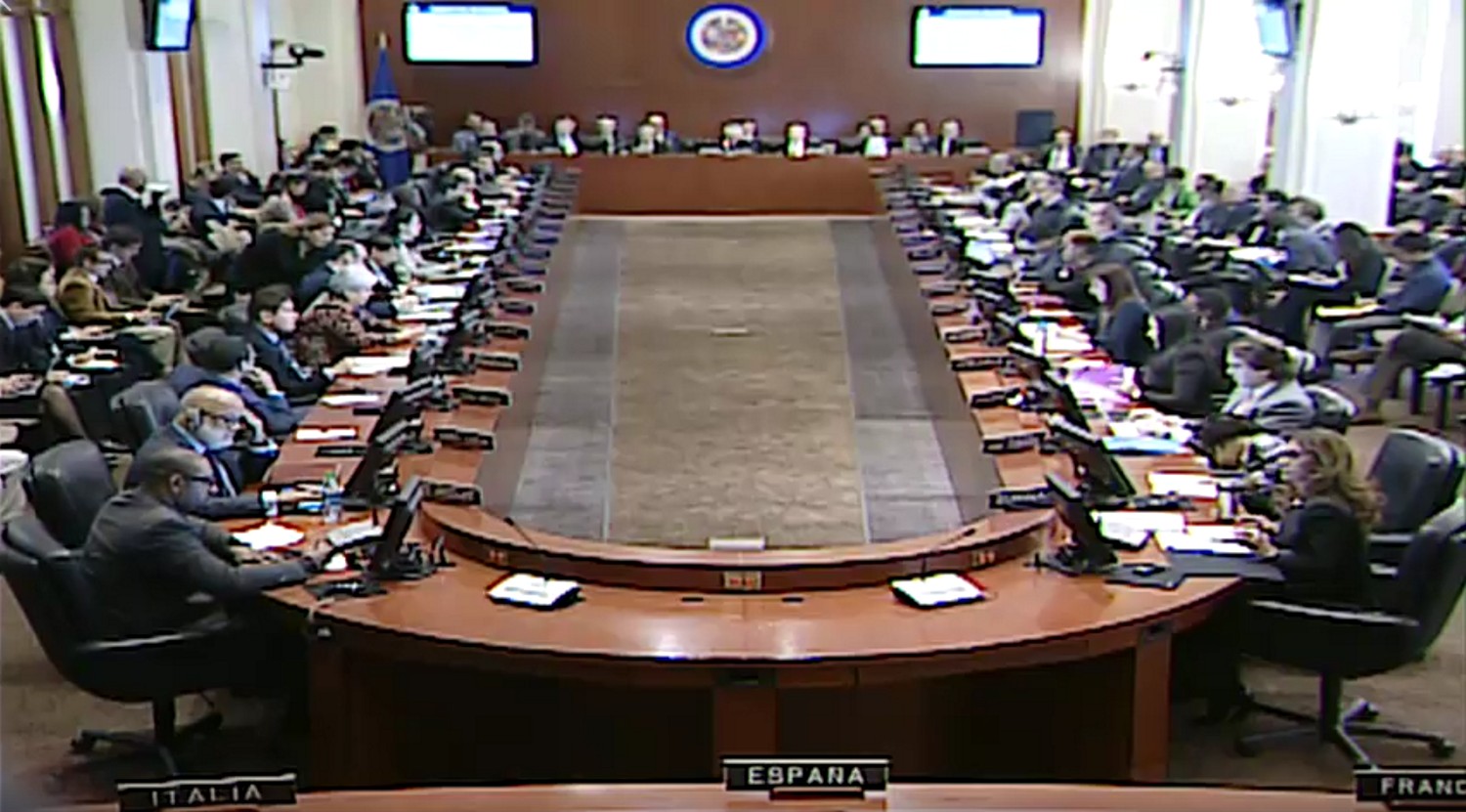
Organization of American States' Permanent Council holds
Extraordinary
Session
on Nicaragua, January 11, 2019.
On December 24, 2018, just as many were beginning
holiday celebrations, the Permanent Council of the Organization
of
American States (OAS) issued a notice to its members of a special
meeting being held on December 27 at the request of Argentina,
Brazil,
Canada, Chile, Colombia, Peru, and the United States "to consider
the
situation in Nicaragua.” The meeting was called
within days of
the release of a report by the OAS-linked Inter-American
Commission on
Human Rights (IACHR) relating to violent events that occurred in
the
country between April 18 and May 30, 2018.
The sudden outbreak of a "student" protest on April 18 was
allegedly in
response to social security reforms affecting the pensions of
seniors
introduced by the government as an alternative to the harsh
measures
called for by the IMF to address a deficit in the pension fund
(which
the government then withdrew, in spite of having the support of
pensioners, to try to quell the protest). The protests however
escalated and spread to different parts of the country, quickly
turning
to killings and violent acts of all kinds, widespread destruction
of
property and the setting up of roadblocks, accompanied by demands
for
President Daniel Ortega to "leave." These events were routinely
portrayed by opposition-controlled media inside Nicaragua and the
monopoly media internationally as "peaceful" protests that were
responded to by students being brutally massacred, leading to a
nationwide protest movement supported by most of the population,
which
the government put down through wholesale human rights abuses.
Anything
that contradicted this narrative was ignored or dismissed
regardless of
the facts in the IACHR’s report of its
“investigations.”
What took place for almost three months beginning
in
April was
in
fact reminiscent of the way violent foreign-backed opposition
groups rampaged in Venezuela in 2014 and again in 2017 in failed
attempts to bring down President Nicolás Maduro and the
Bolivarian government. And that is no accident, nor is the fact
that
the U.S. has put a cabal of governments, institutions, agencies
and
organizations that it controls or dominates, including a whole
“human
rights” apparatus, into action to wage a coordinated
offensive against
Nicaragua's Sandinista government like the one it has been waging
against the Bolivarian government of Venezuela and revolutionary
Cuba.
This is the context within which the neutral-sounding Working Group on Nicaragua was put in place at the OAS. It is no coincidence that the governments that came forward to be part of it are the very ones trying to isolate and force regime change in Venezuela via the illegitimate Lima Group.
The Working Group did not take long to show its colours, collaborating with the imperialist agent serving as the Secretary General of the OAS who announced at the December 27 special meeting that he was "forced" to initiate a process to activate Article 20 of the Inter-American Democratic Charter against Nicaragua, alleging that the constitutional order had been broken and the government had committed crimes against humanity.[1]

Nicaraguans celebrate the 39th anniversary of Sandinista
Revolution,
Managua, July 19, 2018.
Banner reads: "Nicaragua Wants Peace! Forward Daniel!"
This activity at the OAS follows a number of hostile moves by the U.S. In September, when the former U.S. Ambassador to the UN, Nikki Haley, was serving as Chair of the Security Council she attempted without success to get a resolution passed against Nicaragua there. Then in November the U.S. put into place increased financial, economic and other sanctions against the government of Nicaragua and Nicaraguan individuals under its Nicaragua Investment Conditionality Act (NICA). At the same time President Donald Trump signed an executive order declaring the Ortega government "an unusual and extraordinary threat to the national security and foreign policy of the United States." To which the Nicaraguan government responded stating, "We categorically reject the historical continuity of the interference and interventionist policy of the U.S. imperial power against Nicaragua," adding that "we declare all accusations that ratify the imperialist perspectives and practices of the United States of America as inadmissible, disrespectful, false and illegitimate."
|
|
January 11 was the latest special meeting of the
OAS
Permanent Council at which Nicaragua was the subject. Canada, as
Co-Chair of the Working Group delivered its report, calling the
situation in Nicaragua "grave" and referring to an alleged
erosion of
democracy, the lack of human rights, attacks on "credible NGOs"
and
lack of respect for the rule of law -- signalling an intent to
recommend international intervention following steps outlined in
the
Democratic Charter. Nicaragua's Foreign Minister, Denis Moncada
strenuously objected to the holding of the meeting and called
initiation of the process to apply the Democratic Charter against
Nicaragua illegal and illegitimate. He denounced the aggression
and
machinations of the U.S. to force a de
facto regime change on Nicaragua as well as on Venezuela
and
Cuba. Similar positions were taken by representatives of
Venezuela and
Bolivia who also spoke. There was no vote held or decision taken
at the
meeting but it was the recommendation of the Working Group that
the
matter continue to be studied and that another meeting be held to
consider what action to take.
TML Weekly
calls
on Canadians to take a stand against this brutal U.S. imperialist
campaign and to oppose attempts to promote it in Canada. The
principle
of non-intervention in the affairs of sovereign countries, which
even
the OAS purports to stand for, requires that the people of each
country
be able to control the decisions that affect their economy as
well as
their social, cultural and political affairs free from outside
interference. Those who are promoting this campaign in Canada
would do
better to contribute to making sure Canadians can exercise
control over
the decisions which affect their lives at home instead of
promoting
counterrevolution abroad in the name of freedom, democracy and
human
rights. To support imperialist plans for regime change
anywhere,
regardless of the pretext, is not an honourable pursuit.
Note
1. The Inter-American Democratic Charter was adopted on September 11, 2001 by a special session of the General Assembly of the OAS in Lima, Peru. It was drafted behind the scenes by the U.S. and Canada without submitting its guiding principles or specific points for discussion or approval by the parliaments of the member countries of the OAS, let alone the citizenry. TML wrote at the time: "The U.S. imperialists, with the support of the Canadian ruling circles, are striving to put in place [...] legal mechanisms to provide for economic sanctions, political isolation, interference and intervention and even outright military invasion of any country which does not submit to the U.S. imperialists' dictate -- all in the name of strengthening 'democracy.'"
Article 20 reads:
In the event of an unconstitutional alteration of the constitutional regime that seriously impairs the democratic order in a member state, any member state or the Secretary General may request the immediate convocation of the Permanent Council to undertake a collective assessment of the situation and to take such decisions as it deems appropriate.
The Permanent Council, depending on the situation, may undertake the necessary diplomatic initiatives, including good offices, to foster the restoration of democracy.
If such diplomatic initiatives prove unsuccessful, or if the urgency of the situation so warrants, the Permanent Council shall immediately convene a special session of the General Assembly. The General Assembly will adopt the decisions it deems appropriate, including the undertaking of diplomatic initiatives, in accordance with the Charter of the Organization, international law, and the provisions of this Democratic Charter.
The necessary diplomatic initiatives, including good offices, to foster the restoration of democracy, will continue during the process.
(Photos: OAS, Canal 2, M. Blumenthal)
Unravelling a Plot
As early as 2016, talk of war against Nicaragua could again be heard in Miami, at a time when the streets of this nation were a regional example of security, peace, and prosperity, where a hardworking, tranquil people proudly enjoyed the social and economic advances achieved by the Sandinista government, that had established a national consensus, in the wake of one of the worst interventions carried out by the United States in Central America.
With no justification whatsoever -- when the news from Nicaragua around the world was about a proposed inter-oceanic canal that would boost the economy and impact global navigation -- Congress members who make a living off the U.S. war against Cuba and Venezuela were mounting efforts to reverse the prosperity and calm that reigned in the land of Augusto César Sandino.
Congress members, first in the House of Representatives and later the Senate, introduced a bill to create obstacles to the awarding of international loans to Nicaragua, hamper foreign investment, and put a brake on socio-economic development in the country. This imperialist punishment, cooked up by the worst of the anti-Cuban mafia in 2015, set in motion the fabrication of a pretext regarding the alleged lack of democracy, justified as a way to "guarantee electoral transparency and fight corruption." The result of this initial maneuver was the Nicaraguan Investment Conditionality Act of 2017 (NICA).
Ileana Ros, Albio Sires, Marco Rubio, Ted Cruz, and others, among the most reactionary legislators in Congress from South Florida, Texas, and New Jersey, are again attempting to reinvent the Contras and get rid of the Sandinista government, which has repeatedly shown at the polls that it enjoys the people's majority support.
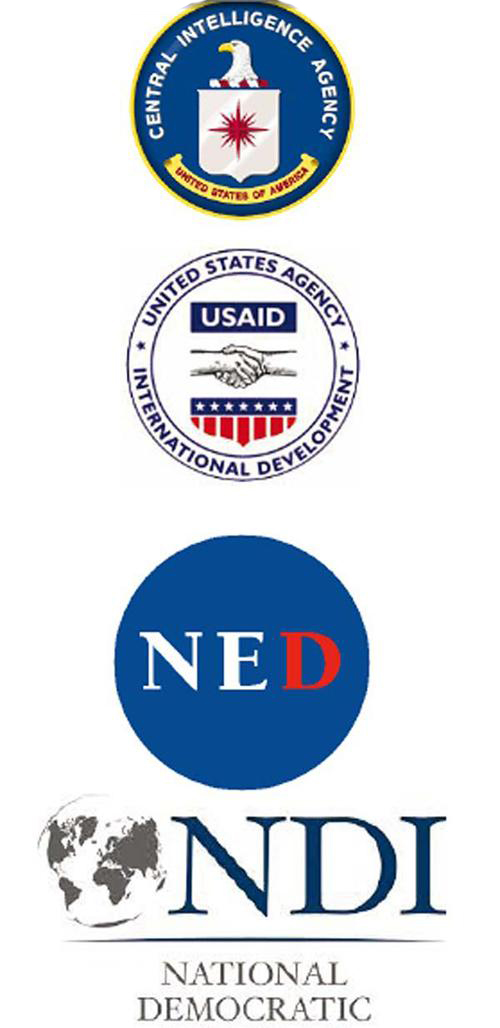 The tentacles of this subversive plot go
beyond
the capital,
since these forces are well connected to the United States'
coup-manufacturing machinery, and laid the foundation for a media
campaign in coordination with agencies specialized in carrying
out dirty wars and soft coups, working with U.S. intelligence and
the CIA, in particular.
The tentacles of this subversive plot go
beyond
the capital,
since these forces are well connected to the United States'
coup-manufacturing machinery, and laid the foundation for a media
campaign in coordination with agencies specialized in carrying
out dirty wars and soft coups, working with U.S. intelligence and
the CIA, in particular.
In this specific case, international press media have documented the participation of the U.S. Agency for International Development (USAID); the National Endowment for Democracy (NED); and the National Democratic Institute (NDI), as well their sub-contractors, which have been working meticulously, since Daniel Ortega was first elected, to re-invent a "new leadership," selectively infiltrating key sectors of the economy, targeting youth, students, medium and small businesspeople, environmental and feminist groups, among others, to undermine the foundation of support for the Sandinista government.
It is revealing that on April 16, [2018], following the same line espoused by anti-Cuban Congress members, USAID Administrator Mark Green announced that the U.S. government would continue supporting the participation of a "free genuine" civil society in Nicaragua, after stating that the United States is concerned about the closing of democratic spaces in Nicaragua, "systematic" violations of human rights, and government corruption.
In March, Representatives Ileana Ros-Lehtinen and Albio Sires sent a letter to Green, in which they call on the U.S. government to reverse its decision to provide "zero aid" to Nicaragua through USAID for the fiscal year 2018-2019, while at the same time calling on the agency to avoid supporting "members of the private sector linked to corruption, money laundering, or the Daniel Ortega regime."
At the end of 2008, the media reported that USAID had provided at least a million dollars in Nicaragua that year to NGOs, radio broadcasters, and political groups like the Communications Research Center (CINCO), to intervene in municipal elections.
This financing, as was denounced at the time, contributed surreptitiously as "small donations," that were not to exceed $25,000, was part of a large scale U.S. plan to overthrow the government of Daniel Ortega, carried out since then by internal agents from the Nicaraguan right.
The strategy mounted to discredit the Sandinista government in the media was conducted via two financing routes; one directed by USAID and the Casals & Associates firm, and another managed by the so-called Common Fund in Europe, which provided funds to organize campaigns and mobilizations to destabilize the government.
By 2008, media in Nicaragua had identified at least 14 subversive projects run by USAID across the country, under the cover of a wide range of titles and objectives, made possible by this funding.
Another key element of the U.S. machinery linked to the CIA is the National Democratic Institute, an instrument dedicated to promoting "change" that focuses on "empowering" so called "agents of change" in countries with governments not to Washington's liking.
A Swedish journalist reported, this past June 4, that three students from Nicaragua were conducting a tour of Europe to raise support for a plot against the Sandinista government, stating that at least one of the youth represented an organization created and financed by the United States.
Jessica Cisneros, he reported, was active around the issue of the involvement and participation of youth in political processes, and was a member of the Movimiento Cívico de Juventudes (Civic Youth Movement).
Another of these "agents of change" promoting hate for the Sandinista government and support for a coup, was Yerling Aguilera, from the Polytechnic University in Managua (UPOLI) and specializing in research on revolution and the feminist movement, who, according to the reporter, has been an employee and consultant for the Institute of Strategic Studies and Public Policy (IEEPP) in Nicaragua, that works to "strengthen the abilities of political, state, and social actors for a better informed public via creative, innovative services," which has received $224,162 from the National Endowment for Democracy (NED) between 2014 and 2017.
The NED has distributed some $4.2 million in Nicaragua, over this three-year period.
The USAID, NDI, and NED have been busy in the country, with thousands of activists trained to "change society." Hundreds of NGOs, universities, and political parties have received funds and materials as part of the subversive plan that was not conceived to advance through traditional political organizations, but rather those invented to give the impression that they emerged "spontaneously" from dissatisfaction, hiding the true interest of the North at work.
Although efforts were intensified after Ortega's 2006 electoral victory, since 2015, with the approval of the NICA, U.S. agencies increased and broadened financial support and resources for their "agents of change" in Nicaragua, above all through leadership courses and money for young people in universities, NGOs, and political parties.
In their political, diplomatic, and media advice to the coup-plotters, Washington has insisted on demonizing Daniel Ortega and his government, an effort carried out not only by the White House, and its agencies, allies, satellites, and mercenaries, but also the corporate media monopolies and fabricators of lies, which magnify internal problems and accuse authorities for all types of human rights violations, totally omitting the crimes and destruction committed by individuals who have been "empowered" by the USAID, NDI, NED, and CIA, who have caused the failure of talks and calls for peace. As is the case in Venezuela, Donald Trump and his advisors, architects of a thousand invasions, do not believe in dialogue or pacts, opting for war on all fronts.
Nicaragua has become the epicenter of U.S. warmongering efforts, hand in hand with Anti-Cuban legislators and profiteers, and other veteran hawks. Washington is attempting to re-invent its strategy at the cost of human lives and destruction in the streets of Nicaragua.
USAID'S Thinly Disguised Subversion Projects in Nicaragua
- Citizen participation in electoral processes
- Developing a culture of transparency among Nicaraguan youth
- Communications training for students to produce stories that promote self-efficacy
- Multimedia for democratic governability
- Strengthening civil rights of women and youth in Masaya
- Citizen action legal framework for journalists
- Active participation for Nicaraguans exercising their right to vote
NDI Tentacles
- Since 2010 the NDI has been associated with Nicaraguan universities and civic organizations conducting a youth leadership program which has helped prepare more than 2,000 "youth leaders," and worked to increase the political influence of women, LGBT persons, and electoral processes
- The Movimiento Cívico de Juventudes (MCJ) is an organization financed, created, and part of the NDI.
- Several members of the group graduated from the NDI program earning a Certificate in Leadership and Political Management (CLPM).
(Granma, June 29, 2018)
Legitimacy and Human Rights
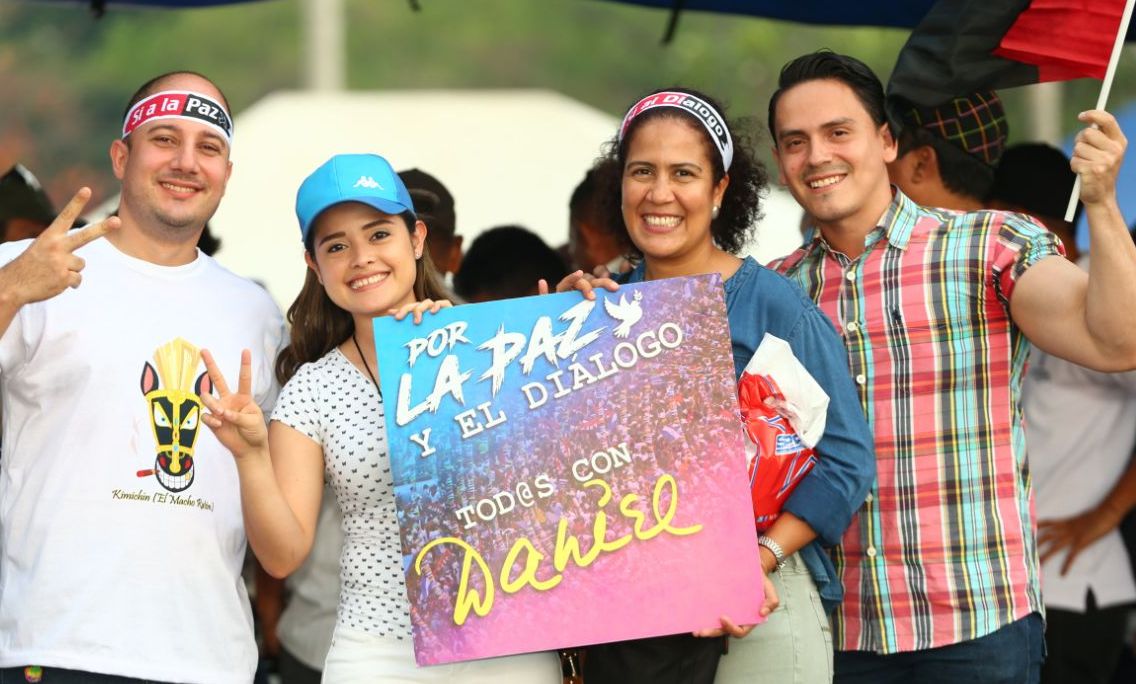
Rally for Peace, Managua, May 5, 2018. Banner reads: "For peace
and
dialogue.
Everyone with Daniel [Ortega]."
The murder of Miguel Ramos on July 3, 2018 focuses many aspects of the current crisis in Nicaragua to do with conflicting claims of legitimacy involving fundamental issues of civil and political rights and social and economic rights. In 1978 and 1979, as a teenager in the Carlos Fonseca Northern Front guerrilla column, Miguel fought for Nicaragua's sovereign independence. On July 3 he died for that same cause, gunned down by supporters of the U.S.-backed right-wing coup in progress against the Sandinista government of President Daniel Ortega. Miguel was one of a group of civilians helping the authorities clear an opposition roadblock at La Trinidad on the Panamerican Highway about 20km south of Esteli.
On July 3, Carlos Ascencio, El Salvador's ambassador, published an appeal on behalf of all the Central American ambassadors in Nicaragua to clear similar roadblocks in Jinotepe. His letter provides independent corroboration of the violent intimidation and extortion practised by opposition gangs who have operated these roadblocks for two months, strangling Nicaragua's economy and abusing people's basic rights.
Ascencio denounces the effective detention of 400 truck drivers and their vehicles near the town of Jinotepe for over a month. The drivers, from all over Central America, have been threatened and their vehicles damaged. The political opposition activists operating the roadblocks refuse to liberate the trucks and their drivers because "they are our protective shield and negotiating card to support our demands in the dialogue."
A Focus for Murder
That is just one of the innumerable gross human rights abuses by the right-wing opposition forces promoting the attempted coup in Nicaragua. For two months the road blocks, operated by opposition paramilitaries and paid thugs, have been a focus for murder, torture, kidnapping, intimidation, extortion and criminal delinquency. Supporters of the coup turn that reality upside-down, blaming the resulting violence on the government. In their upside-down world, ordinary citizens organizing to defend their rights against armed and violent opposition gangs metamorphose into 'Sandinista paramilitaries.'
In the case of Miguel Gomez, the opposition have already portrayed the incident in which he died as a government paramilitary attack on peaceful protesters. They will add Miguel's death to the tally of their own casualties, even though he died at their hands. Abundant documentation and audio-visual evidence exists now disproving categorically the constant falsehoods propagated by U.S.-funded opposition human rights organizations and local Nicaraguan opposition media. The original list of 55 deaths, proclaimed with such theatre on the first day of the National Dialogue, has been completely debunked. There was never any 'student massacre.'
Sadistic Violence
Other material exposes media and NGO manipulation of opposition marches, or the deaths of women during the crisis. Numerous videos demonstrate the sadistic violence of opposition activists. Various writers like Alex Anfruns have explained the systematic pattern of media distortion and manipulation of opposition attacks and abuses reported by opposition media and NGOs as government human rights violations. No Western corporate media and only a handful of alternative media publish this material or any version challenging the demonstrable false witness of Amnesty International and the Inter-American Commission for Human Rights (IACHR).
Just as in the case of Venezuela, those organizations have failed to investigate impartially any of the incidents they report, merely recycling the version already prepared for them by U.S.-funded local NGOs and media and ignoring or rejecting documentation from the Nicaraguan authorities out of hand. IACHR Director Paulo Abrao effectively disqualified himself as an independent arbitrator during a visit to Nicaragua last May, when he was recorded publicly declaring his support for the opposition. The investigative process accompanied by a group of IACHR experts had not even begun when, on June 22, the IACHR presented their final report to the OAS Permanent Commission.
Blatant Political Bias
Perhaps as the political price of avoiding -- at least for the moment -- the kind of all-out economic and diplomatic assault applied to Cuba and Venezuela, the Nicaraguan government has accepted these gross methodological irregularities and the blatant political bias of the OAS and its IACHR subsidiary. For its part, the Comission for Truth, Justice and Peace appointed by the National Assembly has actively sought an exchange of information with the opposition human rights organizations. As Commission member Cairo Amador has explained, "It's a matter of everyone providing their data and their versions so, in the end, everyone contributes to getting at the truth."
But as Esteli Mayor Francisco Valenzuela has pointed out, the effects of the attempted coup are much broader than the civil rights violations: "The damages can definitely be classified in order of importance. First, the suffering and the victims that we all lament. Secondly, everything to do with the economy and with people's freedoms, the roadblocks that impede freedom of movement and have affected employment. The inability to move goods and products for export has caused enormous financial losses. Tourism has suffered nationally and locally, especially small businesses. Most businesses in Nicaragua are small or medium-sized and have been very badly affected. A lot of business have closed." Economy Minister Ivan Acosta has stated: "Growth projections for the economy were 4.5 per cent to 5 per cent, but now we think the economy is not growing. 200,000 jobs have been lost, which affects social security, trade, domestic demand and real productive activity."
Extensive Losses
Nicaragua's municipal authorities report losses to vehicles, machinery and equipment of over U.S.$10 million and to buildings and infrastructure of over U.S.$112 million. The country's technical training institute reports losses of U.S.$80 million. The Ministry of Education reports over 60 schools attacked and damaged. A preliminary Ministry of Health report in June reported 55 ambulances destroyed or damaged, as well as other damage to hospitals and health centers, all resulting from opposition attacks. The Infrastructure and Transport Ministry also reports extensive losses, for example damage valued at U.S.$1.5 million from just one incident, when opposition activists attacked a plant in Sebaco and destroyed equipment.
|
|
None of that extraordinary level of violence and destruction figures anywhere in the reports by Amnesty International or the IACHR, nor the abuse of the basic rights of the government workers and local population involved. Similarly, neither those organizations nor the Western media have reported the role of criminals contracted to operate the opposition roadblocks and carry out attacks. On June 30, Nicaraguan police arrested Salvadoran mara leader Oscar Rivas Carrillo [maras are drug trafficking gangs -- TML Ed. Note], who confirmed he and other criminals were being paid to operate roadblocks, carry out murders, burn public buildings and attack economic targets. Rivas and other criminals worked jointly with opposition activists supported by right-wing business interests, U.S.-funded NGOs, right-wing political parties and the Catholic Church.
Clearly, Amnesty International and the IACHR have deliberately covered up that reality and misled international opinion, faithlessly exploiting their image as defenders of human rights, just as they do on Venezuela and Cuba. Even so, despite the extreme violence and the egregious dishonesty of its apologists, the U.S.-backed right-wing opposition coup to oust President Daniel Ortega has failed. People in Nicaragua overwhelmingly support efforts to return to normality and a political solution to the crisis. The Nicaraguan authorities will tolerate the IACHR's theatrics for another few months before the OAS circus eventually moves on. Defeated opposition leaders hoped to impose their coup, failed because they lacked popular support, and now have to accept what the Sandinista government is prepared to agree as the sovereign power in Nicaragua. Miguel Ramos did not die in vain.
(Tortilla con Sal, July 4, 2018. Photos: J. Caijino, M. Blumenthal.)
Venezuela
The Constitutionally Elected President of the Bolivarian Republic of Venezuela Is Nicolás Maduro

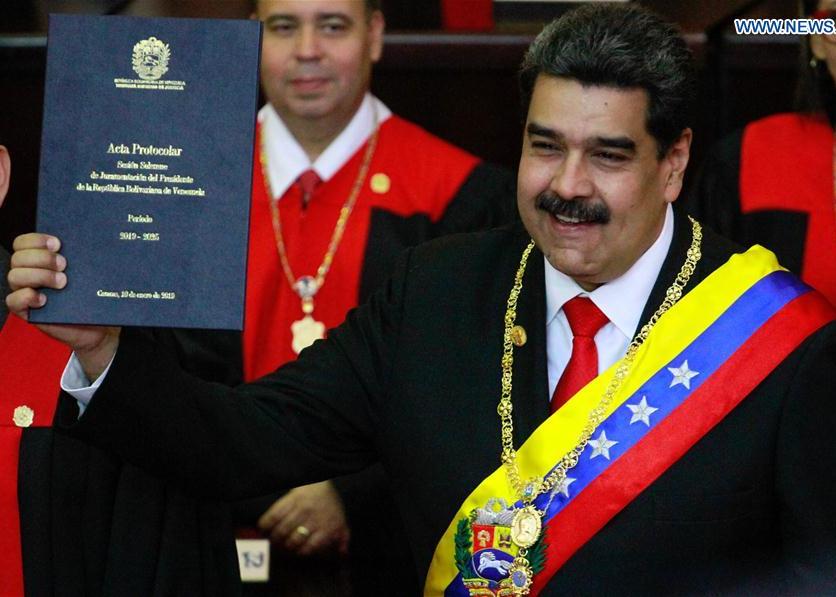
Nicolás Maduro is sworn into office for a second six-year
term,
January 10, 2019.
The Communist Party of Canada (Marxist-Leninist) condemns the antics of the counter-revolutionary forces in Venezuela backed by the U.S. imperialists and their allies -- calling themselves the Lima Group, in which Canada is included -- to overthrow the constitutionally elected president of Venezuela, Nicolás Maduro. President Maduro was re-elected to a second term by the people of Venezuela who are waging a tenacious fight to defend their Bolivarian revolution and the sovereignty of the nation. Because of this they have been forced to face the brunt of the regime change arsenal of U.S. imperialism, its accomplices and appeasers -- the government of Canada among them.
|
|
On January 10, as Nicolás Maduro was being sworn in before the country's Supreme Court, the Permanent Council of the Organization of American States (OAS) meeting in Washington passed a resolution saying it did not recognize President Maduro's second term because it was the result of an "illegitimate electoral process." The resolution was approved by 19 member states and opposed by six, with eight abstentions and one absence. A declaration by 13 of 14 member states of the Lima Group which operates outside of the OAS, went further. They called on President Maduro not to assume the office for which he was elected but to hand over power until new elections could be organized to the Opposition-controlled National Assembly, a body that for the last three years has been in a state of judicial contempt for refusing to recognize the authority of the country's Supreme Court.
Speaking on behalf of the Trudeau government, Foreign Minister Chrystia Freeland tried to justify Canada's role in this sordid affair by repeating the falsehood that the National Assembly is Venezuela's "only remaining democratically-elected institution."
All this spurious activity is part of an escalating U.S. campaign, with Canada playing a key supporting role, to foment a coup d'état and incite civil war in Venezuela. Part of the plan involves setting up a puppet "parallel" government and declaring it to be the only competent body for carrying out the affairs of state. This year's president of the National Assembly and his party have already made it clear that their allegiance is to their U.S. benefactors and what they call "the international community."
As the coup-plotters conspired against Venezuela in Washington in the name of "the international community," President Maduro took his oath of office in Caracas accompanied by delegations -- several of them led by heads of state -- from over 90 countries and international organizations, validating what he said in his inaugural speech -- that there is a world out there "much bigger than the U.S. empire and its satellite governments."
Roadmap for Regime Change Adopted by
Foreign-Sponsored
Parallel Government
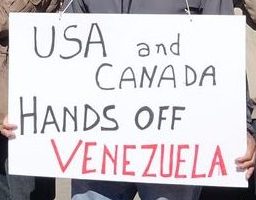 One of the first
marching
orders its foreign sponsors gave to
the puppet Opposition "transition" government was that it adopt a
roadmap for regime change bearing the grandiose title, Law
Governing the Transition to Democracy and Re-establishment of the
Validity of the Constitution of the Bolivarian Republic of
Venezuela. On January 16, the neutered National Assembly
adopted its main pillars, starting with a declaration that the
Presidency of the Republic had been "usurped" by Nicolás
Maduro
and as a result all "alleged acts" emanating from the Executive
branch would be repudiated as null and void.
One of the first
marching
orders its foreign sponsors gave to
the puppet Opposition "transition" government was that it adopt a
roadmap for regime change bearing the grandiose title, Law
Governing the Transition to Democracy and Re-establishment of the
Validity of the Constitution of the Bolivarian Republic of
Venezuela. On January 16, the neutered National Assembly
adopted its main pillars, starting with a declaration that the
Presidency of the Republic had been "usurped" by Nicolás
Maduro
and as a result all "alleged acts" emanating from the Executive
branch would be repudiated as null and void.
Some other provisions that were adopted include:
- Amnesty for "political prisoners," a revival of the first piece of legislation the Opposition coalition known as the Democratic Unity Roundtable (MUD) passed in the newly-formed National Assembly of 2016. The law was never enacted because it was disallowed by the Supreme Court. If passed, it would have led to the freeing of criminals convicted of serious offences of all kinds, involving violence, incitement to violence, destruction of property, sedition, etc., on the basis that these were "political acts" for which jailed opposition figures are being subjected to unjust "persecution." The same thing is no doubt contemplated in this law.
- Creation of "legal incentives" for civilians and members of the military going forward to participate in the process "of restoration of constitutional order." This obviously amounts to incentivizing the taking up of arms to overthrow the Bolivarian government and any number of related illicit activities, such as inviting a foreign military intervention.
- The takeover by the illegal and illegitimate parallel government of Venezuela's international relations and dealings of all kinds, "recuperating" for its own use the assets stolen by the U.S. and other governments party to the economic war aimed at suffocating Venezuela's economy in the hope this will lead the people to turn against their government and abandon socialism.
- Opening up the country to foreign intervention in the name of accepting "humanitarian aid" and loans from governments and entities linked to the U.S. project for regime change in Venezuela.
Other measures contemplated in the roadmap include the privatization of public assets and scrapping of certain popular social problems in favour of "promoting economic development" by "civil society acting autonomously to satisfy their own needs."
The actions of the U.S. imperialists and their accomplices and appeasers to split a nation, foment violence, starve a people and spread lies and acrimony are heinous crimes. Nicaragua is now in the cross-hairs of the same gang for similar treatment. It brings nothing but dishonour on the government of Canada to support such things. Canadians have never given their consent for coups, blockades and civil wars to be organized in their name against the people of Venezuela, Nicaragua or anywhere else.
The Venezuelan people's fight to defend their sovereignty and the right to solve their problems in peace, among themselves, free from the dictate of false prophets of "democracy," "human rights" and "the rule of law" is entirely just and deserves everyone's support. For its part CPC(M-L) will continue to stand firmly with the Venezuelan people and their Bolivarian president and government in the fight to defeat the efforts of those who, in the name of restoring democracy and human rights in Venezuela, are conspiring to impose by force a regime favourable to their own interests, not those of the Venezuelan people. It must not pass.
The Fight of the Venezuelan People
Is
Our Fight!
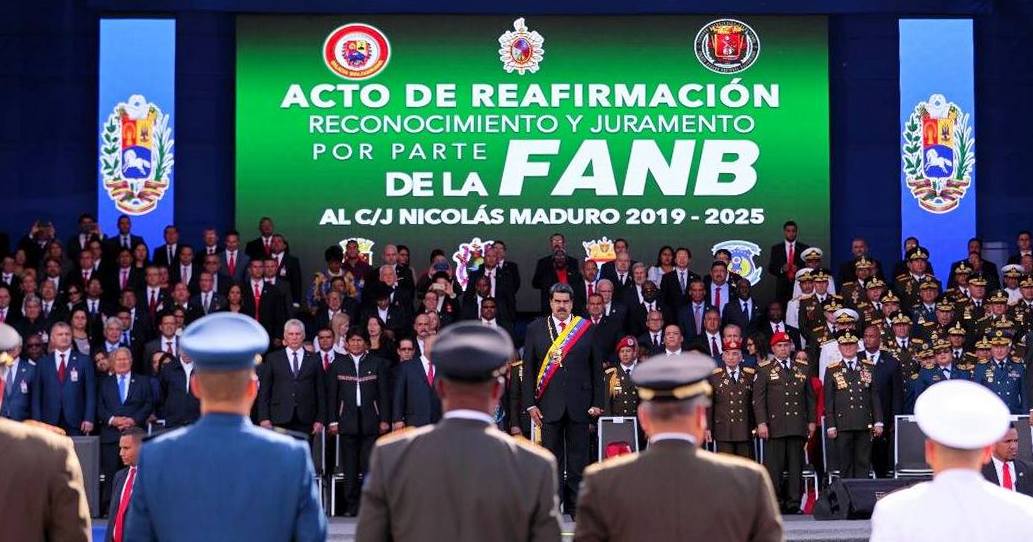
President Maduro takes part in the oath of reaffirmation by the
National Bolivarian Armed Forces.
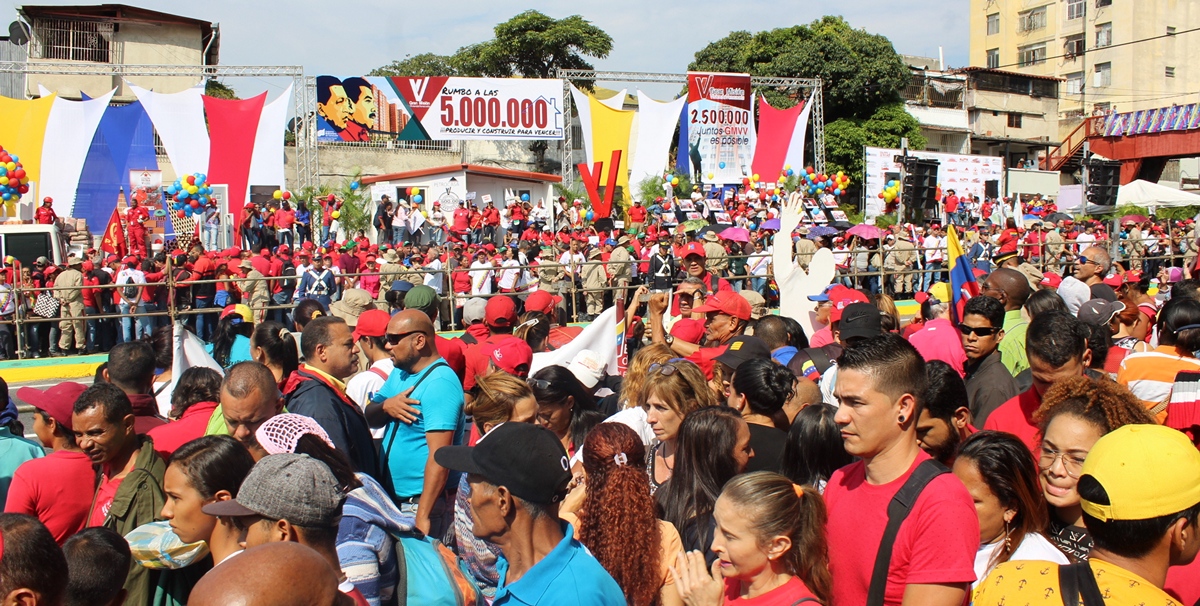
Popular mass rally in Carcacas welcomes President Maduro's second
term.
(With files from Prodavinci. Photos: Government of Venezuela, Xinhua)
Stand with the Venezuelan People and Their Bolivarian President and Government!
No to a U.S.
Imperialist-Inspired
Coup d'État!
Demand that Canada Stop Its Interference in Venezuela's Internal
Affairs!
The Communist Party of Canada (Marxist-Leninist) sends congratulations to the Venezuelan people and their President Nicolás Maduro Moros on the occasion of his assuming office as President of the Bolivarian Republic of Venezuela for a second term on January 10.
It also condemns in the strongest of terms the criminal campaign of U.S. imperialism and its appeasers -- the government of Canada figuring prominently among them -- aimed at forcing regime change in the Bolivarian Republic of Venezuela and removing its democratically elected president.
This month a new offensive has been launched by the Organization of American States (OAS) and its illegitimate offspring known as the Lima Group, with the U.S. pulling the strings behind the scenes while not figuring as a member. The offensive is timed to coincide with the January 10 swearing in of President Nicolás Maduro to his second term in office that will extend to January 2025. He was the candidate for a coalition of parties and was re-elected democratically on May 20, 2018.
On January 10, the day President Maduro assumed office, a special meeting of the Permanent Council of the OAS was called at the behest of the United States and eight members of the Lima Group, including Canada, "to consider the situation in the Bolivarian Republic of Venezuela." No other details were publicly available.
On January 4, a minority of 14 member states of the OAS, acting as the Lima Group,[1] met with U.S. Secretary of State Mike Pompeo participating by video link, after which 13 of them declared that they will not recognize President Maduro's re-election, asserting without any credible evidence, like they did even before the May 20 election took place, that it was "illegitimate." In their statement they expose their intention to provoke a crisis, even a civil war, by provocatively "urging" President Maduro not to assume office on January 10 but to "provisionally transfer executive power" to the National Assembly, controlled by opposition parties, until new democratic elections are held.
The National Assembly, which these regime change forces want to vest with the power normally held by the President of the Republic, was declared to be in a situation of contempt in 2016 for refusing to submit to the authority of the Supreme Court or comply with its orders -- violating the country's constitution, a state it remains in today.
In its statement, the Lima Group also calls on its members to increase punitive measures and sanctions of different kinds against Venezuela, such as refusing entry to their countries to "high level" officials. It asks them to consider pressuring international and regional institutions they are members of to block loans to the government of Venezuela, and urges countries everywhere to adopt coercive measures including economic, financial and trade sanctions like those supported by the Lima Group.
Mexico's new government, to its honour, broke ranks with the coup forces and refused to sign the Lima Group statement. In his own statement to the meeting, Mexico's representative said his country followed a policy of non-intervention and respect for the self-determination of peoples. He said Mexico would not comment on the legitimacy of the Venezuelan government and did not support any route that did not prioritize the promotion of peace and dialogue as opposed to isolating Venezuela and interfering in its internal affairs. In taking this stand, Mexico joined the majority of states belonging to the Caribbean Community (CARICOM) who have also held firm to the policy of non-intervention despite big pressure from the likes of the U.S. and Canada to fall in line.
No to the Use of Force to Impose Foreign Tutelage!
On January 5, a new session of Venezuela's dysfunctional National Assembly was inaugurated and an election held for its new president and Executive Board, under the eye of a contingent of foreign ambassadors and other diplomats. Revealing who is pulling the strings, the new president pledged the National Assembly's full legal and institutional support to "the international community" and the country's armed forces so they can "act in defence of the people and the constitution." His party, Voluntad Popular, provided another insight when it thanked its benefactor, the U.S. government, for "all its support" in the installation of the new National Assembly and the election of its president for this session.
It is clear that in the name of "restoring democracy and respect for human rights" the U.S. imperialists, their accomplices and appeasers want to impose by force a regime favourable to their interests, not those of the Venezuelan people. The reference to the armed forces "defending the people and the constitution" is a veiled attempt to incite the Bolivarian armed forces to engage in armed insurrection and stage a coup justified as a rebellion against tyranny.
CPC(M-L) joins with the patriotic forces of Venezuela and all over Our America and the world in standing as one with the Venezuelan people and their Bolivarian government in the fight to defend their sovereignty and the people's very right to be, in the face of the criminal interference and aggression being committed against them by the U.S. imperialists and those like the Trudeau government appeasing them by joining this nefarious activity. These forces are violating the rights of Venezuelans, subjecting them to privation of all kinds and health risks -- as the cruel and illegal economic, financial and commercial blockade is tightened and expanded, and inciting a fratricidal war.
We call on all Canadians and Quebeckers to show support for the fight of Venezuela's people and government to defend their nation-building project and to be the masters of their own destiny without interference from foreign interests and condescending saviours, themselves the biggest violators of human rights, freedom and democracy. Their claim that the crimes they are committing are to help restore democracy and human rights in Venezuela are outrageous and must not be allowed to prevail.
Stand with the Venezuelan People and Their Bolivarian President and Government!
Note
1. Countries which form the Lima Group:
Argentina, Brazil, Canada, Chile, Colombia, Costa Rica,
Guatemala, Guyana, Honduras, Mexico, Panama, Paraguay, Peru and
Saint
Lucia.
(January 10, 2019)
Lima Group Trying to Undermine Peace and Democracy in Venezuela
The Lima Group met in the capital of Peru on Friday, January 4, and issued a statement declaring that the "electoral process carried out in Venezuela in May 2018, is not legitimate" and demanded that democratically elected President Nicolás Maduro should not be allowed to be inaugurated as President on January 10, 2019.
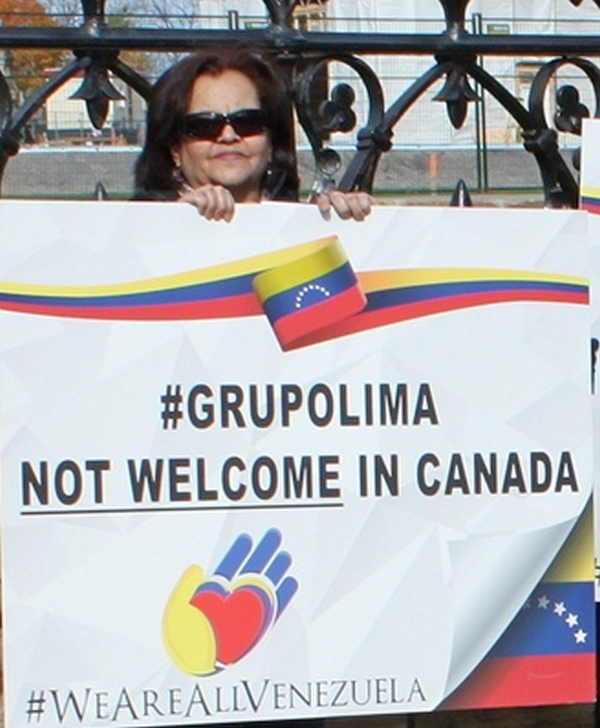 They tried to justify
these
latest attacks on the
constitutional order in Venezuela by claiming that the election
"failed to meet international standards of a democratic, free,
just and transparent process." This is just a repetition of the
same baseless accusation made in May 2018 by the U.S., Canada
and some others, who have been attacking Venezuela with illegal
economic sanctions in an effort to destabilize the economy and
who have inspired acts of hooliganism to inflict suffering on the
Venezuelan people and blame the Bolivarian government for crimes
the imperialists and their allies commit.
They tried to justify
these
latest attacks on the
constitutional order in Venezuela by claiming that the election
"failed to meet international standards of a democratic, free,
just and transparent process." This is just a repetition of the
same baseless accusation made in May 2018 by the U.S., Canada
and some others, who have been attacking Venezuela with illegal
economic sanctions in an effort to destabilize the economy and
who have inspired acts of hooliganism to inflict suffering on the
Venezuelan people and blame the Bolivarian government for crimes
the imperialists and their allies commit.
The Canadian Government, represented in Lima by Andrew Leslie, Parliamentary Secretary to Minister of Foreign Affairs Chrystia Freeland, has been instrumental right from the start in supporting this belligerent and destructive U.S. foreign policy. Canada has taken a leading role in the formation and functioning of the Lima Group, which was formed in August 2017. It was assembled by the U.S. to carry out its dirty work after it failed to get enough votes inside the Organization of American States (OAS) to isolate Venezuela and impose its will for regime change. The U.S. is not part of the group but Canada is shamelessly acting as a mouthpiece for the U.S. imperialist campaign to undermine peace and the democratic process in Venezuela.
Mexico was the only country of the 14-member group who refused to sign the declaration. In fact, Mexico called on the Lima Group to stop interfering in Venezuela's internal affairs.
The continued actions of the Canadian Government to attack the constitutional order and undermine the democratic process in Venezuela clearly shows that it does not act in the name of Canadians. We stand with the right of Venezuela to conduct its own affairs according to its own constitution without any foreign interference and demand that the Canadian government respect the democratic decision of the Venezuelan people.
Hands Off Venezuela!
(January 9, 2019)
Brazil
President Unleashes All-Sided Attack on Rights
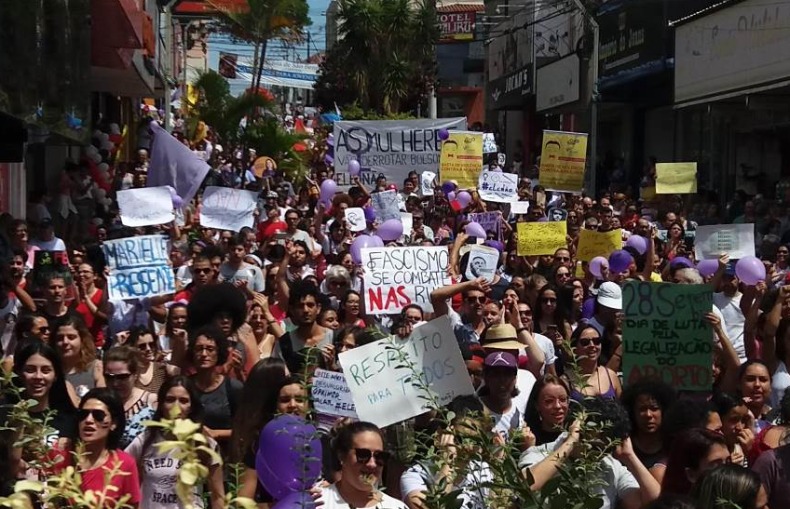
People in São Carlos protest the reactionary policies of
Jair
Bolsonaro during the presidential election campaign, September
29,
2018.
The new coup President of Brazil, Jair Bolsonaro, assumed office on January 1 in Brazil's capital, Brasília. This was an event in which some of the highest number of security forces were deployed since the 2016 Olympic Games and the 2014 World Cup, news agencies report. The inauguration brought together ultra-reactionary leaders, including Israeli Prime Minister Benjamin Netanyahu and Hungarian Premier Viktor Orban.
In Bolsonaro's address, he reaffirmed campaign promises such as his support for civilian gun possession, the agribusiness sector, and privatization of public companies. He stated that Brazil was now "liberated from socialism" and that he would rescue the family, restore Judeo-Christian values, and combat gender ideology.[1] Besides pledging "to boost investment," he also said he would stop "Marxist trash" from being taught in schools and universities.
No sooner had Bolsonaro assumed office, than he issued decrees and passed laws implementing these policies. "Just hours after his inauguration, Bolsonaro announced a series of decrees through the Provisional Measure n.870, as well as three other decrees that make changes to the institutional structure of the Brazilian republic. He eliminated seven ministries: Transportation, Ports and Civil Aviation, Industry, External Trade and Services, Sports, Cities, Culture, Work, and Public Safety," Peoples Dispatch informs.
"The measure also announced that the regulation and creation of new Indigenous reservations and quilombos [ancestral Afro-descendent territories] is now controlled by the agriculture ministry -- which is heavily influenced by the powerful agribusiness lobby. The demarcation of Indigenous land was carried out by the National Indian Foundation (Funai) for the last 30 years and the change puts Indigenous and Afro-descendent territories at great risk for greater exploitation and appropriation by national and transnational companies."
Bolsonaro revealed the plan on Twitter where he wrote: "More than 15 per cent of our national territory is demarcated for Indigenous groups and quilombolas. Less than 1 million people live in these isolated territories, which are, in fact, exploited and manipulated by NGOs. We will assimilate these citizens and value all Brazilians."
Bolsonaro also authorized the dismissal of some 300 civil servants on temporary contracts who were considered "leftists," news agencies report. In his inaugural speech, Bolsonaro said now that he has taken power, his country has been "liberated from socialism and political correctness."
The government "will clean house," Chief of Staff Onyx Lorenzoni told a news conference after the first Cabinet meeting. "It's the only way to govern with our ideas, our concepts and to carry out what Brazil's society decided, in its majority," Lorenzoni added. The ideological purge of contractors aimed "to do away with the Socialist and Communist ideas that during 30 years have led us to the chaos in which we live," Lorenzoni said.
"It doesn't make sense to have a government with a profile like ours to keep on people who support another way of thinking, another political system," Lorenzoni said, adding that some of those dismissed might be rehired if they passed an "evaluation" of their ideological leanings as well as "a competitive exam and they are protected from partisan politics by the constitution."
Peoples Dispatch reports that that the measures also stipulate that the Secretary of the Interior will "supervise, coordinate, monitor, and accompany the activities and actions of international organizations and non-governmental organizations in the national territory." Many national and international organizations have denounced this measure as it could pave the way for restrictions on freedoms of these organizations. This, plus Bolsonaro's statement on Twitter that NGOs are "manipulating" Indigenous and Afro-descendent communities, shows that there will likely be growing tension.
The report from Peoples Dispatch continues: "Minimum wage also fell 5.4 per cent which at R$998 is less than the amount passed by the Congress and by the previous Michel Temer government, which was R$1,006.
"Minister of Justice Sergio Moro, the judge who led the legal crusade against former president and current political prisoner Luiz Inácio Lula da Silva and effectively eliminated him as a presidential candidate, has acquired a super ministry under the new measure and his powers have multiplied. As the Ministry of Work was eliminated, Moro's ministry will be in charge of the legalization of trade unions. The Ministry of Public Safety was also incorporated into his super ministry, as well as the Council of Control of Financial Activities, a body which analyzes suspicious financial transactions.
"The expected attack on LGBTQ people in Brazil also came swiftly. The Ministry of Human Rights, Family and Women, which is led by Damares Alves, an Evangelical preacher, will no longer consider issues of the LGBTQ population and no other ministry has been given the task. In a video of Alves on January 3 she proclaimed 'Attention, attention! A new era begins. The boys dress in blue, the girls in pink.'
"This provisional measure is likely a sign of stronger measures that are yet to come. It is also an affirmation that, despite claiming to be an anti-system politician fighting for the people of Brazil, Bolsonaro represents the interests of the powerful sectors.
"Many organizations fear that the worst is yet to come. During his campaign, Bolsonaro stated that groups like the Landless Workers' Movement of Brazil (MST) and the Homeless Workers' Movement (MTST) should be classified as terrorist organizations. If this comes to pass, the implications will be dire. In this moment of attacks and fear, Brazilian organizations have bolstered their commitment to the struggle and will not back down."
João Pedro Stedile from the national board
of
the MST stated in an interview with Brasil
de
Fato: "All of the
activists of the MST are aware that we have to be careful, to not
expose ourselves to this hatred. But those who take on the
struggle
should not be afraid, because we are fighting for justice, so
that our
people improve their living conditions.... I think these threats
should
be a warning sign for us, while also instigating us to do more
grassroots and political education work." In this regard he said
the
People's Brazil Front plans to hold an assembly in late January
or
early February to better design its tactics. "What we do have to
do
right now is to encourage the broad sector of people's movements
and
organizations to join the front and organize people's committees
in all
cities to hold people's assemblies and discuss what to do in the
actual
fight for better living conditions."
In Brazil, the people are taking all necessary
measures
to protect themselves against the ultra reactionary assault. The
experience of the suffering and crimes during the military
dictatorship
which they overthrew in 1985 is still fresh in the minds of the
people
and serves them well at this time. In cities across Canada as
well, the
Brazilian diaspora is joined by Canadians from all walks of life
to
support the resistance struggle which is forming in Brazil.
Note
1. Gender ideology is a made-up term with no academic basis. It was used in a big way by the 'No' campaign in the October 2016 referendum on the original peace agreement reached between the government of Colombia and the Revolutionary Armed Forces of Colombia (FARC). The 'No' campaign, which had support from large sectors of the Evangelical church, big landowners, and extreme-right political parties, spread mass misinformation that the peace agreement sought to promote homosexuality, contained a "gender ideology," and would destroy children and families. The reality was that the agreements had an official recognition that the armed conflict disproportionately affected women and people from the LGBTQI community. This campaign of hatred, fear, and misinformation was largely successful in influencing a section of the people. The 'No' vote won the referendum. Today, reference to the “imposition of a gender ideology” is a discourse used by conservatives across Latin America to express their rejection of movements, programs, and policies that advance the rights of women and LGBTQI people, Peoples Dispatch reports.
(Peoples Dispatch, AFP, EFE)
Website: www.cpcml.ca Email: editor@cpcml.ca
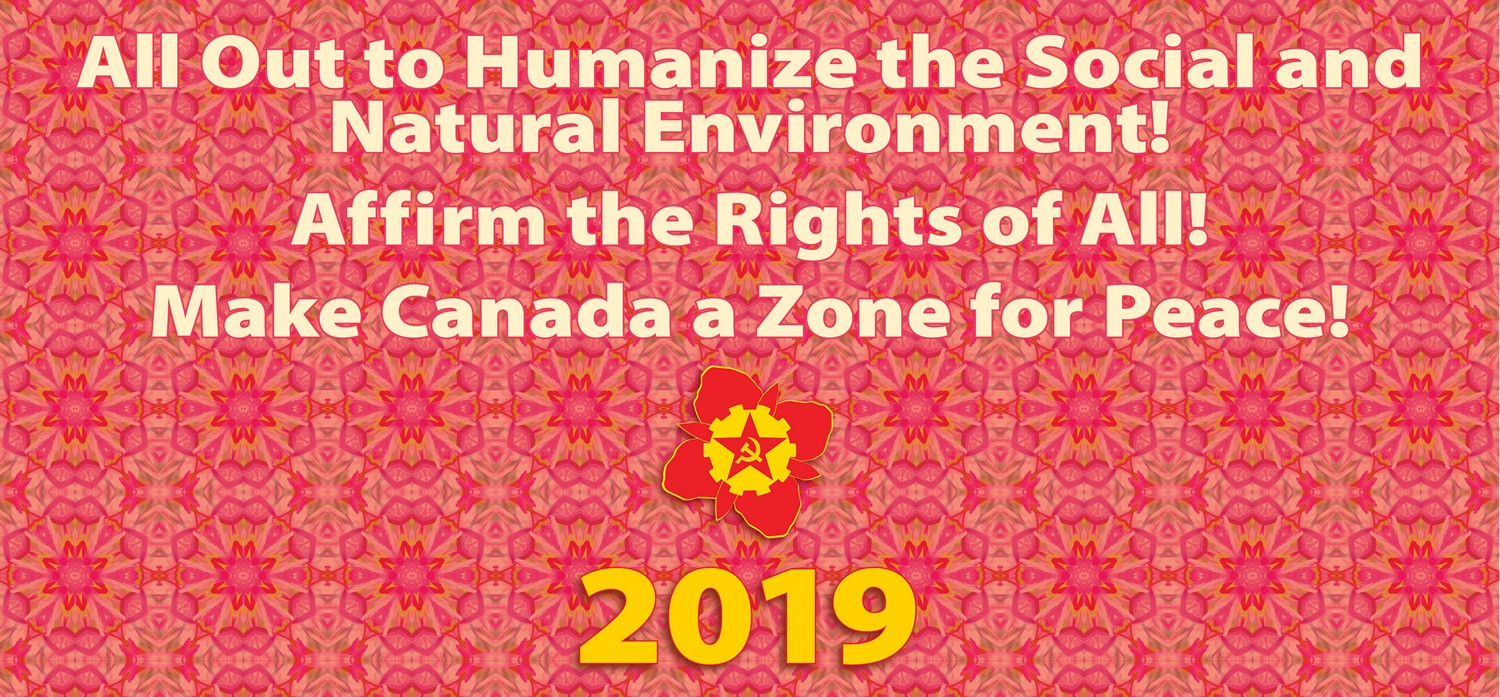
 In 2019, CPC(M-L) is
calling on everyone to take
up
politics of social responsibility and speak in their own name. On
our part, on the basis that accountability begins at home, the
Party is taking measures to further strengthen the work to
produce TML Weekly, Workers' Forum and various
other publications as well as paying specific attention to
crucial fronts of work. This includes first and foremost the work
for political renewal which will focus on defining the modern
democratic personality and politics of social responsibility. It
includes the work to make sure the working people are able to
speak in their own name and do not get silenced or criminalized
by the measures put in place to marginalize and dismiss their
concerns. The Party also joins efforts which contribute to
humanizing the social and natural environment as well as the
fight to affirm the hereditary rights of the Indigenous peoples
and end their dispossession and all other injustices against
them. We note in particular the workers' struggles being waged
nationally in every province and in Quebec against the escalation
of the anti-social offensive. We note that attempts to blame the
people for the problems they face and for racist and
anti-environment prejudices are being put to rest by the
struggles of the working people which lay the claims they must
for what belongs to them by right.
In 2019, CPC(M-L) is
calling on everyone to take
up
politics of social responsibility and speak in their own name. On
our part, on the basis that accountability begins at home, the
Party is taking measures to further strengthen the work to
produce TML Weekly, Workers' Forum and various
other publications as well as paying specific attention to
crucial fronts of work. This includes first and foremost the work
for political renewal which will focus on defining the modern
democratic personality and politics of social responsibility. It
includes the work to make sure the working people are able to
speak in their own name and do not get silenced or criminalized
by the measures put in place to marginalize and dismiss their
concerns. The Party also joins efforts which contribute to
humanizing the social and natural environment as well as the
fight to affirm the hereditary rights of the Indigenous peoples
and end their dispossession and all other injustices against
them. We note in particular the workers' struggles being waged
nationally in every province and in Quebec against the escalation
of the anti-social offensive. We note that attempts to blame the
people for the problems they face and for racist and
anti-environment prejudices are being put to rest by the
struggles of the working people which lay the claims they must
for what belongs to them by right.